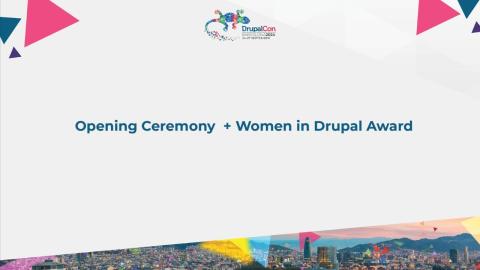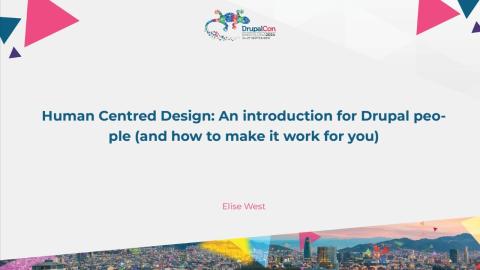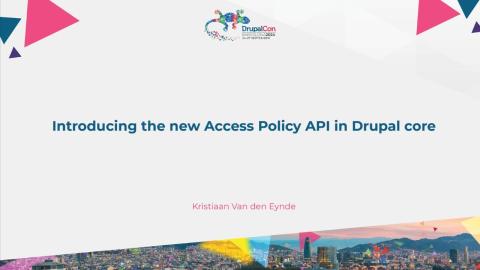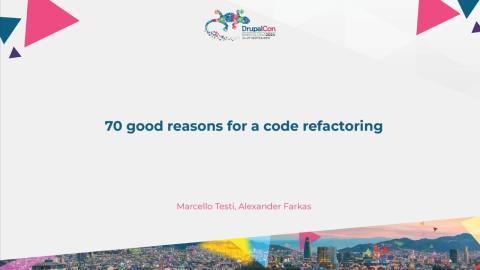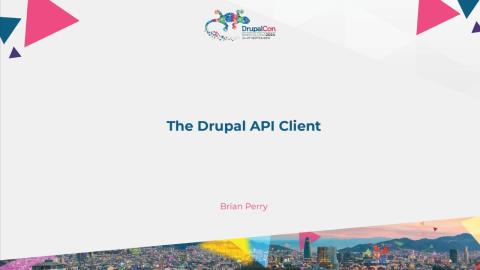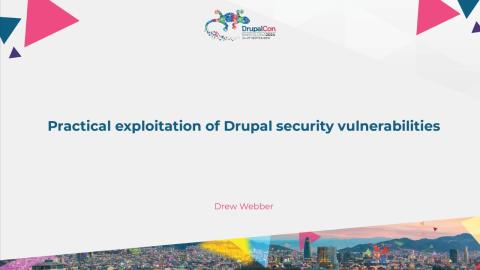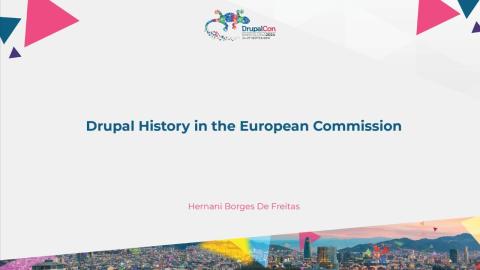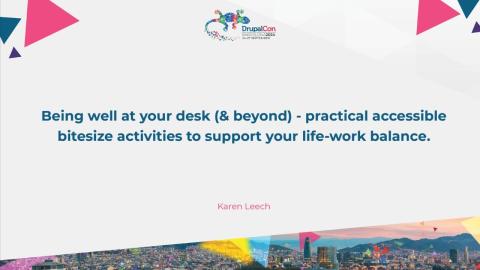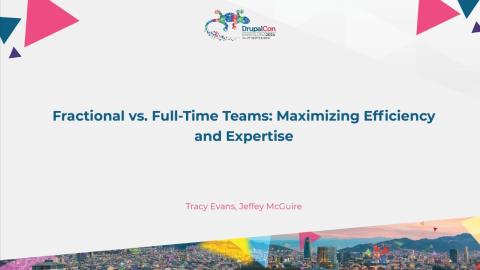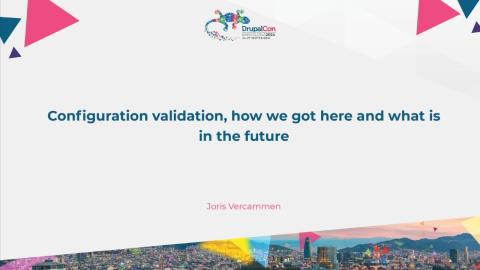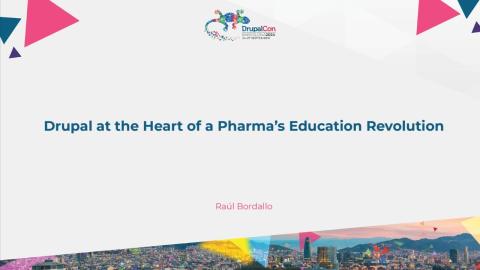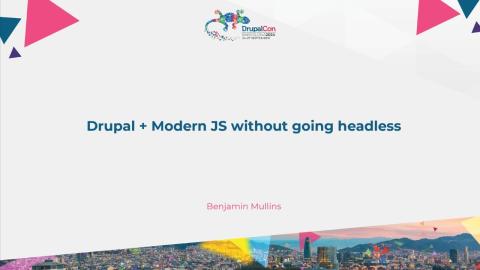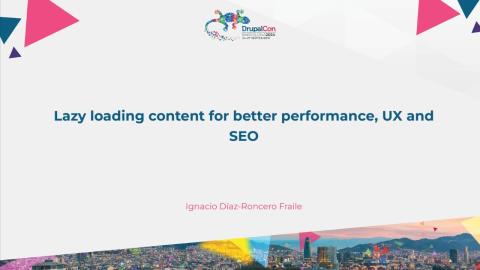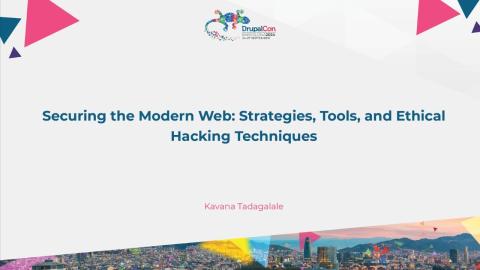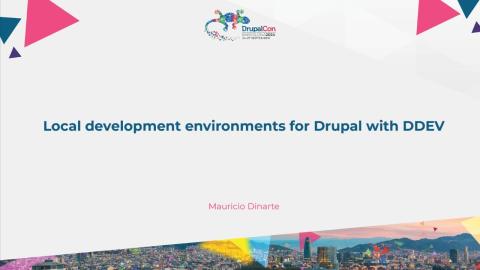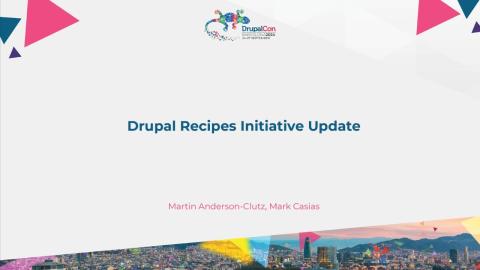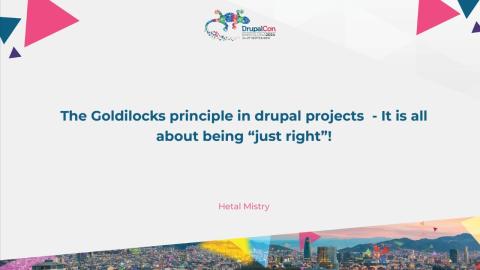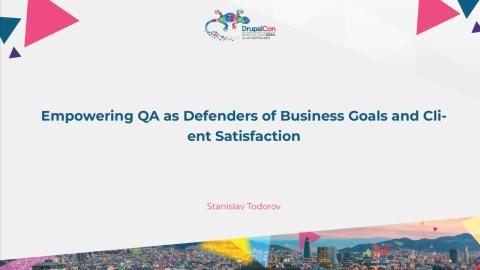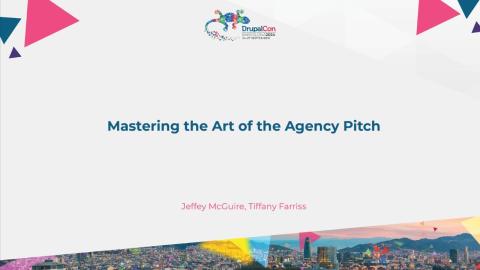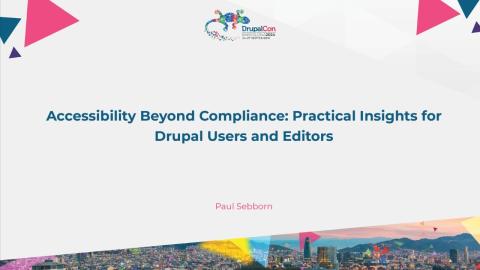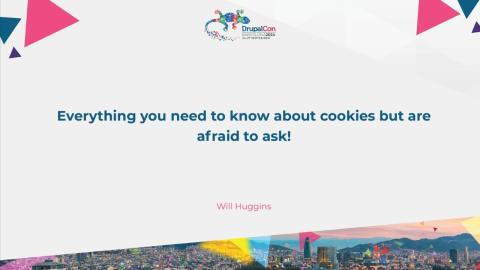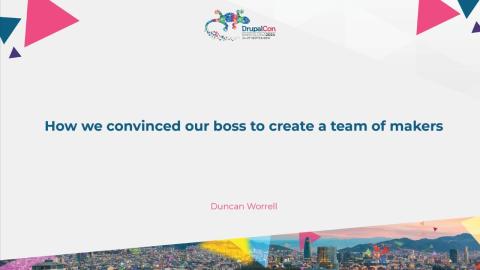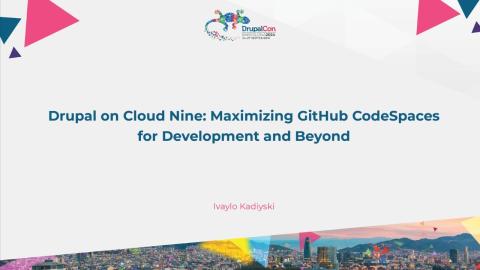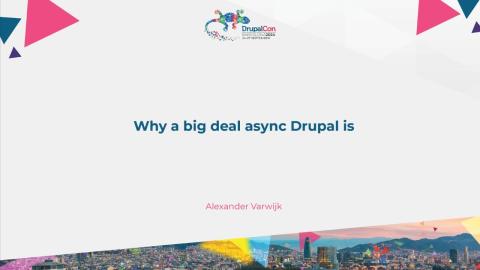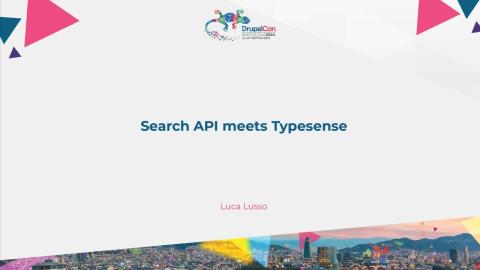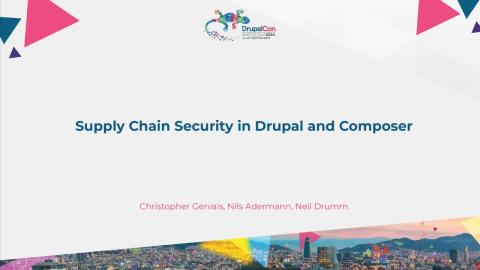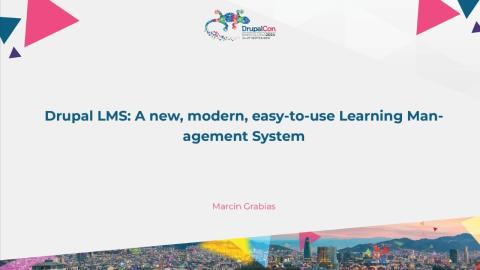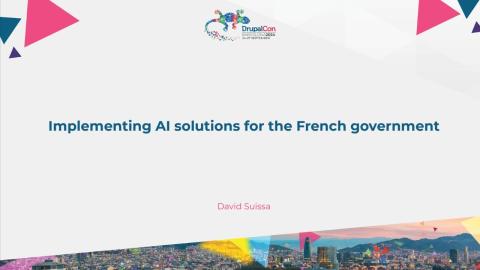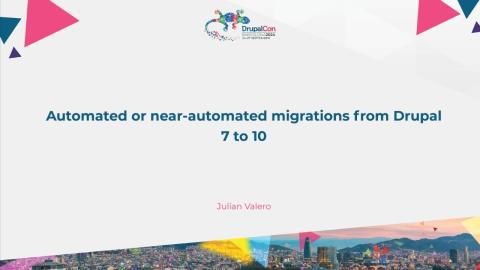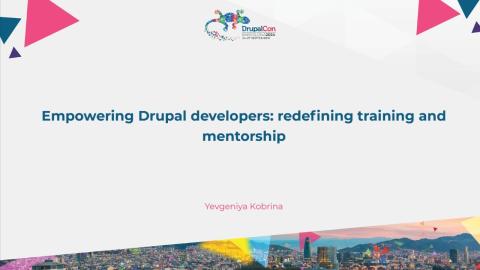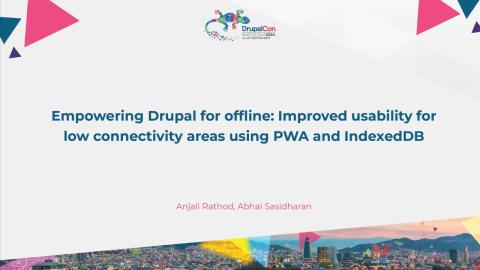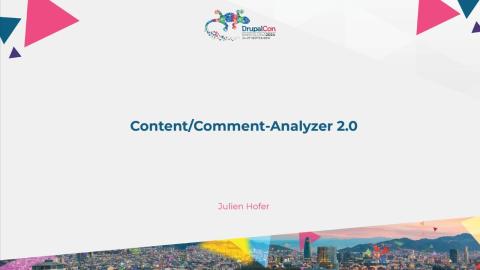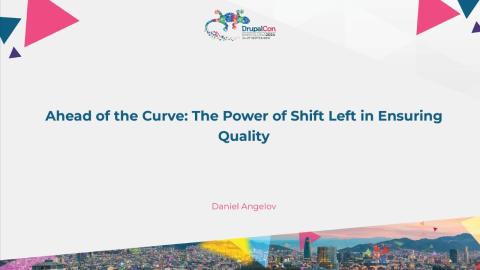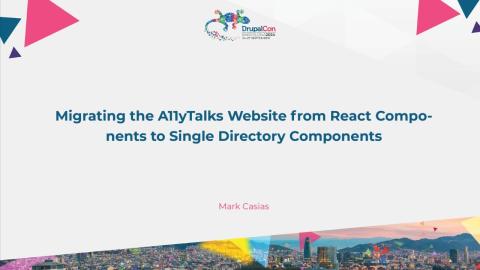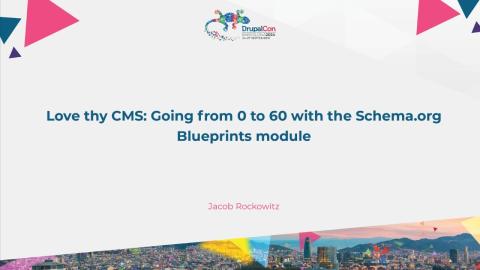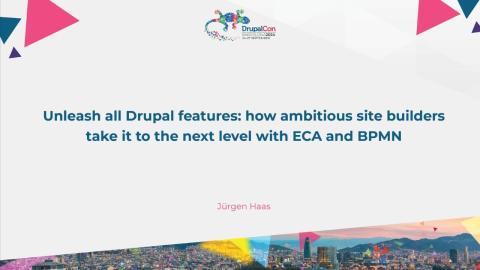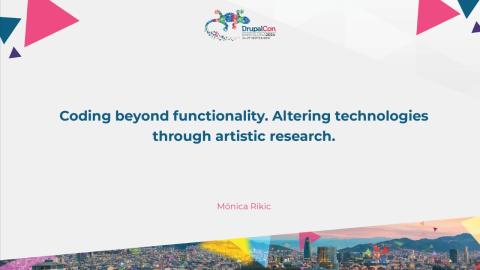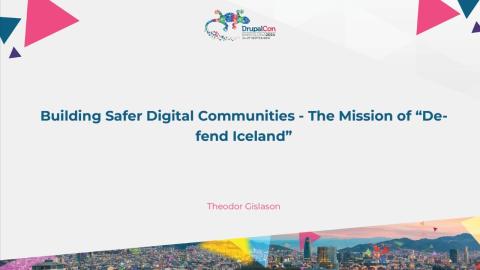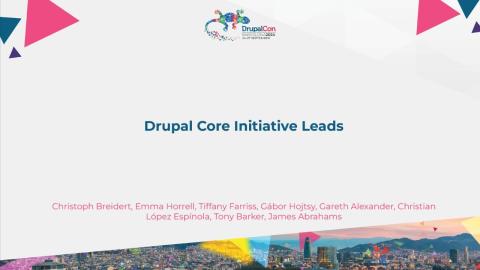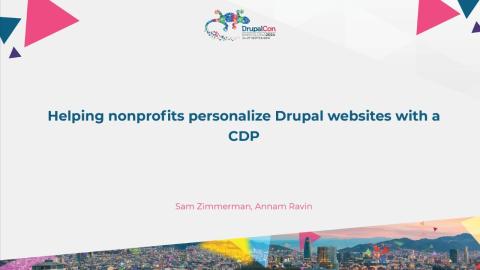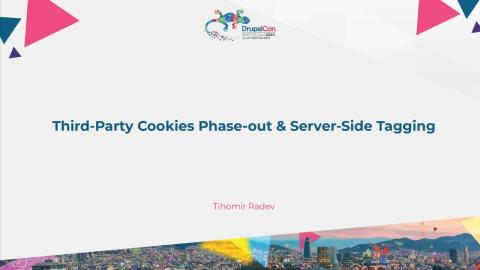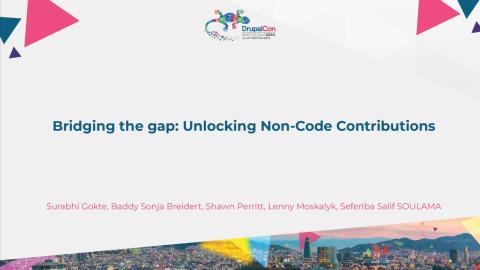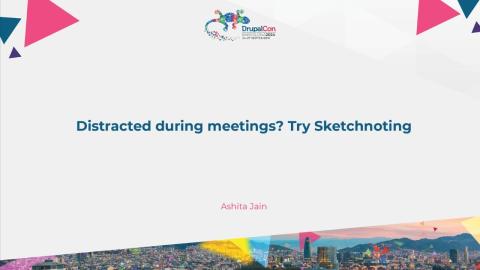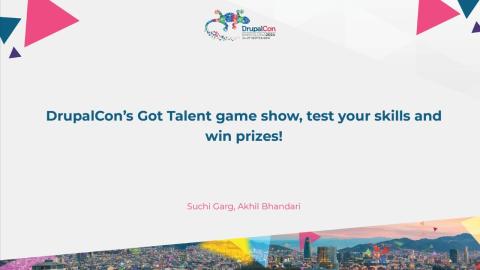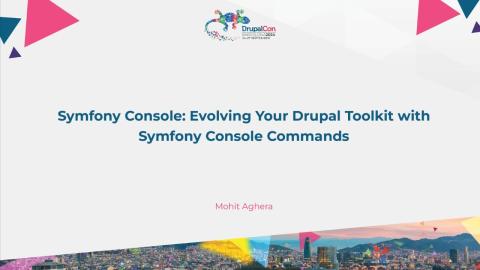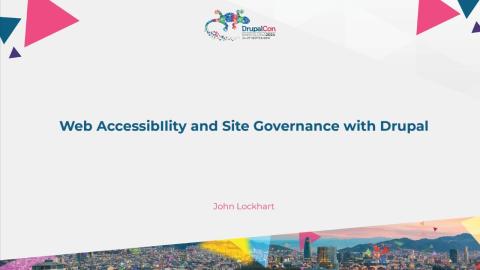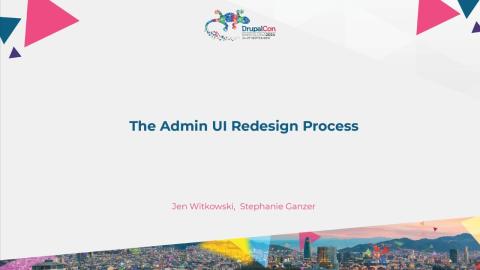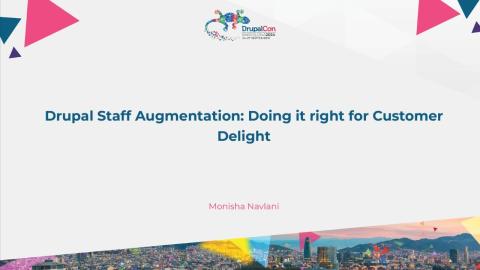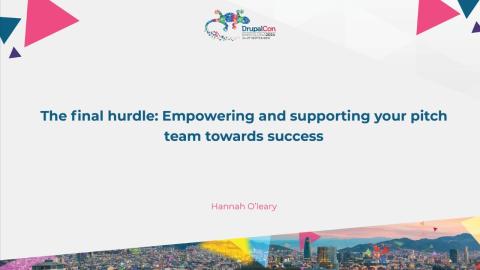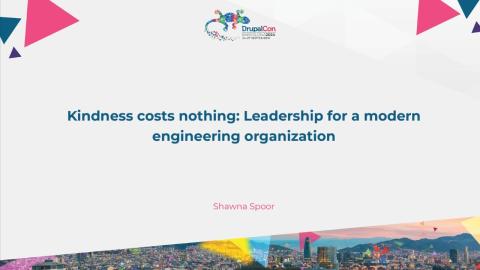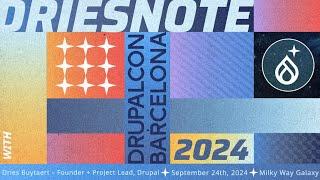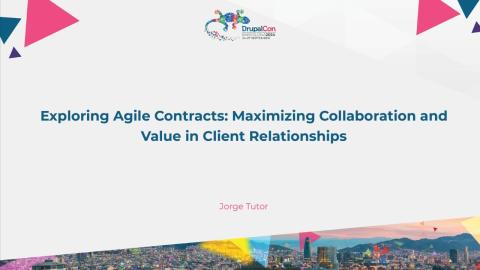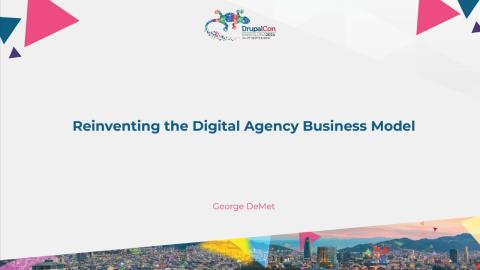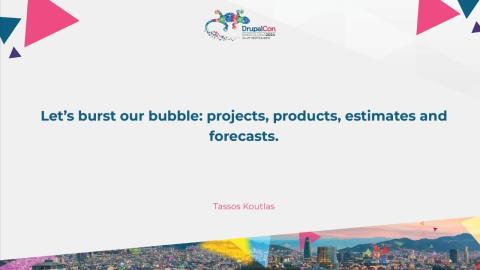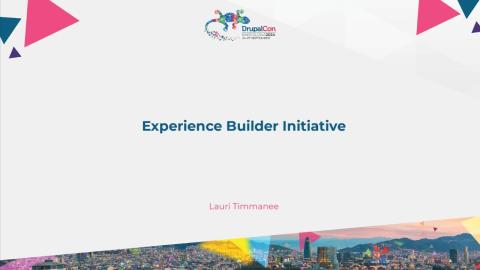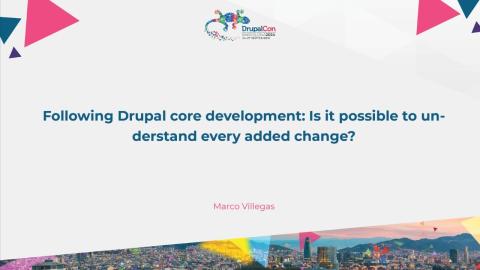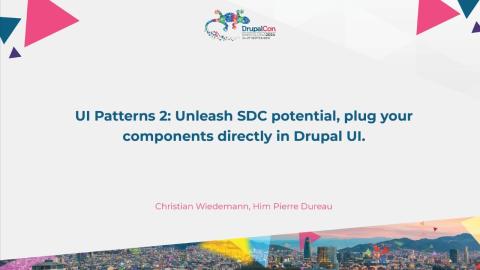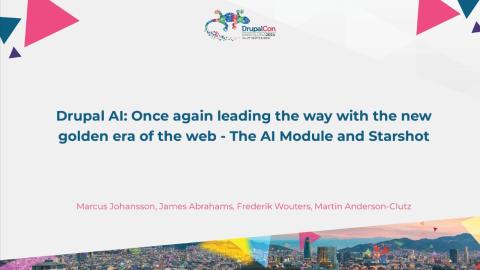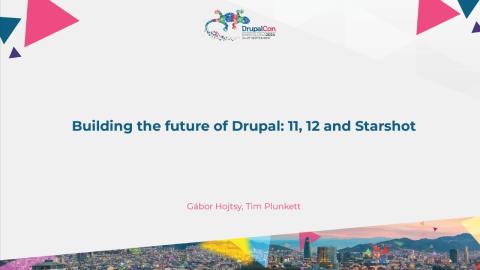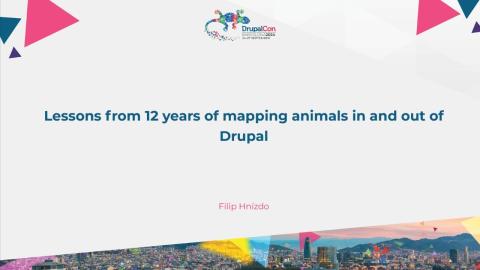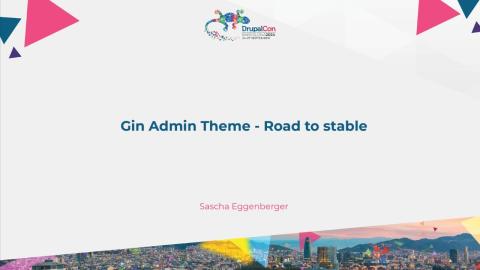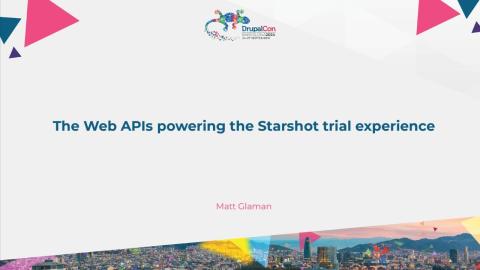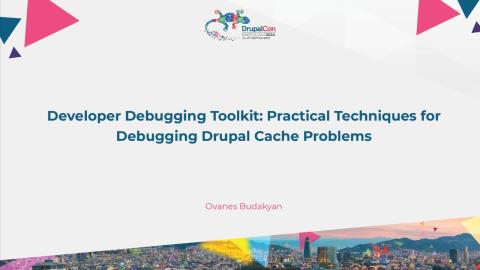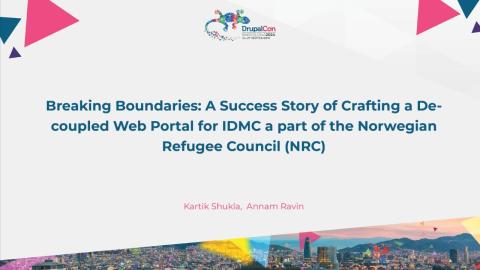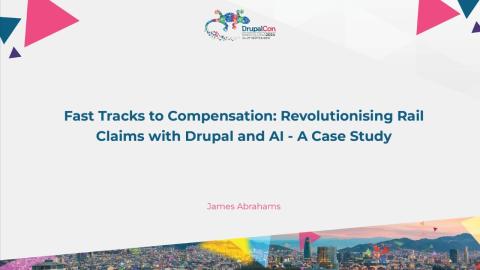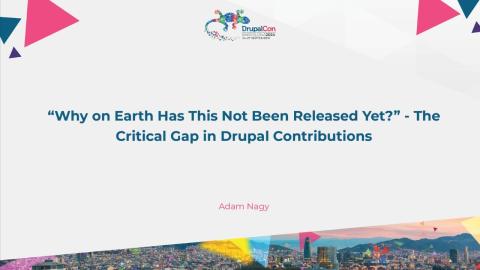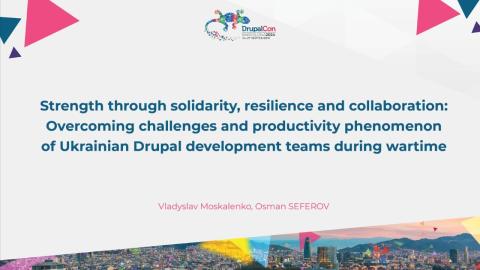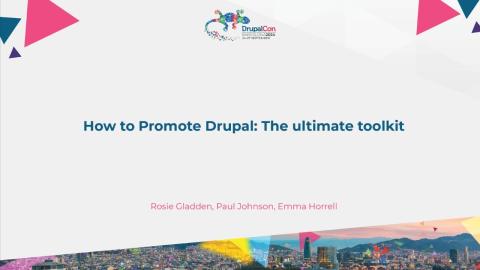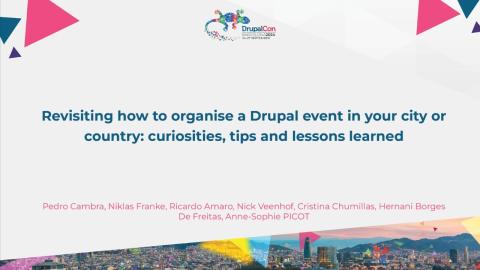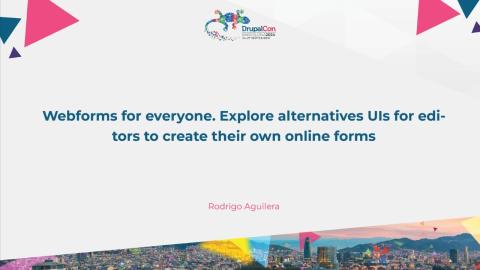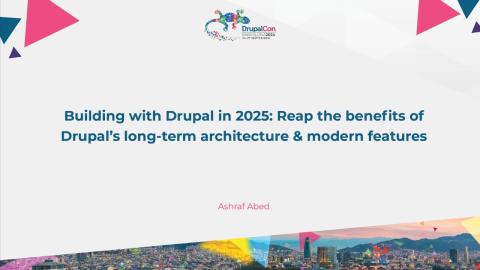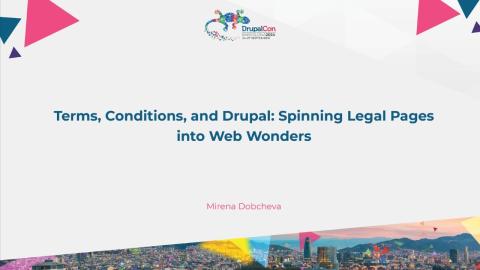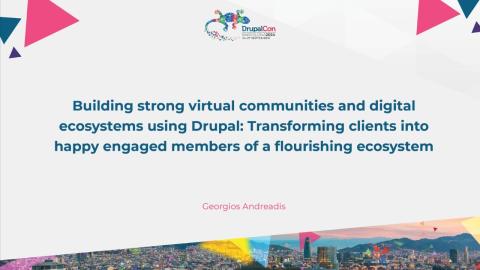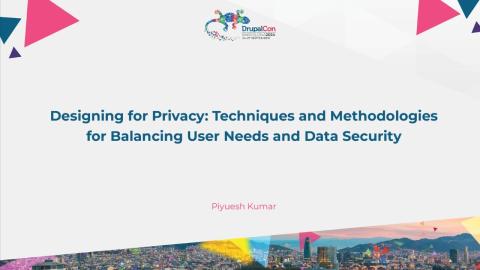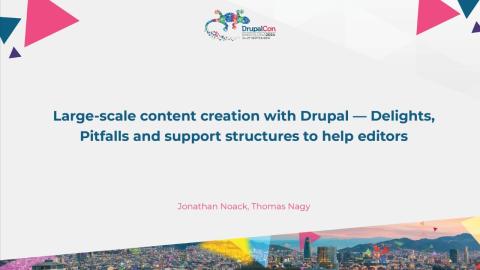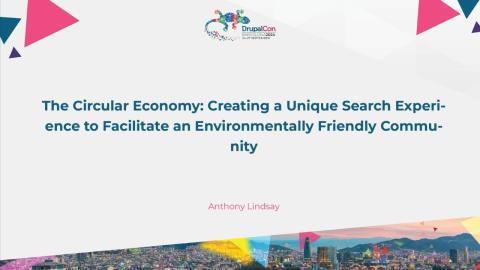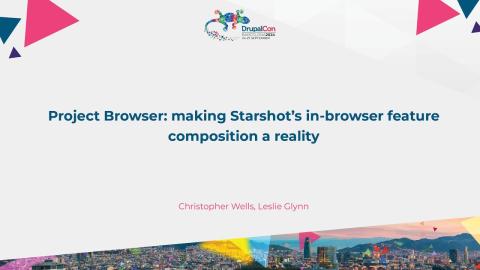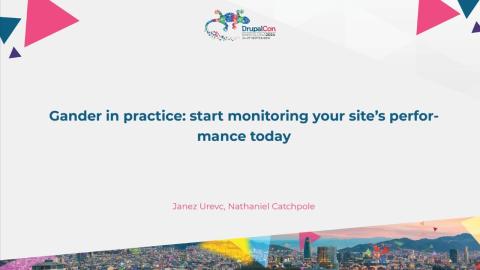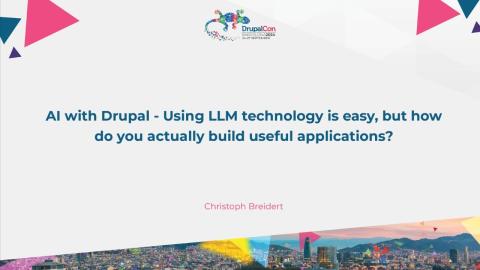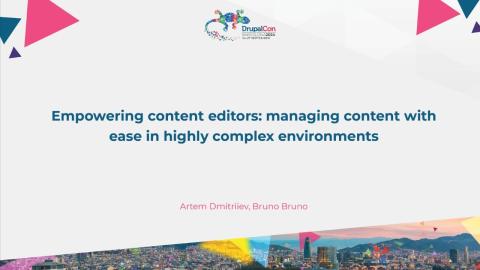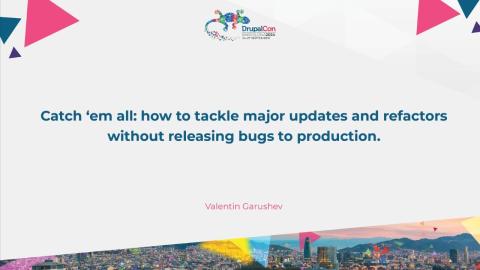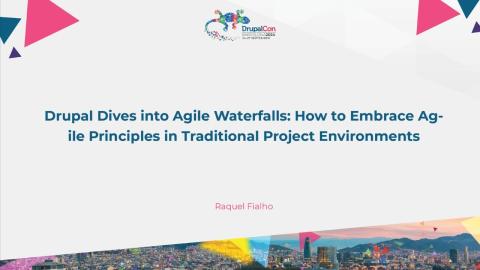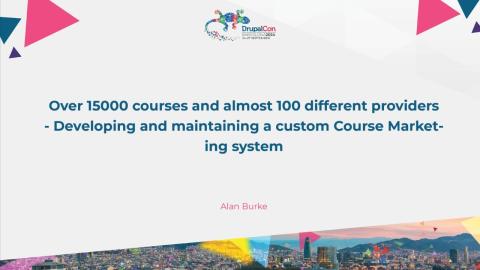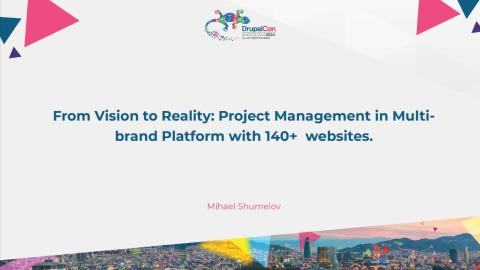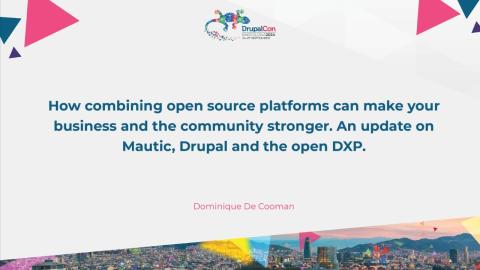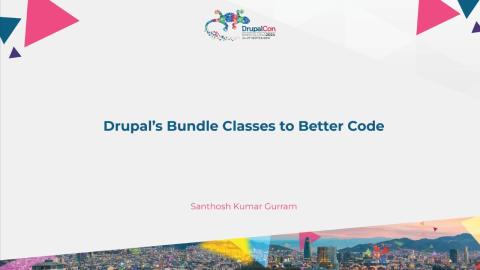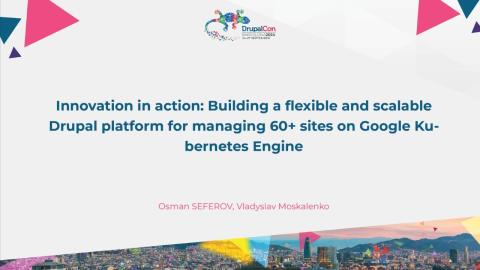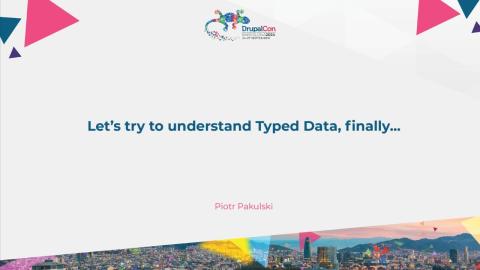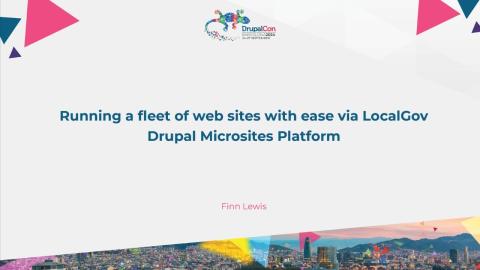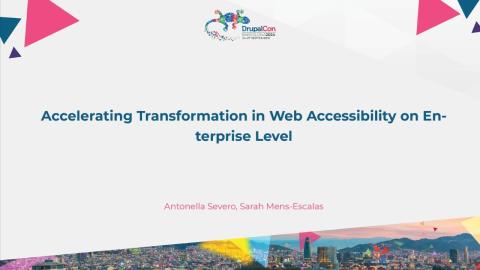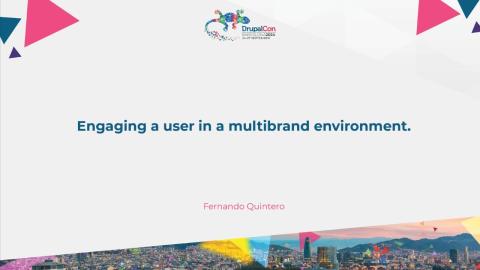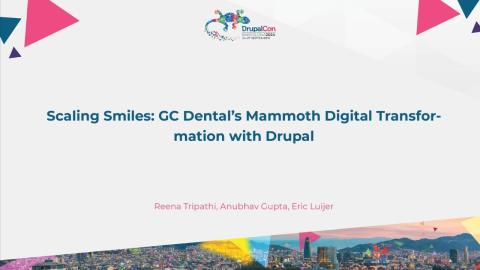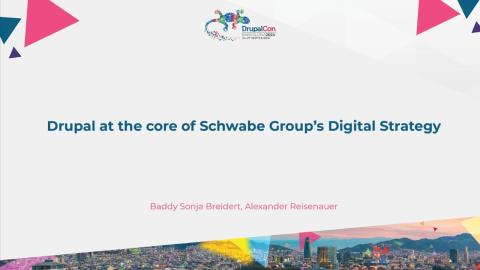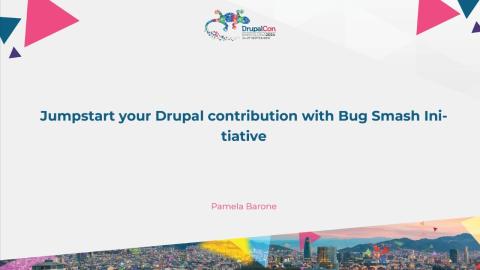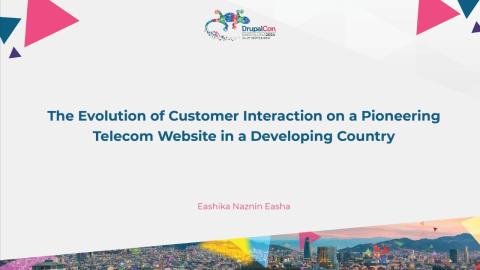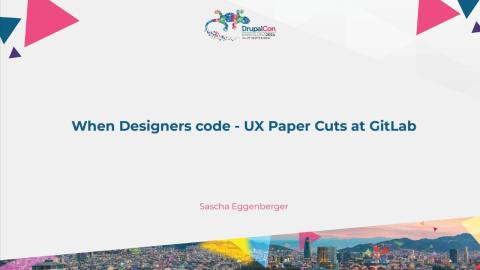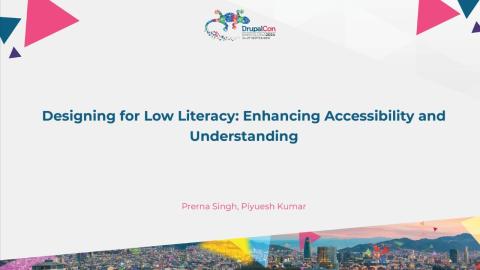Introduction
Videos from the conference.
Video Sponsor(s) / Provided by
Curated Videos
Description
Join the Opening Ceremony for an exciting start to DrupalCon Barcelona 2024. Right after the welcome coffee, the Organizing Secretariat, Advisory Board members, and Drupal Association staff are eager to welcome you to the vibrant city of Barcelona.
We'll kick things off with practical information and set the stage for the first keynote of the week - the Driesnote. Don't miss this chance to begin your DrupalCon experience on a high note and prepare for an incredible days ahead.
We'll kick things off with practical information and set the stage for the first keynote of the week - the Driesnote. Don't miss this chance to begin your DrupalCon experience on a high note and prepare for an incredible days ahead.
Description
Human Centred Design is becoming more widely used as a UX and product design discipline. Join this session to learn what it is and how it can help you.
Prerequisite
This is a non-technical session. It is ideal for people working client-side on any digital projects, as well as heads of digital or IT, project and programme managers, technical leads, heads of engineering, product managers, and heads of product - as well as anyone interested in UX.
Outline
You’re familiar with the concept of UX, or User Experience Design, but what do you know about Human Centred Design?
Human-centered design is a problem-solving technique that puts real people at the centre of the development process. It is also growing in popularity amongst many clients, and works very well for Drupal projects - which is why you need to know about it.
We’ve recently seen HCD being requested or mentioned by large scale NGO, government, and public sector clients in particular, as well as some larger commercial organisations.
People (users) should always be the focus of any technology project, and it can be hard to define exactly what they need and how the product you’re creating can best answer that need. However, HCD can help create the best results for your clients and their users.
We have also found that when our designers and developers are working with user stories defined using HCD, it is easier for them to fulfill their roles and give the best results for users more efficiently.
What you’ll learn in this session:
- Beyond the buzzwords - What Human Centred Design means in practice
- Where HCD fits within UX and the wider product-development cycle
- How to use HCD outputs to make Drupal projects better for everyone
- Where HCD works best, and which types of projects can benefit from it (and which ones may not!)
- When and how to involve an HCD specialist
- What having an HCD specialist on your project team means, and what they need to deliver on their role
- How to talk to your clients about HCD and help them understand it’s value
Who this session is for:
- Drupal clients - especially those who are heavy Drupal users
- Heads of IT/Digital
- Project and programme managers
- Technical Leads/Heads of engineering
- Product Managers
- Heads of Product
- Senior Drupal developers
- In-house developers and designers for Drupal client organisations
If you are interested in improving your projects, learning about UX, or even just keeping up with the latest industry trends, then you’ll find this session extremely useful.
Learning Objectives
What you’ll learn in this session:
- Beyond the buzzwords - What Human Centred Design means in practice
- Where HCD fits within UX and the wider product-development cycle
- How to use HCD outputs to make Drupal projects better for everyone
- Where HCD works best, and which types of projects can benefit from it (and which ones may not!)
- When and how to involve an HCD specialist
- What having an HCD specialist on your project team means, and what they need to deliver on their role
- How to talk to your clients about HCD and help them understand it’s value
Experience level
Beginner
Prerequisite
This is a non-technical session. It is ideal for people working client-side on any digital projects, as well as heads of digital or IT, project and programme managers, technical leads, heads of engineering, product managers, and heads of product - as well as anyone interested in UX.
Outline
You’re familiar with the concept of UX, or User Experience Design, but what do you know about Human Centred Design?
Human-centered design is a problem-solving technique that puts real people at the centre of the development process. It is also growing in popularity amongst many clients, and works very well for Drupal projects - which is why you need to know about it.
We’ve recently seen HCD being requested or mentioned by large scale NGO, government, and public sector clients in particular, as well as some larger commercial organisations.
People (users) should always be the focus of any technology project, and it can be hard to define exactly what they need and how the product you’re creating can best answer that need. However, HCD can help create the best results for your clients and their users.
We have also found that when our designers and developers are working with user stories defined using HCD, it is easier for them to fulfill their roles and give the best results for users more efficiently.
What you’ll learn in this session:
- Beyond the buzzwords - What Human Centred Design means in practice
- Where HCD fits within UX and the wider product-development cycle
- How to use HCD outputs to make Drupal projects better for everyone
- Where HCD works best, and which types of projects can benefit from it (and which ones may not!)
- When and how to involve an HCD specialist
- What having an HCD specialist on your project team means, and what they need to deliver on their role
- How to talk to your clients about HCD and help them understand it’s value
Who this session is for:
- Drupal clients - especially those who are heavy Drupal users
- Heads of IT/Digital
- Project and programme managers
- Technical Leads/Heads of engineering
- Product Managers
- Heads of Product
- Senior Drupal developers
- In-house developers and designers for Drupal client organisations
If you are interested in improving your projects, learning about UX, or even just keeping up with the latest industry trends, then you’ll find this session extremely useful.
Learning Objectives
What you’ll learn in this session:
- Beyond the buzzwords - What Human Centred Design means in practice
- Where HCD fits within UX and the wider product-development cycle
- How to use HCD outputs to make Drupal projects better for everyone
- Where HCD works best, and which types of projects can benefit from it (and which ones may not!)
- When and how to involve an HCD specialist
- What having an HCD specialist on your project team means, and what they need to deliver on their role
- How to talk to your clients about HCD and help them understand it’s value
Experience level
Beginner
Description
Want to make sure your employees do not work outside of office hours? Want to get rid of UID 1's all-access pass? Well now you can, thanks to the brand-new Access Policy API!
Prerequisite
Attendees should have a basic understanding of how access works in Drupal core, with an emphasis on permission checks and perhaps entity access.
Outline
At DrupalCon Pittsburgh 2023 a contest was held where people could submit ideas to improve Drupal and get funded for it. One of the winning entries was revamping the access layer in core.
The idea was to move away from our current Role and Attribute Based Access Control (RBAC and ABAC) layer to a more powerful Policy Based Access Control (PBAC) layer.
This means that you can now hand out permissions based on any information coming from the global state: The time of day, your location, a flag on your account, even what type of sauce you want on your french fries.
Learning Objectives
The goal of this session is to inform the audience about what the new API looks like, how it's implemented in core and how they can start writing access policies of their own.
Key concepts such as the access policy processor, the permission checker and the calculated permissions value object will all be covered in detail, while other supporting parts such as VariationCache (new in Drupal 10.2) will be covered more briefly.
Experience level
Advanced
Prerequisite
Attendees should have a basic understanding of how access works in Drupal core, with an emphasis on permission checks and perhaps entity access.
Outline
At DrupalCon Pittsburgh 2023 a contest was held where people could submit ideas to improve Drupal and get funded for it. One of the winning entries was revamping the access layer in core.
The idea was to move away from our current Role and Attribute Based Access Control (RBAC and ABAC) layer to a more powerful Policy Based Access Control (PBAC) layer.
This means that you can now hand out permissions based on any information coming from the global state: The time of day, your location, a flag on your account, even what type of sauce you want on your french fries.
Learning Objectives
The goal of this session is to inform the audience about what the new API looks like, how it's implemented in core and how they can start writing access policies of their own.
Key concepts such as the access policy processor, the permission checker and the calculated permissions value object will all be covered in detail, while other supporting parts such as VariationCache (new in Drupal 10.2) will be covered more briefly.
Experience level
Advanced
Description
Discover how we upgraded 70 websites (50 countries + 20 local careers sites) to new branding, built a robust content delivery system, and followed country-specific requirements in a highly regulated environment.
Prerequisite
Technical knowledge of Drupal is not required to follow the presentation. Having a general understanding of content management workflows will help understanding the challenges and solutions presented.
Outline
Drupal stands out as the go-to content management solution for Boehringer Ingelheim's corporate and customer-oriented communication.
The session will explain the challenges of the corporate website landscape, will introduce the current rebranding initiative, and will present an overview of the concepts used to define the navigation and content of the complex communication system, originally made of 70 parallel instances individually maintained, developed and technically supported.
Provided this background, the technical features of the refactoring project that reduced the number of instances to just one will be presented, providing figures about the execution, and an overview of the past and current architecture. We will also address the challenges faced during the project, and how we dealt with them.
Key topics: Website navigation, Content workflows, Editorial governance, Roles and permissions, Content translation, Migrations, Architecture, Design systems
Learning Objectives
We show a classic digital use case of an international company with over 53,000 employees and a net sales of 24.1 billion euros. As many large companies are currently converting their processes towards centralization, this is certainly relevant for many developers and site builders who are facing similar challenges.
Experience level
Begin
Prerequisite
Technical knowledge of Drupal is not required to follow the presentation. Having a general understanding of content management workflows will help understanding the challenges and solutions presented.
Outline
Drupal stands out as the go-to content management solution for Boehringer Ingelheim's corporate and customer-oriented communication.
The session will explain the challenges of the corporate website landscape, will introduce the current rebranding initiative, and will present an overview of the concepts used to define the navigation and content of the complex communication system, originally made of 70 parallel instances individually maintained, developed and technically supported.
Provided this background, the technical features of the refactoring project that reduced the number of instances to just one will be presented, providing figures about the execution, and an overview of the past and current architecture. We will also address the challenges faced during the project, and how we dealt with them.
Key topics: Website navigation, Content workflows, Editorial governance, Roles and permissions, Content translation, Migrations, Architecture, Design systems
Learning Objectives
We show a classic digital use case of an international company with over 53,000 employees and a net sales of 24.1 billion euros. As many large companies are currently converting their processes towards centralization, this is certainly relevant for many developers and site builders who are facing similar challenges.
Experience level
Begin
Description
The Drupal API Client project has made substantial progress since being selected for funding as part of the Pitch-burgh Innovation Contest. We're excited to share information about the 1.x release of our JSON:API Client, and what the future holds for this initiative.
has recently completed their As a result of funding from the 'Pitch-burgh' Innovation Contest, the Drupal API Client has recently published a 1.0 release of
Prerequisite
While not required, attendees with some existing experience with modern JavaScript and Decoupled Drupal will be able to get the most out of this session.
Outline
Funded as part of the Pitch-burg Innovation Contest, The Drupal API Client project offers a set of JavaScript packages that simplify the process of interacting with common Drupal APIs. We've made substantial progress since initially proposing this project at DrupalCon Pittsburgh, and we're excited to update the community on what we've accomplished. We'll discuss:
* A recap of why we believe that this is an important problem to solve for the Drupal community.
* The scope of our commitment as a result of Pitch-burgh funding.
* Our releases thus far:
** The JSON:API Client 'Vertical Slice' POC
** The JSON:API Client 1.0 release
* Real world examples of using the JSON:API Client with the JavaScript framework of your choice.
* An update on our goal of publishing this package under the Drupal namespace on NPM.
* Details on how you can contribute and provide feedback at DrupalCon.
* Focus areas for the future of this initiative.
Learning Objectives
Attendees of this session will learn:
* Why we believe this initiative is important for the future of Drupal.
* How to use the JSON:API client in a variety of decoupled JavaScript projects.
* How to use the JSON:API client within an existing Drupal site.
* Lessons from managing a JavaScript focused project on Drupal.org.
* Details on how to contribute and provide feedback.
* Focus areas for the future of this initiative.
Experience level
Intermediate
has recently completed their As a result of funding from the 'Pitch-burgh' Innovation Contest, the Drupal API Client has recently published a 1.0 release of
Prerequisite
While not required, attendees with some existing experience with modern JavaScript and Decoupled Drupal will be able to get the most out of this session.
Outline
Funded as part of the Pitch-burg Innovation Contest, The Drupal API Client project offers a set of JavaScript packages that simplify the process of interacting with common Drupal APIs. We've made substantial progress since initially proposing this project at DrupalCon Pittsburgh, and we're excited to update the community on what we've accomplished. We'll discuss:
* A recap of why we believe that this is an important problem to solve for the Drupal community.
* The scope of our commitment as a result of Pitch-burgh funding.
* Our releases thus far:
** The JSON:API Client 'Vertical Slice' POC
** The JSON:API Client 1.0 release
* Real world examples of using the JSON:API Client with the JavaScript framework of your choice.
* An update on our goal of publishing this package under the Drupal namespace on NPM.
* Details on how you can contribute and provide feedback at DrupalCon.
* Focus areas for the future of this initiative.
Learning Objectives
Attendees of this session will learn:
* Why we believe this initiative is important for the future of Drupal.
* How to use the JSON:API client in a variety of decoupled JavaScript projects.
* How to use the JSON:API client within an existing Drupal site.
* Lessons from managing a JavaScript focused project on Drupal.org.
* Details on how to contribute and provide feedback.
* Focus areas for the future of this initiative.
Experience level
Intermediate
Description
What would it look like if your site got hacked? What would the bad actors actually do, and why? How can you avoid this?
Prerequisite
No prerequisites.
Outline
The Drupal Security Team work with the wider Community to address a diverse range of vulnerabilities in Drupal core and contrib projects; from Cross Site Scripting (XSS), Remote Code Execution (RCE), Server Side Request Forgery (SSRF), SQL Injection (SQLi), and Unsafe Deserialisation.. among others.
In this session we'll look at practical examples of different types of vulnerabilities, and examine what it would look like if they were exploited by bad actors.
Learning Objectives
The aim is to provide a deeper understanding of why it's important to address these problems, going beyond the well-known "alert" XSS pop up.
We'll also cover approaches for detection, mitigation, and prevention as these apply to web application vulnerabilities.
Experience level
Beginner
Prerequisite
No prerequisites.
Outline
The Drupal Security Team work with the wider Community to address a diverse range of vulnerabilities in Drupal core and contrib projects; from Cross Site Scripting (XSS), Remote Code Execution (RCE), Server Side Request Forgery (SSRF), SQL Injection (SQLi), and Unsafe Deserialisation.. among others.
In this session we'll look at practical examples of different types of vulnerabilities, and examine what it would look like if they were exploited by bad actors.
Learning Objectives
The aim is to provide a deeper understanding of why it's important to address these problems, going beyond the well-known "alert" XSS pop up.
We'll also cover approaches for detection, mitigation, and prevention as these apply to web application vulnerabilities.
Experience level
Beginner
Description
Drupal has a long history of usage in the European Commission ( over 10y at large scale) powering hundreds of websites from high profile communication websites to community websites where European citizens interact.
This session describes how Drupal evolved in the Commission over the years along different versions and approaches.
Prerequisite
No prerequisite.
Outline
Drupal has a long history of usage in the European Commission (over 10y at large scale) powering hundreds of websites from high profile communication websites to community websites where European citizens interact.
This session describes how Drupal evolved in the Commission over the years along different versions and approaches.
Drupal paved its way from the initial simpler websites, to the expansion of the Drupal 7 multisite network (covering over 200 websites) towards a component based approach in Drupal 8, 9 and 10 and a distributed and extensible product that makes it easier to support most of its web presence.
The European Commission was able to leverage and evolve Drupal to suit its needs in different projects, creating workflows, standards and guidelines that orient different Drupal internal projects and teams fostering collaboration amongst them.
Apart from the technical aspects we look also to people and how the commission organized its development, support and operation teams, and how it collaborated within the community to maximize the value it gets and gives to Drupal as an open source product and an open source community.
Learning Objectives
Understand how Drupal is used at large scale within a high profile client. Analyse how Drupal's evolution over the last 10 years made it the standard web publishing platform for most communication websites. Learn about how it is shaped and reused for dozens of projects within a diverse set of development teams.
Experience level
Beginner
This session describes how Drupal evolved in the Commission over the years along different versions and approaches.
Prerequisite
No prerequisite.
Outline
Drupal has a long history of usage in the European Commission (over 10y at large scale) powering hundreds of websites from high profile communication websites to community websites where European citizens interact.
This session describes how Drupal evolved in the Commission over the years along different versions and approaches.
Drupal paved its way from the initial simpler websites, to the expansion of the Drupal 7 multisite network (covering over 200 websites) towards a component based approach in Drupal 8, 9 and 10 and a distributed and extensible product that makes it easier to support most of its web presence.
The European Commission was able to leverage and evolve Drupal to suit its needs in different projects, creating workflows, standards and guidelines that orient different Drupal internal projects and teams fostering collaboration amongst them.
Apart from the technical aspects we look also to people and how the commission organized its development, support and operation teams, and how it collaborated within the community to maximize the value it gets and gives to Drupal as an open source product and an open source community.
Learning Objectives
Understand how Drupal is used at large scale within a high profile client. Analyse how Drupal's evolution over the last 10 years made it the standard web publishing platform for most communication websites. Learn about how it is shaped and reused for dozens of projects within a diverse set of development teams.
Experience level
Beginner
Description
We all know movement, exercise and screen breaks are recommended, do we do them? Probably not as much as we should!
I’m sharing activities that can fit in your schedule at or near your desk!
This is an interactive workshop offering practical modifiable takeaways.
Prerequisite
No equipment is required, except you and your chair. And ideally a bottle of water - hydration is fundamental to wellbeing.
I will demonstrate entry level bitesize activities, and offer modifications for anyone needing them. I’ll have a colleague following along and demonstrating these modifications.
We won't be working up a sweat - your normal clothes are fine, however; do keep in mind if you're wearing restrictive clothing that it could hinder your movement.
I invite you to participate by following along as this will maximise your understanding of how each movement will help and support you. I hope you will finish the session feeling refreshed.
Your participation is encouraged - however this is not compulsory.
If at any time you feel pain, discomfort or you have a known health issue which could be exacerbated by the movements demonstrated and or you feel unwell please advocate for yourself and stop.
Outline
In this 45 minute session there will be six bitesize movements which will be explained and demonstrated.
Each set of movements is about 5 minutes and is delivered within an easy to remember framework to enable each set to be done independently at your desk and beyond.
There is an assumption that you will be seated, however all exercises can be done in whatever position is available to you. As mentioned, modifications will be offered to support you to work safely and therefore effectively; you are also welcome to not partake in a set if it doesn't feel right for you.
Alongside the demonstrations and explanations, I will be using slides as visual prompts - with anatomical diagrams, specifying key words to support your understanding; these slides will be available prior to the session.
I will close the session with tips to support you and your team to maintain a healthy life-work balance. These are reminders to myself as much as for you.
If time allows I can do Q&A at the end of the session, if you wish to speak to me after, do come find me.
My relevant experience:
- Qualified teacher PGCE (10+ active years in education. using this experience to support my roles in the web industry)
- Web industry (14 + years, 10 of those years remotely)
- Shiatsu Practitioner this includes attainment of qualifications in Acupressure, Anatomy, Physiology, & Pathology., (8 + years, fully insured - professional indemnity and liability)
- Yoga Teacher Training qualification in progress - all movements have been ratified by my teacher (with 40+ years experience in the field)
- My own experiences with chronic health conditions, burnouts, including my own Neuro Diversity, gives me the drive to aim to be inclusive and to shine a light on how we can support our own wellbeing - whilst highlighting that a culture shift needs to happen to enable teams to feel supported in advocating for themselves.
Learning Objectives
To provide a toolkit of simple movements which can be done throughout the day to encourage and support a healthy life-work balance.
To provide team leaders with resources and an understanding of how to support the wellbeing of their colleagues and encourage self advocacy amongst the team.
These offerings are not a replacement for medical advice. If during the session (or after if you’re practising on your own) you feel any of these movements are challenging beyond the expected; for example - shortness of breath, dizziness, sudden stabbing pains - please stop and seek medical advice from your doctor.
Experience level
Beginner
I’m sharing activities that can fit in your schedule at or near your desk!
This is an interactive workshop offering practical modifiable takeaways.
Prerequisite
No equipment is required, except you and your chair. And ideally a bottle of water - hydration is fundamental to wellbeing.
I will demonstrate entry level bitesize activities, and offer modifications for anyone needing them. I’ll have a colleague following along and demonstrating these modifications.
We won't be working up a sweat - your normal clothes are fine, however; do keep in mind if you're wearing restrictive clothing that it could hinder your movement.
I invite you to participate by following along as this will maximise your understanding of how each movement will help and support you. I hope you will finish the session feeling refreshed.
Your participation is encouraged - however this is not compulsory.
If at any time you feel pain, discomfort or you have a known health issue which could be exacerbated by the movements demonstrated and or you feel unwell please advocate for yourself and stop.
Outline
In this 45 minute session there will be six bitesize movements which will be explained and demonstrated.
Each set of movements is about 5 minutes and is delivered within an easy to remember framework to enable each set to be done independently at your desk and beyond.
There is an assumption that you will be seated, however all exercises can be done in whatever position is available to you. As mentioned, modifications will be offered to support you to work safely and therefore effectively; you are also welcome to not partake in a set if it doesn't feel right for you.
Alongside the demonstrations and explanations, I will be using slides as visual prompts - with anatomical diagrams, specifying key words to support your understanding; these slides will be available prior to the session.
I will close the session with tips to support you and your team to maintain a healthy life-work balance. These are reminders to myself as much as for you.
If time allows I can do Q&A at the end of the session, if you wish to speak to me after, do come find me.
My relevant experience:
- Qualified teacher PGCE (10+ active years in education. using this experience to support my roles in the web industry)
- Web industry (14 + years, 10 of those years remotely)
- Shiatsu Practitioner this includes attainment of qualifications in Acupressure, Anatomy, Physiology, & Pathology., (8 + years, fully insured - professional indemnity and liability)
- Yoga Teacher Training qualification in progress - all movements have been ratified by my teacher (with 40+ years experience in the field)
- My own experiences with chronic health conditions, burnouts, including my own Neuro Diversity, gives me the drive to aim to be inclusive and to shine a light on how we can support our own wellbeing - whilst highlighting that a culture shift needs to happen to enable teams to feel supported in advocating for themselves.
Learning Objectives
To provide a toolkit of simple movements which can be done throughout the day to encourage and support a healthy life-work balance.
To provide team leaders with resources and an understanding of how to support the wellbeing of their colleagues and encourage self advocacy amongst the team.
These offerings are not a replacement for medical advice. If during the session (or after if you’re practising on your own) you feel any of these movements are challenging beyond the expected; for example - shortness of breath, dizziness, sudden stabbing pains - please stop and seek medical advice from your doctor.
Experience level
Beginner
Description
Your talent needs probably fluctuate as you adapt and grow and the market changes around you. Fractional teams are on the rise at many companies in response to these changes in the professional landscape. Your investment might be best spent dynamically on marketing, design, and development over the year rather than being locked into a fixed, entirely internal team.
Especially if you are running a small to medium-sized enterprise (SME), you need access to cost-efficient, flexible specialist help and capacity. A hybrid hiring model might be just the thing for you.
Prerequisite
If you are considering hiring fractional teams, have experience running them, or are working in a fractional role, we would love to see you at this session and hear your ideas and feedback, too!
Outline
In this talk, we’ll discuss:
* The recent fractional-team trend and the factors influencing it
* Why you should (or should not) consider a fractional team
* Comparing fractional and full-time hires and when to use which
* Considerations when sourcing fractional vs. full-time team members
* Finding and assessing fractional and freelance talent marketplaces
Learning Objectives
To learn about:
* The trends around fractional teams
* The decision-making factors of choosing fractional vs. full-time team members
* Where to source fractional talent
Experience level
Intermediate
Especially if you are running a small to medium-sized enterprise (SME), you need access to cost-efficient, flexible specialist help and capacity. A hybrid hiring model might be just the thing for you.
Prerequisite
If you are considering hiring fractional teams, have experience running them, or are working in a fractional role, we would love to see you at this session and hear your ideas and feedback, too!
Outline
In this talk, we’ll discuss:
* The recent fractional-team trend and the factors influencing it
* Why you should (or should not) consider a fractional team
* Comparing fractional and full-time hires and when to use which
* Considerations when sourcing fractional vs. full-time team members
* Finding and assessing fractional and freelance talent marketplaces
Learning Objectives
To learn about:
* The trends around fractional teams
* The decision-making factors of choosing fractional vs. full-time team members
* Where to source fractional talent
Experience level
Intermediate
Description
Configuration schema's power most of the configuration of your drupal sites, making those validatable paves the path towards easier config forms, recipies and decoupled admin ui's.
Prerequisite
Outline
In this session I'll give a brief history of how we got here, the new things in drupal 10 and what is upcoming for 11.x what we could do beyond.
Drupal 8 shipped with many exciting new concepts, including “configuration”, “configuration and content entities”, “validation constraints” and “API-First”. It also allowed us to validate the configuration by putting constraints on it. Over the last year, there has been renewed interested in this area.
This session will highlight some of the big things that have happened in this space, allowing you all to make your config better.
Learning Objectives
Leaving this session, you should have a good idea how to make sure your own config is validatable, what that means for drupal, and hopefully you will be excited about the future.
Experience level
Beginner
Prerequisite
Outline
In this session I'll give a brief history of how we got here, the new things in drupal 10 and what is upcoming for 11.x what we could do beyond.
Drupal 8 shipped with many exciting new concepts, including “configuration”, “configuration and content entities”, “validation constraints” and “API-First”. It also allowed us to validate the configuration by putting constraints on it. Over the last year, there has been renewed interested in this area.
This session will highlight some of the big things that have happened in this space, allowing you all to make your config better.
Learning Objectives
Leaving this session, you should have a good idea how to make sure your own config is validatable, what that means for drupal, and hopefully you will be excited about the future.
Experience level
Beginner
Description
Join us to explore pharma company’s transformative journey to a unified learning ecosystem with Drupal. From scattered sources to a centralized platform, discover how integrating AI, xAPI, and data analytics revolutionized training for global biopharmaceutical teams.
Prerequisite
This session is ideal for digital strategists, CTOs, tech leads, and business stakeholders looking to understand the power of Drupal in creating integrated learning platforms. Familiarity with e-learning concepts and a keen interest in data-driven educational solutions will enhance the session's value.
Outline
Description:
This session will cover pharma company’s journey from facing the challenge of decentralized training materials and lack of comprehensive learner data to creating a centralized Drupal-based learning platform. By integrating various e-learning platforms and training activities into one unified system, pharma company has significantly enhanced the learning experience for its employees, offering personalized content and insights into learning behaviors through advanced data analytics and artificial intelligence.
Key Topics:
Challenges in Decentralized Learning: Understanding the initial problems faced by pharma company, including scattered e-learning platforms and the absence of centralized learner data.
Drupal as a Solution: The pivotal role of Drupal in integrating diverse e-learning solutions (like SumTotal, Coursera, LinkedIn Learning, Brightcove) and training activities into a single, comprehensive learning ecosystem.
Advanced Functionalities: Exploration of the platform’s innovative features, such as Single Sign-On (SSO), extensive third-party integrations, tracking with xAPI, data visualization with Power BI, artificial intelligence for personalized learning experiences, and robust content management workflows.
The Academy: Showcasing the developed centralized platform as a tangible outcome and its impact on pharma company’s global workforce.
Brief Overview:
Attendees will be taken on pharma company’s transformative journey through the conceptualization, development, and deployment of The Academy. This case study highlights the effectiveness of Drupal in managing and delivering a sophisticated, data-driven learning experience. Through the detailed discussion of challenges, solutions, and outcomes, participants will gain valuable insights into creating a similar impactful e-learning environment within their organizations.
Learning Objectives
Understand the complexities and solutions in integrating disparate learning systems into a unified Drupal platform.
Gain insights into leveraging Drupal for creating a data-driven, personalized learning environment in a global enterprise setting.
Learn about the practical applications of xAPI and AI in enhancing and personalizing the learning experience.
Discover strategies for managing and analyzing learning experience data to drive continuous improvement and learner engagement.
This comprehensive session will not only share a successful case study of Drupal’s application in e-learning but also inspire attendees to consider innovative ways of leveraging technology to meet their organizational learning needs.
Experience level
Beginner
Prerequisite
This session is ideal for digital strategists, CTOs, tech leads, and business stakeholders looking to understand the power of Drupal in creating integrated learning platforms. Familiarity with e-learning concepts and a keen interest in data-driven educational solutions will enhance the session's value.
Outline
Description:
This session will cover pharma company’s journey from facing the challenge of decentralized training materials and lack of comprehensive learner data to creating a centralized Drupal-based learning platform. By integrating various e-learning platforms and training activities into one unified system, pharma company has significantly enhanced the learning experience for its employees, offering personalized content and insights into learning behaviors through advanced data analytics and artificial intelligence.
Key Topics:
Challenges in Decentralized Learning: Understanding the initial problems faced by pharma company, including scattered e-learning platforms and the absence of centralized learner data.
Drupal as a Solution: The pivotal role of Drupal in integrating diverse e-learning solutions (like SumTotal, Coursera, LinkedIn Learning, Brightcove) and training activities into a single, comprehensive learning ecosystem.
Advanced Functionalities: Exploration of the platform’s innovative features, such as Single Sign-On (SSO), extensive third-party integrations, tracking with xAPI, data visualization with Power BI, artificial intelligence for personalized learning experiences, and robust content management workflows.
The Academy: Showcasing the developed centralized platform as a tangible outcome and its impact on pharma company’s global workforce.
Brief Overview:
Attendees will be taken on pharma company’s transformative journey through the conceptualization, development, and deployment of The Academy. This case study highlights the effectiveness of Drupal in managing and delivering a sophisticated, data-driven learning experience. Through the detailed discussion of challenges, solutions, and outcomes, participants will gain valuable insights into creating a similar impactful e-learning environment within their organizations.
Learning Objectives
Understand the complexities and solutions in integrating disparate learning systems into a unified Drupal platform.
Gain insights into leveraging Drupal for creating a data-driven, personalized learning environment in a global enterprise setting.
Learn about the practical applications of xAPI and AI in enhancing and personalizing the learning experience.
Discover strategies for managing and analyzing learning experience data to drive continuous improvement and learner engagement.
This comprehensive session will not only share a successful case study of Drupal’s application in e-learning but also inspire attendees to consider innovative ways of leveraging technology to meet their organizational learning needs.
Experience level
Beginner
Description
Sometimes headless is overkill! The Drupal Acceleration Team has found a way to make modern JS driven Drupal sites while keeping their head intact.
Prerequisite
Awareness of the pros/cons headless vs. non-headless sites.
Outline
- A summary of the problems that must be solved when making a site headless
-An introduction to the JavaScript theme engine, which allows Drupal to use templates in JS using JSX (and potentially) other markup languages.
- A demonstration of how this allows a react driven site to use features such as Drupal's form API with relative ease.
- A demonstration of additional functionality that offers a JavaScript level equivalent of the Drupal's hook system.
Learning Objectives
To see how Drupal can integrate React and similar frameworks into the theme system without having to sacrifice the many things that make Drupal a powerful and unique CMS.
Experience level
Intermediate
Prerequisite
Awareness of the pros/cons headless vs. non-headless sites.
Outline
- A summary of the problems that must be solved when making a site headless
-An introduction to the JavaScript theme engine, which allows Drupal to use templates in JS using JSX (and potentially) other markup languages.
- A demonstration of how this allows a react driven site to use features such as Drupal's form API with relative ease.
- A demonstration of additional functionality that offers a JavaScript level equivalent of the Drupal's hook system.
Learning Objectives
To see how Drupal can integrate React and similar frameworks into the theme system without having to sacrifice the many things that make Drupal a powerful and unique CMS.
Experience level
Intermediate
Description
Discover how to leverage the Workspaces module for implementing enterprise-ready publishing workflows by staging large sets of content changes!
Prerequisite
A basic understanding of Drupal and Drupal Modules is essential. Further knowledge of enterprise Drupal sites is beneficial but by no means required.
Outline
To be a true enterprise content management system, the CMS must have the ability to do site-wide content staging, where privileged users preview various sets of changes, from the end user perspective, before they go live; and then enable you to easily publish a set of changes at the click of a button.
Discover how to leverage the Workspaces module for implementing enterprise-ready publishing workflows by staging large sets of content changes, content deletions via the Trash module, and deploying them together to the Live site either on-demand or scheduled. With even the ability to revert the entire changeset if needed.
Workspaces has full support for content translation, so, for example, adding a new language to an existing site can be accomplished on the production environment, with the ability to preview every section of the site before approving and publishing the changeset.
Learning Objectives
A strong understanding of the Workspaces module and how it can be leveraged by enterprise users and their sites. Additionally how Workspaces can play off of the Distributions and Recipes strategic initiative.
Experience level
Intermediate
Prerequisite
A basic understanding of Drupal and Drupal Modules is essential. Further knowledge of enterprise Drupal sites is beneficial but by no means required.
Outline
To be a true enterprise content management system, the CMS must have the ability to do site-wide content staging, where privileged users preview various sets of changes, from the end user perspective, before they go live; and then enable you to easily publish a set of changes at the click of a button.
Discover how to leverage the Workspaces module for implementing enterprise-ready publishing workflows by staging large sets of content changes, content deletions via the Trash module, and deploying them together to the Live site either on-demand or scheduled. With even the ability to revert the entire changeset if needed.
Workspaces has full support for content translation, so, for example, adding a new language to an existing site can be accomplished on the production environment, with the ability to preview every section of the site before approving and publishing the changeset.
Learning Objectives
A strong understanding of the Workspaces module and how it can be leveraged by enterprise users and their sites. Additionally how Workspaces can play off of the Distributions and Recipes strategic initiative.
Experience level
Intermediate
Description
Improve your application look & feel and performance using Drupal's build-in capabilities.
Prerequisite
Medium to advanced knowledge of Drupal front-end development.
Outline
One of Drupal's best kept secrets is when and how content gets rendered using placeholdering techniques that increase performance by lazy loading highly dynamic content.
This prevents excessive cache invalidation and usually happens under the hood, but you can benefit from it too! We will learn about lazy builders, BigPipe, auto placeholdering, and placeholder previews.
Through a real example, we will output highly dynamic content that doesn't invalidate our site cache and provides a nice UX without the dreaded flashes, page jumps and repaints that can trigger CLS (Cumulative Layout Shifts) and affect our performance and SEO.
Learning Objectives
Lazy load dynamic parts of your page.
Understand how lazy builders and BigPipe work
Understand how Drupal caches highly dynamic content and how to modify it.
Provide placeholders for better UX, SEO and perceived performance.
Experience level
Advanced
Prerequisite
Medium to advanced knowledge of Drupal front-end development.
Outline
One of Drupal's best kept secrets is when and how content gets rendered using placeholdering techniques that increase performance by lazy loading highly dynamic content.
This prevents excessive cache invalidation and usually happens under the hood, but you can benefit from it too! We will learn about lazy builders, BigPipe, auto placeholdering, and placeholder previews.
Through a real example, we will output highly dynamic content that doesn't invalidate our site cache and provides a nice UX without the dreaded flashes, page jumps and repaints that can trigger CLS (Cumulative Layout Shifts) and affect our performance and SEO.
Learning Objectives
Lazy load dynamic parts of your page.
Understand how lazy builders and BigPipe work
Understand how Drupal caches highly dynamic content and how to modify it.
Provide placeholders for better UX, SEO and perceived performance.
Experience level
Advanced
Description
Welcome to our workshop on "Securing the Modern Web: Strategies, Tools, and Ethical Hacking Techniques"! In today's digital landscape, web security is a critical concern. Join us as we delve into essential strategies, tools, and ethical hacking techniques designed to safeguard web applications. From understanding common threats to implementing robust security measures, this session will empower you to protect your digital assets effectively.
Prerequisite
Basic understanding of web development concepts such as HTML, CSS, and JavaScript.
Familiarity with web application architecture and protocols (e.g., HTTP, HTTPS).
Awareness of common web vulnerabilities (e.g., Cross-Site Scripting, SQL Injection).
Knowledge of fundamental security principles (e.g., authentication, authorization, encryption).
Comfortable with using command-line interfaces (for certain tools and techniques).
Willingness to engage in hands-on activities and ethical hacking exercises
Outline
- Introduction to Web Security
- Web Application Security Fundamentals
- Securing Web Applications
- Ethical Hacking Techniques
Learning Objectives
- Understand key web security concepts and threats.
- Learn fundamental principles of web application security.
- Acquire skills to implement security best practices.
- Gain an overview of ethical hacking techniques for web security testing
Experience level
Beginner
Prerequisite
Basic understanding of web development concepts such as HTML, CSS, and JavaScript.
Familiarity with web application architecture and protocols (e.g., HTTP, HTTPS).
Awareness of common web vulnerabilities (e.g., Cross-Site Scripting, SQL Injection).
Knowledge of fundamental security principles (e.g., authentication, authorization, encryption).
Comfortable with using command-line interfaces (for certain tools and techniques).
Willingness to engage in hands-on activities and ethical hacking exercises
Outline
- Introduction to Web Security
- Web Application Security Fundamentals
- Securing Web Applications
- Ethical Hacking Techniques
Learning Objectives
- Understand key web security concepts and threats.
- Learn fundamental principles of web application security.
- Acquire skills to implement security best practices.
- Gain an overview of ethical hacking techniques for web security testing
Experience level
Beginner
Description
Learn to effectively use DDEV for local development of Drupal projects. This session will walk you through a wide array of features for professional Drupal development.
Prerequisite
No prior knowledge of DDEV or Docker is needed.
Outline
DDEV is a powerful, versatile, Docker-based open source tool for local web development. It supports multiple programming languages and platforms. TYPO3 and Craft CMS have adopted DDEV as their official local development tool and Drupal is considering doing the same. In this session, you will learn how to effectively use DDEV for local Drupal development. We will demonstrate many of its features that make collaborating on Drupal projects a breeze.
Learning Objectives
Attendees will learn to:
* Set up a Drupal development environment from scratch.
* Import and export databases and files.
* Run Drush commands to administer the website.
* Use web-based interfaces for running database queries and capturing emails.
* Set up XDebug for debugging. PHPStorm and VSCode will be demonstrated.
* Profiling with XHProf.
* Push and pull project updates to different hosting providers.
Experience level
Beginner
Prerequisite
No prior knowledge of DDEV or Docker is needed.
Outline
DDEV is a powerful, versatile, Docker-based open source tool for local web development. It supports multiple programming languages and platforms. TYPO3 and Craft CMS have adopted DDEV as their official local development tool and Drupal is considering doing the same. In this session, you will learn how to effectively use DDEV for local Drupal development. We will demonstrate many of its features that make collaborating on Drupal projects a breeze.
Learning Objectives
Attendees will learn to:
* Set up a Drupal development environment from scratch.
* Import and export databases and files.
* Run Drush commands to administer the website.
* Use web-based interfaces for running database queries and capturing emails.
* Set up XDebug for debugging. PHPStorm and VSCode will be demonstrated.
* Profiling with XHProf.
* Push and pull project updates to different hosting providers.
Experience level
Beginner
Description
"[The Recipes Initiative] is a great example of making it easy for people to be part of Drupal and the open web." - Dries Buytaert, Driesnote, DrupalCon Prague
Introduced as "Drupal Starter Templates" during the Driesnote in Portland in 2022, the contributors have been working on the Distributions & Recipes initiative to bring prepackaged pieces of functionality to ambitious site builders and distribution maintainers ever since.
Prerequisite
No technical knowledge is required, but some prior experience with Drupal site building will help you appreciate how big a step forward Recipes will be, both for making Drupal easier to adopt for people new to the platform, and reducing the effort required by experienced site builders.
Outline
Recipes add value for new and existing Drupal installs by lowering the time needed to configure or install common Drupal use cases, like a blog, calendar, or preconfigured password policies.
Recipes are applied to Drupal instead of being installed and do not have the ongoing association and maintenance costs that distributions bring today.
Learning Objectives
Join us for an update on the initiative, how to contribute, and a virtual cooking show of applying various recipes from our cookbook. You'll also learn about recipes you can start using today!
Experience level
Beginner
Introduced as "Drupal Starter Templates" during the Driesnote in Portland in 2022, the contributors have been working on the Distributions & Recipes initiative to bring prepackaged pieces of functionality to ambitious site builders and distribution maintainers ever since.
Prerequisite
No technical knowledge is required, but some prior experience with Drupal site building will help you appreciate how big a step forward Recipes will be, both for making Drupal easier to adopt for people new to the platform, and reducing the effort required by experienced site builders.
Outline
Recipes add value for new and existing Drupal installs by lowering the time needed to configure or install common Drupal use cases, like a blog, calendar, or preconfigured password policies.
Recipes are applied to Drupal instead of being installed and do not have the ongoing association and maintenance costs that distributions bring today.
Learning Objectives
Join us for an update on the initiative, how to contribute, and a virtual cooking show of applying various recipes from our cookbook. You'll also learn about recipes you can start using today!
Experience level
Beginner
Description
Customer Value, Team Empowerment and Profitability -
The balancing act while delivering Drupal projects from Goldilocks & the Three Bears!
Prerequisite
1. Beginner-level knowledge of Drupal project delivery
2. Exposure to variables that may impact scope, budget & timelines like scope creep, change management
Outline
Session description & key topics
In this session, we will learn the balancing act between customer value, team empowerment and profitability through the story of Goldilocks and the Three Bears. Everything only makes sense when it's "just right"!
Always saying yes to the customer may work in the short term but does not help build lasting relationships.
Focusing on profitability and budget while the team is impacted may cause more harm than good.
The real drivers for successful delivery have evolved into customer value and team empowerment with long-term economic sustainability. Yet a myopic focus on one in favour of others can cause an imbalance.
For example: customer value generation and team empowerment at the cost of project profitability can become unsustainable in the long run.
This triad can exist in harmony and can be "just right"
The essence of reaching the "just right" lies in the obvious place - scrum values.
It all starts with courageous and pragmatic teams to set the tone right and look for ways for continuous improvement to maintain balance.
Learning Objectives
Know which project variables impact profitability and how
Apply techniques that embrace transparency and candour within a team
Create accessible information radiators and dashboards
Set intentions with your teams to positively influence profitability
Experience level
Beginner
The balancing act while delivering Drupal projects from Goldilocks & the Three Bears!
Prerequisite
1. Beginner-level knowledge of Drupal project delivery
2. Exposure to variables that may impact scope, budget & timelines like scope creep, change management
Outline
Session description & key topics
In this session, we will learn the balancing act between customer value, team empowerment and profitability through the story of Goldilocks and the Three Bears. Everything only makes sense when it's "just right"!
Always saying yes to the customer may work in the short term but does not help build lasting relationships.
Focusing on profitability and budget while the team is impacted may cause more harm than good.
The real drivers for successful delivery have evolved into customer value and team empowerment with long-term economic sustainability. Yet a myopic focus on one in favour of others can cause an imbalance.
For example: customer value generation and team empowerment at the cost of project profitability can become unsustainable in the long run.
This triad can exist in harmony and can be "just right"
The essence of reaching the "just right" lies in the obvious place - scrum values.
It all starts with courageous and pragmatic teams to set the tone right and look for ways for continuous improvement to maintain balance.
Learning Objectives
Know which project variables impact profitability and how
Apply techniques that embrace transparency and candour within a team
Create accessible information radiators and dashboards
Set intentions with your teams to positively influence profitability
Experience level
Beginner
Description
QA bridging the gap between what the business needs and what the dev team does. Ensuring the best implementation of the best product for a satisfied customer.
Prerequisite
This presentation is designed for both technical and non-technical audiences, offering valuable insights into the role of QA in client satisfaction. Whether you're a QA professional, developer, project manager, or management team member, this session will give you a new perspective on the QA.
Outline
1. Exploring the role of QA
- Setting the Stage
2. Why QAs excel in advocating for client needs.
- Developer focus on code.
- QA can focus on the reason for each task, while keeping in mind the development phase of it.
- QA sees the bigger picture.
3. The importance of integrating QAs early in the Software Development Life Cycle (SDLC).
- Clients don't always know what is best for them.
- Leveraging QA expertise and insights from varied products that were previously delivered.
- QA will understand the business values and MVPs, and will translate those to make the best product.
4. Strategies for self-promotion for QA.
- Educating sales teams on QA capabilities.
- Establishing direct client connections.
- The power of automation demo.
Learning Objectives
QA's focus understanding the 'Why' behind actions, not just the 'How'.
QA's role in offering insightful suggestions to enhance client's vision and the end product.
Management should integrate QAs early into the SDLC for optimal impact.
The importance of direct QA-Client interaction.
QA should recognize the need for self-promotion.
Experience level
Intermediate
Prerequisite
This presentation is designed for both technical and non-technical audiences, offering valuable insights into the role of QA in client satisfaction. Whether you're a QA professional, developer, project manager, or management team member, this session will give you a new perspective on the QA.
Outline
1. Exploring the role of QA
- Setting the Stage
2. Why QAs excel in advocating for client needs.
- Developer focus on code.
- QA can focus on the reason for each task, while keeping in mind the development phase of it.
- QA sees the bigger picture.
3. The importance of integrating QAs early in the Software Development Life Cycle (SDLC).
- Clients don't always know what is best for them.
- Leveraging QA expertise and insights from varied products that were previously delivered.
- QA will understand the business values and MVPs, and will translate those to make the best product.
4. Strategies for self-promotion for QA.
- Educating sales teams on QA capabilities.
- Establishing direct client connections.
- The power of automation demo.
Learning Objectives
QA's focus understanding the 'Why' behind actions, not just the 'How'.
QA's role in offering insightful suggestions to enhance client's vision and the end product.
Management should integrate QAs early into the SDLC for optimal impact.
The importance of direct QA-Client interaction.
QA should recognize the need for self-promotion.
Experience level
Intermediate
Description
As a communication agency, we help other agencies, technical product companies, and open source projects pitch themselves. But we have to pitch ourselves to them to get there!
Prerequisite
If you need to pitch your offerings, come along to check out a structured way to prepare, deliver, and iterate on your pitches. We’re hoping you can pick up a thing or two and share how you do best with your pitches. If we all learn something, we’re all better off for it!
Outline
This session will share insights, structures, and practical tips from pitching our offerings (winning some, losing many) and helping others do the same.
Learning Objectives
We will cover preparation, questions for a pitch session, active listening, structuring your pitch and message for each opportunity, and the assets you need to help you get over the finish line.
We’ll give attendees a package of templates, example questions, and documentation based on our session.
Experience level
Intermediate
Prerequisite
If you need to pitch your offerings, come along to check out a structured way to prepare, deliver, and iterate on your pitches. We’re hoping you can pick up a thing or two and share how you do best with your pitches. If we all learn something, we’re all better off for it!
Outline
This session will share insights, structures, and practical tips from pitching our offerings (winning some, losing many) and helping others do the same.
Learning Objectives
We will cover preparation, questions for a pitch session, active listening, structuring your pitch and message for each opportunity, and the assets you need to help you get over the finish line.
We’ll give attendees a package of templates, example questions, and documentation based on our session.
Experience level
Intermediate
Description
In a world where accessibility compliance is more important than ever, it can be easy to fall into seeing this as a box ticking exercise. This presentation dives into the human side of accessibility, moving past WCAG checklists and offering tips and tools for Drupal editors to create genuinely inclusive content and user experiences.
Prerequisite
No technical knowledge required
Outline
Too often when we talk about accessibility the conversation centres on checklists and WCAG compliance, as well as their technical implementation. Although the importance of compliance can not be understated, seeing accessibility as a box ticking exercise is a mistake when the world of accessibility is so much more than this.
The session will go into what we mean by digital accessibility, why it’s crucial and how creating with this in mind benefits people of all backgrounds.
We’ll look at the importance of WCAG not just as a checklist but as a foundation for building a more accessible internet for everyone. By dispelling common myths about accessibility, like reducing it to colour contrast and alt tags, we can highlight key things that can make content truly accessible.
The presentation will demonstrate how Drupal can empower editors, using tools like Editoria11y and Siteimprove to bake inclusivity into the editorial workflow.
Learning Objectives
By the end of the session, attendees will have a greater understanding of accessibility from an editorial rather than a technical perspective. This presentation will not only equip editors with the knowledge and tools to create more accessible content, but also inspire a deeper commitment to digital inclusivity.
Experience level
Beginner
Prerequisite
No technical knowledge required
Outline
Too often when we talk about accessibility the conversation centres on checklists and WCAG compliance, as well as their technical implementation. Although the importance of compliance can not be understated, seeing accessibility as a box ticking exercise is a mistake when the world of accessibility is so much more than this.
The session will go into what we mean by digital accessibility, why it’s crucial and how creating with this in mind benefits people of all backgrounds.
We’ll look at the importance of WCAG not just as a checklist but as a foundation for building a more accessible internet for everyone. By dispelling common myths about accessibility, like reducing it to colour contrast and alt tags, we can highlight key things that can make content truly accessible.
The presentation will demonstrate how Drupal can empower editors, using tools like Editoria11y and Siteimprove to bake inclusivity into the editorial workflow.
Learning Objectives
By the end of the session, attendees will have a greater understanding of accessibility from an editorial rather than a technical perspective. This presentation will not only equip editors with the knowledge and tools to create more accessible content, but also inspire a deeper commitment to digital inclusivity.
Experience level
Beginner
Description
The world of cookies is changing. By the end of this year, Google aims to have phased out 3rd party cookies entirely for Chrome, which has big implications for website owners.
Although most people know a little bit about cookies, few really understand what they are, why there is a move to replace them and what it all means for website users and editors.
This session is for everyone who wishes they knew more about cookies but are too embarrassed to ask!
Prerequisite
No technical knowledge required.
Outline
Website cookies play a crucial role in enhancing user experience, remembering site preferences, tracking user behavior for analytics and enabling targeted advertising. However, the management and regulation of cookies is constantly evolving, especially in the context of privacy and data protection. This session is a crash course in cookies, past, present and future, covering:
The emergence of privacy regulations like GDPR and CCPA.
Public perception about privacy and how personal data is collected and used online - and how web browsers like Safari and Firefox have responded with more active tracking prevention measures by default.
Technical developments like Googles 'Privacy Sandbox', which includes the Federated Learning of Cohorts (FLoC) as a solution for interest-based advertising without individual tracking.
Impact on web owners and the need to adapt digital experience and marketing strategies to be compliant with regulations and less reliant on third-party cookies by finding new ways to personalise user experiences without compromising privacy.
Learning Objectives
Attendees of this session will gain an understanding of:
1. what cookies are and what they do
2. what is replacing cookies and what it means for you
3. how to optimise user experience, insight and marketing whilst still respecting and protecting privacy
Experience level
Beginner
Although most people know a little bit about cookies, few really understand what they are, why there is a move to replace them and what it all means for website users and editors.
This session is for everyone who wishes they knew more about cookies but are too embarrassed to ask!
Prerequisite
No technical knowledge required.
Outline
Website cookies play a crucial role in enhancing user experience, remembering site preferences, tracking user behavior for analytics and enabling targeted advertising. However, the management and regulation of cookies is constantly evolving, especially in the context of privacy and data protection. This session is a crash course in cookies, past, present and future, covering:
The emergence of privacy regulations like GDPR and CCPA.
Public perception about privacy and how personal data is collected and used online - and how web browsers like Safari and Firefox have responded with more active tracking prevention measures by default.
Technical developments like Googles 'Privacy Sandbox', which includes the Federated Learning of Cohorts (FLoC) as a solution for interest-based advertising without individual tracking.
Impact on web owners and the need to adapt digital experience and marketing strategies to be compliant with regulations and less reliant on third-party cookies by finding new ways to personalise user experiences without compromising privacy.
Learning Objectives
Attendees of this session will gain an understanding of:
1. what cookies are and what they do
2. what is replacing cookies and what it means for you
3. how to optimise user experience, insight and marketing whilst still respecting and protecting privacy
Experience level
Beginner
Description
This is a real life story of how we turned a team of takers in to a team of makers by convincing the company to allow the whole Drupal team to spend a day every other week innovating, working together to do Drupal better and make Drupal better. We call it the "Drupal Innovation Programme" or "DRIP" for short.
Prerequisite
Many people get in to Drupal because it's free. Now it's time to give back. It's not all about earning Drupal credits and we also use it to investigate best practice, refine the way we work to do Drupal the best we can.
Outline
What is DRIP and how can you implement it where you work.
What are the benefits to the:
* Drupal Developers - the benefits of volunteering are well documented. We can step away from client work for a while and do some blue sky thinking. The devs love it.
* Drupal Team - we don't all work with all the other Drupal developers as we're often on long projects, so this means we all get to work together. We learn the strengths of every team member and know who to reach out to when we have issues
* Drupal Project Teams - knowledge sharing strengthens all project teams. We can implement best practice across more projects more rapidly. We work with other teams such as UXers and designers to build efficiency in to how we create Drupal websites.
* Company - Earning our Drupal certification was a marketing win. We can strengthen pitches to show we're active in the community, so when clients undertake due diligence, they can see we truly are Drupal experts. Happy developers stay at the company. Not all innovation is non-billable, so we can bill a client for work that ultimately comes back in to the community as a new module.
How do you protect the time being eaten by project work?
How do you share progress with the company?
DRIP is generally remote, but we try and meet up in person every quarter to do a DRIP session in person. It's a real highlight for the team.
Learning Objectives
It's hard to convince your boss that working for free is worthwhile! We'll present how we achieved this, the benefits it's brought through increased developer job satisfaction, team cohesion, better websites, marketing opportunities and stronger pitches.
Experience level
Beginner
Prerequisite
Many people get in to Drupal because it's free. Now it's time to give back. It's not all about earning Drupal credits and we also use it to investigate best practice, refine the way we work to do Drupal the best we can.
Outline
What is DRIP and how can you implement it where you work.
What are the benefits to the:
* Drupal Developers - the benefits of volunteering are well documented. We can step away from client work for a while and do some blue sky thinking. The devs love it.
* Drupal Team - we don't all work with all the other Drupal developers as we're often on long projects, so this means we all get to work together. We learn the strengths of every team member and know who to reach out to when we have issues
* Drupal Project Teams - knowledge sharing strengthens all project teams. We can implement best practice across more projects more rapidly. We work with other teams such as UXers and designers to build efficiency in to how we create Drupal websites.
* Company - Earning our Drupal certification was a marketing win. We can strengthen pitches to show we're active in the community, so when clients undertake due diligence, they can see we truly are Drupal experts. Happy developers stay at the company. Not all innovation is non-billable, so we can bill a client for work that ultimately comes back in to the community as a new module.
How do you protect the time being eaten by project work?
How do you share progress with the company?
DRIP is generally remote, but we try and meet up in person every quarter to do a DRIP session in person. It's a real highlight for the team.
Learning Objectives
It's hard to convince your boss that working for free is worthwhile! We'll present how we achieved this, the benefits it's brought through increased developer job satisfaction, team cohesion, better websites, marketing opportunities and stronger pitches.
Experience level
Beginner
Description
Explore the Future of Drupal Development: Leverage GitHub CodeSpaces for efficient, containerised Drupal site development and testing - completely free.
Prerequisite
Basic knowledge of Drupal, GitHub, and containerisation concepts is recommended to maximize the benefits from this session.
Outline
Dive into the innovative integration of Drupal with GitHub CodeSpaces, a session brought to you by the team behind the FFW Academy. Discover how this powerful combination streamlines development, debugging, education, and testing processes for Drupal websites in a containerised environment.
This session will cover practical demonstrations on setting up Drupal projects in CodeSpaces, showcasing the seamless transition from code to deployment. Attendees will learn how to utilize these tools to foster a collaborative and efficient development workflow, significantly reducing the setup time and hardware requirements for Drupal projects.
Highlighting the accessibility and cost-effectiveness of GitHub CodeSpaces, this talk aims to equip Drupal developers with the knowledge to leverage cloud-based development environments to their full potential.
Learning Objectives
Participants will:
- Understand the benefits of using GitHub CodeSpaces for Drupal development.
- Learn how to set up and manage Drupal projects in a containerized environment.
- Discover strategies for debugging, education, and testing Drupal sites using CodeSpaces.
- Gain insights into enhancing development workflows with cloud-based tools, emphasizing cost efficiency and accessibility."
This proposal emphasises the practical benefits and innovative aspects of using CodeSpaces for Drupal development.
Experience level
Intermediate
Prerequisite
Basic knowledge of Drupal, GitHub, and containerisation concepts is recommended to maximize the benefits from this session.
Outline
Dive into the innovative integration of Drupal with GitHub CodeSpaces, a session brought to you by the team behind the FFW Academy. Discover how this powerful combination streamlines development, debugging, education, and testing processes for Drupal websites in a containerised environment.
This session will cover practical demonstrations on setting up Drupal projects in CodeSpaces, showcasing the seamless transition from code to deployment. Attendees will learn how to utilize these tools to foster a collaborative and efficient development workflow, significantly reducing the setup time and hardware requirements for Drupal projects.
Highlighting the accessibility and cost-effectiveness of GitHub CodeSpaces, this talk aims to equip Drupal developers with the knowledge to leverage cloud-based development environments to their full potential.
Learning Objectives
Participants will:
- Understand the benefits of using GitHub CodeSpaces for Drupal development.
- Learn how to set up and manage Drupal projects in a containerized environment.
- Discover strategies for debugging, education, and testing Drupal sites using CodeSpaces.
- Gain insights into enhancing development workflows with cloud-based tools, emphasizing cost efficiency and accessibility."
This proposal emphasises the practical benefits and innovative aspects of using CodeSpaces for Drupal development.
Experience level
Intermediate
Description
Discover how you can provide new experiences when moving beyond the synchronous world of web servers.
Prerequisite
This session requires no prior knowledge.
Outline
What if Drupal could be used to power real-time applications? How could we improve the user experience by spending less time waiting and doing more at the same time? What happens if we combine Drupal's site-building and content authoring tools with the ability to serve persistent connections and push data to users effortlessly.
Real-time task processing for the web has long been the domain of Node.js applications which are capable of juggling multiple tasks at the same time while serving persistent connections. However, with Fibers, modern PHP has added tools that make it possible for us to do the same inside of Drupal.
In this talk I'll explore why the shift to asynchronous processing is a big deal and what it means for product owners and developers alike. Discover how Drupal is slowly re-inventing itself from a traditional synchronous web-framework into an asynchronous powerhouse.
Learning Objectives
After this session you'll understand how Drupal is adopting Fibers and the Revolt event loop to parallelize existing tasks. You can apply that knowledge to spot opportunities in your own projects and you'll also have an overview of what the current limitations are and where work is still needed.
Experience level
Beginner
Prerequisite
This session requires no prior knowledge.
Outline
What if Drupal could be used to power real-time applications? How could we improve the user experience by spending less time waiting and doing more at the same time? What happens if we combine Drupal's site-building and content authoring tools with the ability to serve persistent connections and push data to users effortlessly.
Real-time task processing for the web has long been the domain of Node.js applications which are capable of juggling multiple tasks at the same time while serving persistent connections. However, with Fibers, modern PHP has added tools that make it possible for us to do the same inside of Drupal.
In this talk I'll explore why the shift to asynchronous processing is a big deal and what it means for product owners and developers alike. Discover how Drupal is slowly re-inventing itself from a traditional synchronous web-framework into an asynchronous powerhouse.
Learning Objectives
After this session you'll understand how Drupal is adopting Fibers and the Revolt event loop to parallelize existing tasks. You can apply that knowledge to spot opportunities in your own projects and you'll also have an overview of what the current limitations are and where work is still needed.
Experience level
Beginner
Description
Are you building a decoupled website or need advanced search capabilities like search-as-you-type and AI integration? Typesense may be the right solution for you; it's flexible, powerful, open source, and integrated with Drupal (using the Search API module).
Prerequisite
Generic knowledge of Search API configuration.
Outline
Search is usually one of the features of a website that is underestimated and left at the end of the project.
You can install the Search API module, and you're done with it, right?
Well, things are more complex than that, and nowadays, users are getting used to powerful search engines like the ones used to search the Web. We expect search results in milliseconds, enhanced by AI, and targeted to us.
In recent years, a new generation of platforms and tools has emerged to provide this set of features; some are paid SaaS, but others are open source.
Typesense is an open source search engine written in C++ that is fast, typo tolerant, and easy to integrate into a Drupal website. With features such as search-as-you-type, faceted navigation, semantic search, LLM augmentation, synonyms, and curations, Typesense has what your users are looking for, and the Search API Typesense module (https://www.drupal.org/project/search_api_typesense) covers most of it.
In this session, we'll discuss installing and configuring a Typesense instance, using Search API to index our content to Typesense, and writing JavaScript code to build a fully decoupled, state-of-the-art search experience.
Learning Objectives
Ability to choose if Typesense fits your search needs, set up and configure a local stack using DDEV, and start indexing Drupal data into Typesense.
Experience level
Beginner
Prerequisite
Generic knowledge of Search API configuration.
Outline
Search is usually one of the features of a website that is underestimated and left at the end of the project.
You can install the Search API module, and you're done with it, right?
Well, things are more complex than that, and nowadays, users are getting used to powerful search engines like the ones used to search the Web. We expect search results in milliseconds, enhanced by AI, and targeted to us.
In recent years, a new generation of platforms and tools has emerged to provide this set of features; some are paid SaaS, but others are open source.
Typesense is an open source search engine written in C++ that is fast, typo tolerant, and easy to integrate into a Drupal website. With features such as search-as-you-type, faceted navigation, semantic search, LLM augmentation, synonyms, and curations, Typesense has what your users are looking for, and the Search API Typesense module (https://www.drupal.org/project/search_api_typesense) covers most of it.
In this session, we'll discuss installing and configuring a Typesense instance, using Search API to index our content to Typesense, and writing JavaScript code to build a fully decoupled, state-of-the-art search experience.
Learning Objectives
Ability to choose if Typesense fits your search needs, set up and configure a local stack using DDEV, and start indexing Drupal data into Typesense.
Experience level
Beginner
Description
In the modern world of 'software built elsewhere' and complex dependency trees, supply chain security is more important than ever.
Together with Nils Adermann, co-creator of Composer, we will learn what supply chain security means in the PHP ecosystem, and then explore the pioneering initiatives of the Drupal Association to fortify Drupal sites against evolving threats.
We'll survey The Update Framework (TUF) and its protocols to ensure package integrity. We'll then showcase the robust Rugged TUF Server and Composer TUF plugin, that together help to safeguard the Drupal community, and are an essential part of the Automatic Updates Initiative in Drupal Starshot.
Come see how we're shaping the future of Drupal security.
Prerequisite
- Familiarity with how Composer is used to install package dependencies
- Basic understanding of deployment processes
- Basic understanding of web application security fundamentals
- Knowledge of Drupal deployment and update best-practices would be beneficial.
Outline
Everyone has heard of supply chains at this point, but what exactly does that mean for a PHP project, let alone a Drupal project? This talk will provide concrete advice, as well as a deep dive into how Drupal AutoUpdates are being built with security first in mind.
1. Introduction: What is a software supply chain? What are software supply chain attacks? How are Drupal sites vulnerable to such attacks?
2. Composer: Learn how Composer, packagist.org and Private Packagist come into the supply chain conversation, and what role PHP dependencies play.
3. The Auto-Updates Initiative: The Drupal Association has been a leader in developing solutions to address these threats. Chief among these are the development of tools to help smaller Drupal site operators keep their sites up-to-date.
4. The Update Framework (TUF): Coming from an academic analysis of supply chain attack vectors, the TUF Specification outlines protocols for generating metadata that can be used by clients to verify that the packages they are downloading haven't been tampered with by bad actors.
5. PHP-TUF Composer Integration Plugin: The Drupal Association sponsored the development of an extension to Composer that verifies each module, theme and profile downloaded from drupal.org.
6. Rugged TUF Server: The Drupal Association also sponsored the development and security audit of the Rugged TUF Server. Its architecture was designed to keep the signing keys used in generating TUF metadata isolated and secure, while keeping up with the needs of the drupal.org packaging pipeline.
Learning Objectives
- A basic overall understanding of supply chain security
- A better understanding of Composer's features and behaviors affecting supply chain security
- Learn best-practices for securing Drupal sites against supply chain attacks
- Learn how the Drupal Association has been building solutions that will protect the entire Drupal community from supply chain attacks
Together with Nils Adermann, co-creator of Composer, we will learn what supply chain security means in the PHP ecosystem, and then explore the pioneering initiatives of the Drupal Association to fortify Drupal sites against evolving threats.
We'll survey The Update Framework (TUF) and its protocols to ensure package integrity. We'll then showcase the robust Rugged TUF Server and Composer TUF plugin, that together help to safeguard the Drupal community, and are an essential part of the Automatic Updates Initiative in Drupal Starshot.
Come see how we're shaping the future of Drupal security.
Prerequisite
- Familiarity with how Composer is used to install package dependencies
- Basic understanding of deployment processes
- Basic understanding of web application security fundamentals
- Knowledge of Drupal deployment and update best-practices would be beneficial.
Outline
Everyone has heard of supply chains at this point, but what exactly does that mean for a PHP project, let alone a Drupal project? This talk will provide concrete advice, as well as a deep dive into how Drupal AutoUpdates are being built with security first in mind.
1. Introduction: What is a software supply chain? What are software supply chain attacks? How are Drupal sites vulnerable to such attacks?
2. Composer: Learn how Composer, packagist.org and Private Packagist come into the supply chain conversation, and what role PHP dependencies play.
3. The Auto-Updates Initiative: The Drupal Association has been a leader in developing solutions to address these threats. Chief among these are the development of tools to help smaller Drupal site operators keep their sites up-to-date.
4. The Update Framework (TUF): Coming from an academic analysis of supply chain attack vectors, the TUF Specification outlines protocols for generating metadata that can be used by clients to verify that the packages they are downloading haven't been tampered with by bad actors.
5. PHP-TUF Composer Integration Plugin: The Drupal Association sponsored the development of an extension to Composer that verifies each module, theme and profile downloaded from drupal.org.
6. Rugged TUF Server: The Drupal Association also sponsored the development and security audit of the Rugged TUF Server. Its architecture was designed to keep the signing keys used in generating TUF metadata isolated and secure, while keeping up with the needs of the drupal.org packaging pipeline.
Learning Objectives
- A basic overall understanding of supply chain security
- A better understanding of Composer's features and behaviors affecting supply chain security
- Learn best-practices for securing Drupal sites against supply chain attacks
- Learn how the Drupal Association has been building solutions that will protect the entire Drupal community from supply chain attacks
Description
Education is the base of every career path, and too often it has a limited budget, but that does not mitigate its importance. Educational institutions, along with most commercial entities, face challenges due to steep licensing fees and a lack of adaptability presented by proprietary and SaaS LMS (Learning Management System) solutions. Furthermore, there is no easy-to-use or contemporary open-source LMS on the market.
To solve this problem a collaborative effort was funded by two Tag1 Consulting clients, The American Federation of Teachers (AFT) and the AFL-CIO. It was initially built upon the Opigno LMS platform, due to its long LMS history and established data model. Over time, as needs evolved, requiring enhanced flexibility and a desire to decrease an accumulating number of project patches, a decision was made to create a private fork. We are now excited to announce the public release of this fork as the new Drupal LMS.
The aim of the Drupal LMS is to develop a dependable, easy-to-use, developer-centric, and versatile Learning Management System (LMS) that functions seamlessly across all devices, thereby more effectively fulfilling organizational and user requirements.
Drupal LMS is still a work in progress, needing attention from the community and organizations, therefore we invite both to collaborate in making this project usable by non-developers.
Project URL: https://www.drupal.org/project/lms (To be updated by the end of April 2024)
Prerequisite
Ideally listeners should have basic knowledge about how a learning management system works or a desire to learn about it.
Outline
The presentation will focus on key features of the resulting LMS, its structural and data model and planned improvements in areas of performance, flexibility and code readability.
Since this is a work in progress, the most important issues that need to be resolved will be presented as well.
Learning Objectives
Learn about a structure of a LMS in general, the work being done on the project, structural changes versus Opigno and ways to contribute.
Experience level
Intermediate
To solve this problem a collaborative effort was funded by two Tag1 Consulting clients, The American Federation of Teachers (AFT) and the AFL-CIO. It was initially built upon the Opigno LMS platform, due to its long LMS history and established data model. Over time, as needs evolved, requiring enhanced flexibility and a desire to decrease an accumulating number of project patches, a decision was made to create a private fork. We are now excited to announce the public release of this fork as the new Drupal LMS.
The aim of the Drupal LMS is to develop a dependable, easy-to-use, developer-centric, and versatile Learning Management System (LMS) that functions seamlessly across all devices, thereby more effectively fulfilling organizational and user requirements.
Drupal LMS is still a work in progress, needing attention from the community and organizations, therefore we invite both to collaborate in making this project usable by non-developers.
Project URL: https://www.drupal.org/project/lms (To be updated by the end of April 2024)
Prerequisite
Ideally listeners should have basic knowledge about how a learning management system works or a desire to learn about it.
Outline
The presentation will focus on key features of the resulting LMS, its structural and data model and planned improvements in areas of performance, flexibility and code readability.
Since this is a work in progress, the most important issues that need to be resolved will be presented as well.
Learning Objectives
Learn about a structure of a LMS in general, the work being done on the project, structural changes versus Opigno and ways to contribute.
Experience level
Intermediate
Description
As part of its strategic plan for this decade, the French government is pursuing its efforts to provide more and improved public services online.
With the recent emergence of European AI solutions and providers, it has opened the possibility to integrate government managed AI platforms with public services facing sites.
How could AI systems be integrated on public services websites and help government agencies?
What could be some of the challenges?
Prerequisite
Overall knowledge of web developement, government agencies/public sector and interest in AI systems/technologies.
Outline
Introduction:
Government agencies,
Types of projects/sites
Types of requirements
Available AI solutions
Implementation on a gov Drupal site
Overall technical details and principles on the modules and code developped to integrate the features.
Results on test campaigns of the feature after a year of stats collected:
Great benefits and quickly adopted by administrative agencies.
Rate of use of AI generated messages, similarity rates of submitted messages compared with AI generated ones, Reduction on agents response time, Quality of messages, etc...
Limitations and risks:
Submitted to very strict and transparent processes to approve the use of certain features and solutions.
Approval processes can be slow and highly subject to political decisions or priorities.
Confidentiality/Data protection (GDPR), sovereignty, etc...
Next steps:
More AI integration in the French govenment digital development strategy
More AI integration with Drupal: Process and marketing automation.
Help us contribute our code:
Let's build a module together and share our code to integrate AI solutions on our Drupal government sites.
QA
Learning Objectives
Participants should have a much better understanding of how an Articifial Intelligence (AI) system could be integrated on a Drupal website and more generally in any digital experience plateform (DXP).
Experience level
Intermediate
Slide Deck Presentation Link
Slides
With the recent emergence of European AI solutions and providers, it has opened the possibility to integrate government managed AI platforms with public services facing sites.
How could AI systems be integrated on public services websites and help government agencies?
What could be some of the challenges?
Prerequisite
Overall knowledge of web developement, government agencies/public sector and interest in AI systems/technologies.
Outline
Introduction:
Government agencies,
Types of projects/sites
Types of requirements
Available AI solutions
Implementation on a gov Drupal site
Overall technical details and principles on the modules and code developped to integrate the features.
Results on test campaigns of the feature after a year of stats collected:
Great benefits and quickly adopted by administrative agencies.
Rate of use of AI generated messages, similarity rates of submitted messages compared with AI generated ones, Reduction on agents response time, Quality of messages, etc...
Limitations and risks:
Submitted to very strict and transparent processes to approve the use of certain features and solutions.
Approval processes can be slow and highly subject to political decisions or priorities.
Confidentiality/Data protection (GDPR), sovereignty, etc...
Next steps:
More AI integration in the French govenment digital development strategy
More AI integration with Drupal: Process and marketing automation.
Help us contribute our code:
Let's build a module together and share our code to integrate AI solutions on our Drupal government sites.
QA
Learning Objectives
Participants should have a much better understanding of how an Articifial Intelligence (AI) system could be integrated on a Drupal website and more generally in any digital experience plateform (DXP).
Experience level
Intermediate
Slide Deck Presentation Link
Slides
Description
We are going to show you how we have managed to reduce the time needed to migrate a site from Drupal 7 to Drupal 10 to minutes.
Prerequisite
None
Outline
We all know the migrate module, its capabilities to migrate content from almost any external source to Drupal and, of course, the many additional modules that exist around it.
But in this session I'm not going to talk about migrate, or at least not directly, the idea is to present you the process we have prepared and use in my company to make migrations from Drupal 7 to Drupal 10 as automated as possible.
To achieve this we use two existing projects and one that we have created ourselves.
In this process we did not only migrate the content, our purpose was to automate as much as possible the migration of the whole site, including the creation of a composer.json file with the necessary contributed modules and the creation of the necessary content types for the site.
Join me during this session in which I will explain and show you both the tools we have used and the final result of the whole process.
Learning Objectives
Experience level
Intermediate
Prerequisite
None
Outline
We all know the migrate module, its capabilities to migrate content from almost any external source to Drupal and, of course, the many additional modules that exist around it.
But in this session I'm not going to talk about migrate, or at least not directly, the idea is to present you the process we have prepared and use in my company to make migrations from Drupal 7 to Drupal 10 as automated as possible.
To achieve this we use two existing projects and one that we have created ourselves.
In this process we did not only migrate the content, our purpose was to automate as much as possible the migration of the whole site, including the creation of a composer.json file with the necessary contributed modules and the creation of the necessary content types for the site.
Join me during this session in which I will explain and show you both the tools we have used and the final result of the whole process.
Learning Objectives
Experience level
Intermediate
Description
In this session, I'll share a story of several years on developing company's mentoring and training programs. In the beginning, they lacked organization and a coherent structure. I brought there my experience as a mentor and my love for Drupal. I learned a lot from trainees feedback and saw firsthand the challenges they faced with real projects and company training sessions. And decided to make the path to becoming a Drupal developer smoother and more rewarding.
We refined the mentor selection process and began prepping them well in advance for their roles.We also made improvements to the training plan and added offline learning resources for extra support. Next, we completely revamped the Drupal training segment and added practical tasks to reinforce the learning.
As a result of these efforts, we have a well organized training framework to support mentors and developers in accelerating their proficiency in Drupal.
Experience level
Beginner
We refined the mentor selection process and began prepping them well in advance for their roles.We also made improvements to the training plan and added offline learning resources for extra support. Next, we completely revamped the Drupal training segment and added practical tasks to reinforce the learning.
As a result of these efforts, we have a well organized training framework to support mentors and developers in accelerating their proficiency in Drupal.
Experience level
Beginner
Description
Explore the success story of Progressive Web Apps (PWA) and IndexedDB to enhance Drupal's capabilities and elevate user’s offline experience.
Prerequisite
Basic understanding of Drupal websites.
Outline
In an increasingly connected world, providing a seamless user experience even in offline scenarios has become paramount. In this session, we’ll showcase how we’ve solved a real-world problem of being able to use a Drupal website offline in areas of low or no internet connectivity. We will go deeper into how we can build a stable PWA using Drupal by strengthening its client-side storage capabilities.
This was part of our work with a renowned NGO where we built a solution for logged-in users to be able to use various parts of this application without a working internet connection.
The application we built is designed to store relevant content on the browser (in IndexedDB), and when network connection is lost, it will switch to using content from the IndexedDB. The users can view, update, delete and create content while there is no network connection, making it quite useful for NGO's field staff when updating or creating content in regions where internet connectivity is an issue. We explain quite deeply with code snippets and a working demo on how this was accomplished in a Drupal website.
Learning Objectives
1. Understand the fundamentals of Progressive Web Apps (PWA) and their relevance in web development.
2. Explore the capabilities of IndexedDB as a client-side database for offline data storage.
3. Learn how to implement PWA features to improve Drupal site performance and reliability, especially in offline scenarios.
4. Discover practical use cases for using IndexedDB in Drupal to store and manage data seamlessly offline.
5. Gain insights into the step-by-step process of integrating PWA and IndexedDB into your Drupal projects.
6. Explore real-world examples and case studies of successful Drupal-PWA and IndexedDB implementations.
Experience level
Beginner
Prerequisite
Basic understanding of Drupal websites.
Outline
In an increasingly connected world, providing a seamless user experience even in offline scenarios has become paramount. In this session, we’ll showcase how we’ve solved a real-world problem of being able to use a Drupal website offline in areas of low or no internet connectivity. We will go deeper into how we can build a stable PWA using Drupal by strengthening its client-side storage capabilities.
This was part of our work with a renowned NGO where we built a solution for logged-in users to be able to use various parts of this application without a working internet connection.
The application we built is designed to store relevant content on the browser (in IndexedDB), and when network connection is lost, it will switch to using content from the IndexedDB. The users can view, update, delete and create content while there is no network connection, making it quite useful for NGO's field staff when updating or creating content in regions where internet connectivity is an issue. We explain quite deeply with code snippets and a working demo on how this was accomplished in a Drupal website.
Learning Objectives
1. Understand the fundamentals of Progressive Web Apps (PWA) and their relevance in web development.
2. Explore the capabilities of IndexedDB as a client-side database for offline data storage.
3. Learn how to implement PWA features to improve Drupal site performance and reliability, especially in offline scenarios.
4. Discover practical use cases for using IndexedDB in Drupal to store and manage data seamlessly offline.
5. Gain insights into the step-by-step process of integrating PWA and IndexedDB into your Drupal projects.
6. Explore real-world examples and case studies of successful Drupal-PWA and IndexedDB implementations.
Experience level
Beginner
Description
The City of Hamburg is pioneering an innovative approach to public engagement and content management through the integration of Large Language Models (LLMs) within their Drupal-based digital platforms. This use case explores the development and implementation of a Drupal module designed to leverage NLP capabilities for analyzing public comments and content. The initiative aims to enhance public service delivery, foster greater community engagement, and streamline content management processes by utilizing advanced text analysis techniques.
Prerequisite
Attendees should have a fundamental understanding of how to develop modules in Drupal, including familiarity with Drupal's hook system, module architecture, and the Drupal API system.
Outline
Introduction
Brief overview of the session and its relevance to Drupal users and developers.
Introduction to the City of Hamburg's initiative for using NLP within Drupal.
Section 1: Background and Motivation
Overview of Natural Language Processing (NLP) and Large Language Models (LLMs).
The challenges faced by the City of Hamburg in managing public engagement and content.
Section 2: Drupal Module Development for NLP
Detailed description of the custom Drupal module developed for integrating LLMs.
Architectural overview and integration points within Drupal.
Section 3: Utilizing the Batch API for NLP Tasks
Explanation of the Batch API and its importance for processing large volumes of data.
Strategies for using the Batch API to maintain system performance during NLP analysis.
Section 4: Use Case Scenario - Urban Development Projects
Detailed presentation of the urban development project feedback analysis.
Process from data collection through Drupal forms to insight generation using NLP.
Section 5: Results, Impact, and Lessons Learned
Overview of the results from implementing the NLP module in Hamburg’s urban development projects.
Discussion of the impact on public engagement, content management, and decision-making.
Lessons learned and best practices for integrating NLP into Drupal platforms.
Conclusion and Future Directions
Recap of the benefits of leveraging LLMs for Drupal content and comment analysis.
Exploration of potential future enhancements and integrations.
Q&A session.
Learning Objectives
By attending this presentation, participants will:
Understand the Basics of NLP and LLMs: Gain a foundational understanding of natural language processing and how large language models can be applied within Drupal to enhance content analysis and user engagement.
Learn How to Integrate LLMs with Drupal: Acquire practical knowledge on developing and integrating a Drupal module that interfaces with (open sourced) large language models for text analysis.
Discover the Use of the Batch API for Scalable NLP Processing: Understand how to utilize Drupal’s Batch API to manage the computational demands of NLP tasks, ensuring efficient processing of large data sets without compromising system performance.
See Real-world Application through the City of Hamburg Use Case: Learn from the City of Hamburg’s experience in implementing a Drupal-based NLP solution for analyzing public feedback on urban development projects, highlighting the module's impact on public service delivery and content management.
Identify Best Practices and Lessons Learned: Benefit from insights into the challenges, solutions, and best practices discovered through the City of Hamburg’s initiative, offering valuable takeaways for implementing similar projects.
Explore Future Possibilities: Stimulate thinking on the potential future applications and enhancements of integrating NLP technologies within Drupal, encouraging innovation and continuous improvement in Drupal content and user interaction strategies.
Experience level
Intermediate
Prerequisite
Attendees should have a fundamental understanding of how to develop modules in Drupal, including familiarity with Drupal's hook system, module architecture, and the Drupal API system.
Outline
Introduction
Brief overview of the session and its relevance to Drupal users and developers.
Introduction to the City of Hamburg's initiative for using NLP within Drupal.
Section 1: Background and Motivation
Overview of Natural Language Processing (NLP) and Large Language Models (LLMs).
The challenges faced by the City of Hamburg in managing public engagement and content.
Section 2: Drupal Module Development for NLP
Detailed description of the custom Drupal module developed for integrating LLMs.
Architectural overview and integration points within Drupal.
Section 3: Utilizing the Batch API for NLP Tasks
Explanation of the Batch API and its importance for processing large volumes of data.
Strategies for using the Batch API to maintain system performance during NLP analysis.
Section 4: Use Case Scenario - Urban Development Projects
Detailed presentation of the urban development project feedback analysis.
Process from data collection through Drupal forms to insight generation using NLP.
Section 5: Results, Impact, and Lessons Learned
Overview of the results from implementing the NLP module in Hamburg’s urban development projects.
Discussion of the impact on public engagement, content management, and decision-making.
Lessons learned and best practices for integrating NLP into Drupal platforms.
Conclusion and Future Directions
Recap of the benefits of leveraging LLMs for Drupal content and comment analysis.
Exploration of potential future enhancements and integrations.
Q&A session.
Learning Objectives
By attending this presentation, participants will:
Understand the Basics of NLP and LLMs: Gain a foundational understanding of natural language processing and how large language models can be applied within Drupal to enhance content analysis and user engagement.
Learn How to Integrate LLMs with Drupal: Acquire practical knowledge on developing and integrating a Drupal module that interfaces with (open sourced) large language models for text analysis.
Discover the Use of the Batch API for Scalable NLP Processing: Understand how to utilize Drupal’s Batch API to manage the computational demands of NLP tasks, ensuring efficient processing of large data sets without compromising system performance.
See Real-world Application through the City of Hamburg Use Case: Learn from the City of Hamburg’s experience in implementing a Drupal-based NLP solution for analyzing public feedback on urban development projects, highlighting the module's impact on public service delivery and content management.
Identify Best Practices and Lessons Learned: Benefit from insights into the challenges, solutions, and best practices discovered through the City of Hamburg’s initiative, offering valuable takeaways for implementing similar projects.
Explore Future Possibilities: Stimulate thinking on the potential future applications and enhancements of integrating NLP technologies within Drupal, encouraging innovation and continuous improvement in Drupal content and user interaction strategies.
Experience level
Intermediate
Description
Dive into the 'Shift Left' revolution where early testing meets efficiency, transforming the DNA of software development and quality assurance for the agile era.
Prerequisite
Participants should have a basic understanding of software development processes, familiarity with quality assurance concepts, and an openness to evolving traditional development models toward more integrated and efficient practices.
Outline
In this session, we're going to dive into something called 'Shift Left Testing.' It's a cool way of doing things differently in software development, where we start testing our work much earlier than usual, right from the get-go. We'll kick things off by looking back at how this idea got started and why it's a big change from the old-school way of building software, where testing was often left until the end.
We'll also talk about the real struggles that developers face today, like never having enough time and always having to deal with pesky bugs. Surveys show that these are big problems, and we'll see how testing early can really help fix them.
Then, we're going to dig into all the good stuff that comes from Shift Left Testing. Imagine spending less money, making fewer mistakes, and covering more of your code with tests to catch those mistakes. Sounds pretty good, right? We'll cover all of that and more.
But how do you actually make this happen? We'll get into some practical steps, like setting up the right rules for writing code and picking out the best tools to help with testing. We'll talk about accessibility first design and how important it is for everyone to work together and keep learning new things to make Shift Left Testing a reality.
By the end, you'll have a bunch of new ideas on how to start testing earlier in your projects, making your life a bit easier and your software a lot better.
Learning Objectives
In this session, you'll get a clear picture of what Shift Left Testing is all about and why it's changing the game in software development. We'll talk about the big problems developers face when they leave testing for the end and how testing early can save a lot of headaches. You'll see how this can save time and money, make your code better, and cover more ground with testing. Plus, we'll share some smart ways to start using Shift Left Testing in your own projects, like setting good coding rules and picking the right tools to help with testing.
Experience level
Intermediate
Prerequisite
Participants should have a basic understanding of software development processes, familiarity with quality assurance concepts, and an openness to evolving traditional development models toward more integrated and efficient practices.
Outline
In this session, we're going to dive into something called 'Shift Left Testing.' It's a cool way of doing things differently in software development, where we start testing our work much earlier than usual, right from the get-go. We'll kick things off by looking back at how this idea got started and why it's a big change from the old-school way of building software, where testing was often left until the end.
We'll also talk about the real struggles that developers face today, like never having enough time and always having to deal with pesky bugs. Surveys show that these are big problems, and we'll see how testing early can really help fix them.
Then, we're going to dig into all the good stuff that comes from Shift Left Testing. Imagine spending less money, making fewer mistakes, and covering more of your code with tests to catch those mistakes. Sounds pretty good, right? We'll cover all of that and more.
But how do you actually make this happen? We'll get into some practical steps, like setting up the right rules for writing code and picking out the best tools to help with testing. We'll talk about accessibility first design and how important it is for everyone to work together and keep learning new things to make Shift Left Testing a reality.
By the end, you'll have a bunch of new ideas on how to start testing earlier in your projects, making your life a bit easier and your software a lot better.
Learning Objectives
In this session, you'll get a clear picture of what Shift Left Testing is all about and why it's changing the game in software development. We'll talk about the big problems developers face when they leave testing for the end and how testing early can save a lot of headaches. You'll see how this can save time and money, make your code better, and cover more ground with testing. Plus, we'll share some smart ways to start using Shift Left Testing in your own projects, like setting good coding rules and picking the right tools to help with testing.
Experience level
Intermediate
Description
Learn how the A11yTalks website was moved from Gatsby to Drupal using Single Directory Components.
Prerequisite
Attendees will need familiarity with Drupal and an interest in Single Directory Components
Outline
A11yTalks is a monthly virtual meet-up that focuses on speakers and discussions centered around digital accessibility. Over the past five years, its website has been hosted on the Gatsby platform. However, a recent decision was made to transition to Drupal 10. Given that the React-based platform utilizes various components, the shift to Single Directory Components became evident. This session will delve into the processes involved in migrating the React theme to Drupal, highlighting the steps taken and providing insights into the conversion from JSX to Twig. The session will also show how the new Storybook module was used to create a design system used to help with development.
Learning Objectives
Converting React components to the new Single Directory Components.
Learning the new Storybook Module to create a Design System in Drupal.
Experience level
Beginner
Prerequisite
Attendees will need familiarity with Drupal and an interest in Single Directory Components
Outline
A11yTalks is a monthly virtual meet-up that focuses on speakers and discussions centered around digital accessibility. Over the past five years, its website has been hosted on the Gatsby platform. However, a recent decision was made to transition to Drupal 10. Given that the React-based platform utilizes various components, the shift to Single Directory Components became evident. This session will delve into the processes involved in migrating the React theme to Drupal, highlighting the steps taken and providing insights into the conversion from JSX to Twig. The session will also show how the new Storybook module was used to create a design system used to help with development.
Learning Objectives
Converting React components to the new Single Directory Components.
Learning the new Storybook Module to create a Design System in Drupal.
Experience level
Beginner
Description
A journey with a live demo showing how to go from 0 to 60 with the Schema.org Blueprints module. The session aims to help, inspire, and assist people to "Love thy CMS!"
Prerequisite
A general understanding of building an enterprise website in Drupal with some basic knowledge of SEO
Outline
- Getting started with Schema.org
- Building a standardized content architecture
- Providing a best-in-class content authoring
- Developing a custom solution for your organization
Learning Objectives
- Understand how to build a website/application using a Schema.org-First approach.
- Leverage the Schema.org Blueprints module to integrate with numerous core and contribute modules and sub-systems.
- Learn how to develop a custom Schema.org Blueprints starter kit.
Experience level
Beginner
Prerequisite
A general understanding of building an enterprise website in Drupal with some basic knowledge of SEO
Outline
- Getting started with Schema.org
- Building a standardized content architecture
- Providing a best-in-class content authoring
- Developing a custom solution for your organization
Learning Objectives
- Understand how to build a website/application using a Schema.org-First approach.
- Leverage the Schema.org Blueprints module to integrate with numerous core and contribute modules and sub-systems.
- Learn how to develop a custom Schema.org Blueprints starter kit.
Experience level
Beginner
Description
The Events, Conditions, and Actions (ECA) module, also recognized by the Drupal Project Initiatives Keynote in Portland, revolutionizes Drupal's capabilities for site builders without having to write code or involve a programmer. With the BPMN (Business Process Model and Notation) graphical user interface, the full power of Drupal gets exposed to site builders and other stakeholders.
Prerequisite
Being responsible for making decisions about Drupal website(s) or application(s), either from a commercial or a technical perspective, either as an end-user or an agency, you've experienced the challenges before. Those will help you understand the reflections this session is providing.
Outline
In this session, we will demonstrate two use cases from Drupal customers who achieved otherwise unattainable results by leveraging their experience and internal business knowledge in using ECA to define, implement and test their web application automations. The BPMN interface is also documenting the rules such that product owners can grasp what's being implemented and sign off the results.
The first use case is about migrations from Drupal 7 to modern Drupal. ECA replaces the popular Rules module in Drupal 7, resulting in a revamped automation that is easy to review, understand and maintain. As an extra benefit of ECA, many other third-party modules become redundant and obsolete. This results in less complexity and fewer dependencies.
The second use case introduces various features that have been implemented on Drupal websites to fine-tune workflows and automations. In many everyday situations, ECA helps to solve requirements, not only during the initial development, but especially during the later life cycle of the web application or website.
Learning Objectives
Your take-away from this session will be to understand that ECA and BPMN are default tools for every Drupal site. You'll learn how they help you and your users to orchestrate Drupal on all levels of complexity, from all the little tweaks up to the most complex workflow requirements.
Experience level
Intermediate
Slide Deck Presentation Link
Slides
Prerequisite
Being responsible for making decisions about Drupal website(s) or application(s), either from a commercial or a technical perspective, either as an end-user or an agency, you've experienced the challenges before. Those will help you understand the reflections this session is providing.
Outline
In this session, we will demonstrate two use cases from Drupal customers who achieved otherwise unattainable results by leveraging their experience and internal business knowledge in using ECA to define, implement and test their web application automations. The BPMN interface is also documenting the rules such that product owners can grasp what's being implemented and sign off the results.
The first use case is about migrations from Drupal 7 to modern Drupal. ECA replaces the popular Rules module in Drupal 7, resulting in a revamped automation that is easy to review, understand and maintain. As an extra benefit of ECA, many other third-party modules become redundant and obsolete. This results in less complexity and fewer dependencies.
The second use case introduces various features that have been implemented on Drupal websites to fine-tune workflows and automations. In many everyday situations, ECA helps to solve requirements, not only during the initial development, but especially during the later life cycle of the web application or website.
Learning Objectives
Your take-away from this session will be to understand that ECA and BPMN are default tools for every Drupal site. You'll learn how they help you and your users to orchestrate Drupal on all levels of complexity, from all the little tweaks up to the most complex workflow requirements.
Experience level
Intermediate
Slide Deck Presentation Link
Slides
Description
In a moment when all conversations about technology seem to center on AI, machine learning, and the need for vast, unattainable resources, this keynote seeks to reclaim the importance of open, unproductive, unstable, and maker-culture-like practices. Art and the humanities are often perceived as useful only in the 'outside' parts of technological research, rather than at the core of the process. The speaker will share her experience taking on the challenge to prove that artistic research and experimentation can be central to technological innovation. She will discuss her work on a project about assistive robotics, including her development of an artistic replica of one of the assistive robots from an industrial robotics lab, demonstrating how creative practices can drive meaningful advancements in technology. Moeover, the speaker will talk about her experience with learning-by-doing in alternative creative spaces like hacking camps, where people meet, learn, and create technology just for fun. She will highlight various self-managed ephemeral spaces around the world where anyone, regardless of technological expertise, can join and experience technology in an alternative way.
Description
In November 2023, Theódór Ragnar Gíslason, CTO and Head of Innovation at Syndis, an Icelandic cybersecurity firm, secured a €2.53M grant from the European Commission as part of the Digital Europe plan. This grant will fuel "Defend Iceland," a groundbreaking cybersecurity initiative designed to create a nationwide bug bounty platform with a communal reward system. But this isn’t just about Iceland—it’s about reimagining cybersecurity for the global stage.
"Defend Iceland" aims to revolutionize how we approach the discovery of digital threats by making responsible disclosure and bug bounties accessible to everyone, not just those with immense resources. The project will empower participating organizations, ethical hackers, security researchers, and even passionate hobbyists to become defenders and help strengthen Iceland’s digital infrastructure, with the hope and potential to replicate this model worldwide.
In his keynote, Theódór will take you on a personal journey that began in the aftermath of a life-changing accident thirty years ago —a moment from which his passion for hacking was sparked. He’ll share how this experience shaped his belief in the power of community-driven cyber resilience.
Join Theódór as he discusses the vision behind "Defend Iceland," the challenges of democratizing cybersecurity, and how a united community of socially responsible companies and ethical hackers can make our digital world safer for everyone. This is a call to action to build a global community where our cyber resilience is a shared responsibility.
"Defend Iceland" aims to revolutionize how we approach the discovery of digital threats by making responsible disclosure and bug bounties accessible to everyone, not just those with immense resources. The project will empower participating organizations, ethical hackers, security researchers, and even passionate hobbyists to become defenders and help strengthen Iceland’s digital infrastructure, with the hope and potential to replicate this model worldwide.
In his keynote, Theódór will take you on a personal journey that began in the aftermath of a life-changing accident thirty years ago —a moment from which his passion for hacking was sparked. He’ll share how this experience shaped his belief in the power of community-driven cyber resilience.
Join Theódór as he discusses the vision behind "Defend Iceland," the challenges of democratizing cybersecurity, and how a united community of socially responsible companies and ethical hackers can make our digital world safer for everyone. This is a call to action to build a global community where our cyber resilience is a shared responsibility.
Description
Drupal’s initiatives form powerful teams that make great things happen. Core initiatives self-organize to get new improvements to the base system while community initiatives coordinate event organization, spread diversity best practices, collaborate on promotional materials, and so on. In the sixth instalment of this keynote, we’ll hear from a sampling of the key leaders in the community about what they are working on, what their challenges are and how you can get involved.
Description
While many nonprofits would like to add personalization to the website, most remain stuck at the starting line. We’ll walk through how we are piloting personalization for Boston Children's Hospital with no additional software costs using Lytics.
Prerequisite
This session is for anyone managing content on a Drupal website who would like to learn how to add personalization to the site.
Outline
While many nonprofits would like to add personalization to the website, most remain stuck at the starting line. Blue State and Axelerant helped Boston Children's Hospital take the first steps towards a scalable and low cost personalization capability, which we’ll walk through in this session.
We’ll cover:
1. Why personalize the website? The key benefits and expected ROI
2. The role of a CDP in creating a scalable foundation
3. Identifying pilot use cases that will be low effort and high return
4. Project plan - the steps to planning and implementation
We built the solution for Boston Children's Hospital using Lytics CDP, so we’ll also highlight the features of Lytics we leveraged in our strategy and implementation, and the specific modules used.
Lastly, we’ll touch on how the CDP helps connect the website to other parts of the marketing stack – particularly the CRM – to enable more holistic communications, cross-channel personalization and analytics. Attendees will learn why adding a CDP can actually make things simpler, not harder and more complex.
Learning Objectives
1. See a real example of a simple, low cost way to get started with personalization that will also allow your organization to scale into larger use cases.
2. Understand the role of a CDP in connecting the website to your other marketing technology tools.
3. Learn what challenges we needed to solve to add the personalization capability to Drupal for Boston Children's Hospital.
Experience level
Beginner
Prerequisite
This session is for anyone managing content on a Drupal website who would like to learn how to add personalization to the site.
Outline
While many nonprofits would like to add personalization to the website, most remain stuck at the starting line. Blue State and Axelerant helped Boston Children's Hospital take the first steps towards a scalable and low cost personalization capability, which we’ll walk through in this session.
We’ll cover:
1. Why personalize the website? The key benefits and expected ROI
2. The role of a CDP in creating a scalable foundation
3. Identifying pilot use cases that will be low effort and high return
4. Project plan - the steps to planning and implementation
We built the solution for Boston Children's Hospital using Lytics CDP, so we’ll also highlight the features of Lytics we leveraged in our strategy and implementation, and the specific modules used.
Lastly, we’ll touch on how the CDP helps connect the website to other parts of the marketing stack – particularly the CRM – to enable more holistic communications, cross-channel personalization and analytics. Attendees will learn why adding a CDP can actually make things simpler, not harder and more complex.
Learning Objectives
1. See a real example of a simple, low cost way to get started with personalization that will also allow your organization to scale into larger use cases.
2. Understand the role of a CDP in connecting the website to your other marketing technology tools.
3. Learn what challenges we needed to solve to add the personalization capability to Drupal for Boston Children's Hospital.
Experience level
Beginner
Description
Did you know that an average internet user is tracked by hundreds of trackers every day, often without their explicit consent? This invisible tracking has fueled the digital advertising industry but at the cost of privacy.
Third-party cookies have been the backbone of this tracking, allowing advertisers to follow users across the web. However, with rising privacy concerns and regulatory actions like GDPR and CCPA, the digital landscape is changing.
Prerequisite
01 Situation Today
02 Affected Areas
03 Possible Solutions
04 How to Prepare for the Phase Out
05 Migration to Server-Side Tagging
06 Cookie Consent Implementation
07 What we’ve already tested?
Outline
GA4 tracking without third-party cookies
What we’ve tested with turned-off third-party cookies in Chrome?
Learning Objectives
Learn How to Prepare for the Third-Party Cookies Phase out & Server-Side Tagging.
Experience level
Intermediate
Third-party cookies have been the backbone of this tracking, allowing advertisers to follow users across the web. However, with rising privacy concerns and regulatory actions like GDPR and CCPA, the digital landscape is changing.
Prerequisite
01 Situation Today
02 Affected Areas
03 Possible Solutions
04 How to Prepare for the Phase Out
05 Migration to Server-Side Tagging
06 Cookie Consent Implementation
07 What we’ve already tested?
Outline
GA4 tracking without third-party cookies
What we’ve tested with turned-off third-party cookies in Chrome?
Learning Objectives
Learn How to Prepare for the Third-Party Cookies Phase out & Server-Side Tagging.
Experience level
Intermediate
Description
We all know about Non-code Contribution, but do we truly understand how it works? This panel discussion aims to shed light on what it involves, its challenges, and more, all from the perspective of contributors themselves.
Prerequisite
Familiarity with non-code contributions in an open-source community.
Outline
Non-code contributions in Open Source communities draw significant interest, yet there exists a gap between active contributors and those contemplating their first step in this direction. To bridge this gap, we aim to host a Panel discussion featuring diverse panelists involved in non-code contributions within the Drupal community.
The discussion will begin by exploring the various ways people can contribute to Open Source communities like Drupal, even without writing code.
Examples of non-code contributions are:
- Event organization
- Documentation
- Marketing
- Design and UX
We'll feature panelists from various regions, showcasing the rich diversity of contributions within the Drupal community.
Our panelists will share their experiences and insights, shedding light on the avenues available for participation.
Next, we’ll delve into the common challenges faced by contributors and strategies for overcoming them.
Learning Objectives
1. Gain a comprehensive understanding of the diverse avenues for non-code contributions within Open Source communities and Drupal.
2. Identify common challenges faced by individuals interested in making non-code contributions and learn strategies for overcoming these obstacles.
3. Explore the significance and impact of non-code contributions in enhancing the sustainability and inclusivity of Open Source projects.
4. Acquire practical insights and actionable advice from experienced panelists on how to effectively initiate and sustain non-code contributions within the Drupal community and beyond.
Experience level
Beginner
Prerequisite
Familiarity with non-code contributions in an open-source community.
Outline
Non-code contributions in Open Source communities draw significant interest, yet there exists a gap between active contributors and those contemplating their first step in this direction. To bridge this gap, we aim to host a Panel discussion featuring diverse panelists involved in non-code contributions within the Drupal community.
The discussion will begin by exploring the various ways people can contribute to Open Source communities like Drupal, even without writing code.
Examples of non-code contributions are:
- Event organization
- Documentation
- Marketing
- Design and UX
We'll feature panelists from various regions, showcasing the rich diversity of contributions within the Drupal community.
Our panelists will share their experiences and insights, shedding light on the avenues available for participation.
Next, we’ll delve into the common challenges faced by contributors and strategies for overcoming them.
Learning Objectives
1. Gain a comprehensive understanding of the diverse avenues for non-code contributions within Open Source communities and Drupal.
2. Identify common challenges faced by individuals interested in making non-code contributions and learn strategies for overcoming these obstacles.
3. Explore the significance and impact of non-code contributions in enhancing the sustainability and inclusivity of Open Source projects.
4. Acquire practical insights and actionable advice from experienced panelists on how to effectively initiate and sustain non-code contributions within the Drupal community and beyond.
Experience level
Beginner
Description
Distractions, whether internal or external, can significantly impede productivity and focus. Numerous studies have delved into understanding these distractions and devising strategies to mitigate their effects. Concurrently, sketchnoting has emerged as a potent tool for capturing attention and bolstering memory recall. In this session, we aim to explore distractions, their impact on productivity, and how sketchnoting can serve as a remedy.
The workshop delves into the transformative potential of sketchnoting in note-taking, converting mundane jottings into visually captivating sketches and diagrams. We will delve into the fundamentals of sketchnoting, equipping participants with essential drawing techniques, layout principles, and insights into utilizing color and typography effectively.
Sketchnoting transcends conventional note-taking methods by enhancing information retention, fostering creativity, and facilitating clearer communication of ideas. Through hands-on activities, participants will immerse themselves in the practice, experiencing firsthand the power of sketchnoting to combat distractions and elevate productivity.
Prerequisite
N/A
Outline
1) Address distraction
2) Various note-taking method
3) About sketchnoting
4) Activity
Learning Objectives
Through hands-on activities, participants will immerse themselves in the practice, experiencing firsthand the power of sketchnoting to combat distractions and elevate productivity.
Experience level
Beginner
The workshop delves into the transformative potential of sketchnoting in note-taking, converting mundane jottings into visually captivating sketches and diagrams. We will delve into the fundamentals of sketchnoting, equipping participants with essential drawing techniques, layout principles, and insights into utilizing color and typography effectively.
Sketchnoting transcends conventional note-taking methods by enhancing information retention, fostering creativity, and facilitating clearer communication of ideas. Through hands-on activities, participants will immerse themselves in the practice, experiencing firsthand the power of sketchnoting to combat distractions and elevate productivity.
Prerequisite
N/A
Outline
1) Address distraction
2) Various note-taking method
3) About sketchnoting
4) Activity
Learning Objectives
Through hands-on activities, participants will immerse themselves in the practice, experiencing firsthand the power of sketchnoting to combat distractions and elevate productivity.
Experience level
Beginner
Description
Fancy yourself as someone with mad website building skillz!?
Think you have the creds to win the game show of the year? Then join the DrupalCon’s Got Talent’ (DGT) game show, the CivicTheme design system edition!
Prerequisite
Beginner Drupal content Management
Outline
Registration is now open to play in the live game show - www.civictheme.io/gameshow
We will be running a game show that will test participants’ website building skills and design flair. No coding knowledge is needed! Just some creativity and a can-do attitude to try something new!
The lucky contestants will compete in a feverish 20-minute build sprint to create a single homepage layout using the open source Drupal CivicTheme design system. Sounds easy right?
With a quick design brief from the CivicTheme team, contestants will work on a Drupal site, pre-loaded with the CivicTheme design system, showing off their unique style to beat other players in each creating their homepage masterpiece.
A panel of Drupal celebrity judges will then select a winner based on the homepage that: best meets the brief, is creatively executed, and is user-focused.
So get ready to roll up your virtual design sleeves and prepare for a game show like no other. Did we mention there are great prizes!? Cash gift cards will be up for grabs!
We ran this gameshow format in person at the DrupalSouth Sydney 2024 event. The event specific supporting competition website for this event can be seen here - https://drupalsouth2024-civictheme-gameshow.civictheme.io/
We would envision this DrupalCon Barcelona 2024 show to be the next ‘season’ of the game show with its own site.
Learning Objectives
An understanding of a Drupal theme based design system like CivicTheme and how it can be used to create component based page layouts and content without any coding.
Experience level
Beginner
Think you have the creds to win the game show of the year? Then join the DrupalCon’s Got Talent’ (DGT) game show, the CivicTheme design system edition!
Prerequisite
Beginner Drupal content Management
Outline
Registration is now open to play in the live game show - www.civictheme.io/gameshow
We will be running a game show that will test participants’ website building skills and design flair. No coding knowledge is needed! Just some creativity and a can-do attitude to try something new!
The lucky contestants will compete in a feverish 20-minute build sprint to create a single homepage layout using the open source Drupal CivicTheme design system. Sounds easy right?
With a quick design brief from the CivicTheme team, contestants will work on a Drupal site, pre-loaded with the CivicTheme design system, showing off their unique style to beat other players in each creating their homepage masterpiece.
A panel of Drupal celebrity judges will then select a winner based on the homepage that: best meets the brief, is creatively executed, and is user-focused.
So get ready to roll up your virtual design sleeves and prepare for a game show like no other. Did we mention there are great prizes!? Cash gift cards will be up for grabs!
We ran this gameshow format in person at the DrupalSouth Sydney 2024 event. The event specific supporting competition website for this event can be seen here - https://drupalsouth2024-civictheme-gameshow.civictheme.io/
We would envision this DrupalCon Barcelona 2024 show to be the next ‘season’ of the game show with its own site.
Learning Objectives
An understanding of a Drupal theme based design system like CivicTheme and how it can be used to create component based page layouts and content without any coding.
Experience level
Beginner
Description
Drupal's evolution has been marked by the continual pursuit of developer experience improvements and usability improvement.
Imagine how effortless it would be to create console commands in your Drupal application or module.
Prerequisite
Basic familiarity with PHP and Drupal backend development is expected.
Outline
In this session, we’ll explore how Symfony Console commands can improve your Drupal workflow, offering enhanced flexibility and efficiency.
We'll explore the seamless integration of Symfony's powerful command-line interface into Drupal applications, showcasing its capabilities and benefits. From Symfony's autowiring and autoconfiguration features to writing robust test cases for console commands, this session provides a comprehensive guide to elevating your Drupal development process.
Learning Objectives
How we can use Symfony Console commands using Symfony Runtime.
The opportunities to include Symfony Runtime in your existing project and how to write the console commands.
Symfony service autowiring and autoconfiguration and how it is helpful in console command discovery.
Writing Unit test cases for your console commands.
Experience level
Intermediate
Imagine how effortless it would be to create console commands in your Drupal application or module.
Prerequisite
Basic familiarity with PHP and Drupal backend development is expected.
Outline
In this session, we’ll explore how Symfony Console commands can improve your Drupal workflow, offering enhanced flexibility and efficiency.
We'll explore the seamless integration of Symfony's powerful command-line interface into Drupal applications, showcasing its capabilities and benefits. From Symfony's autowiring and autoconfiguration features to writing robust test cases for console commands, this session provides a comprehensive guide to elevating your Drupal development process.
Learning Objectives
How we can use Symfony Console commands using Symfony Runtime.
The opportunities to include Symfony Runtime in your existing project and how to write the console commands.
Symfony service autowiring and autoconfiguration and how it is helpful in console command discovery.
Writing Unit test cases for your console commands.
Experience level
Intermediate
Description
How can we better build and maintain websites with accessibility built-in? This session hopes to explore best practices in accessibility-led website building and maintainance in Drupal.
Prerequisite
This session is open to everyone who is interested in building and maintaining accessible websites in Drupal.
Outline
The W3C Authoring Tool Accessibility Guidelines (ATAG) Standard take a step back from the conversation around creating accessible content and focuses more on making the tools for creating content in the first place more accessible. Drupal supports the W3C ATAG 2.0 Standard, so makes it a natural choice of CMS. How can we ensure that a Drupal website fully meets the goal of ATAG, that the authoring tool creates content more accessible all the way through the content creation workflow.
Learning Objectives
You should learn best practices of planning and creating website publishing experiences in Drupal for accessibility-led websites.
Experience level
Beginner
Slide Deck Presentation Link
Slides
Prerequisite
This session is open to everyone who is interested in building and maintaining accessible websites in Drupal.
Outline
The W3C Authoring Tool Accessibility Guidelines (ATAG) Standard take a step back from the conversation around creating accessible content and focuses more on making the tools for creating content in the first place more accessible. Drupal supports the W3C ATAG 2.0 Standard, so makes it a natural choice of CMS. How can we ensure that a Drupal website fully meets the goal of ATAG, that the authoring tool creates content more accessible all the way through the content creation workflow.
Learning Objectives
You should learn best practices of planning and creating website publishing experiences in Drupal for accessibility-led websites.
Experience level
Beginner
Slide Deck Presentation Link
Slides
Description
Curious about the design process behind the Drupal Admin UI redesign initiative? Join us as we walk you through the research, design and collaboration process while sharing concepts that didn't quite make the cut.
Prerequisite
Experience working in or with Drupal but not a requirement for this session.
Outline
What started as an initiative to redesign Drupal's admin UI became a broader exploration of redefining the user experience. Hear the story behind our journey—the challenges we faced and the problems we aimed to solve. In this session we'll discuss:
• How research has helped shape the design
• How the team reconfigured the layout for a user-centered design
• What new design elements are being introduced
• How the team is developing a flexible, scalable, and cohesive design system
We'll share our design and research journey, discuss where we are now, and review the initiative's next steps
Learning Objectives
At the end of this session, attendees will be able to:
Understand the different research methods and results that were used to inform the Admin UI design.
Identify challenges with designing for scalability and flexibility when working with complex menu structures.
Apply different approaches around collaborating with a rotating team of contributors.
Experience level
Beginner
Prerequisite
Experience working in or with Drupal but not a requirement for this session.
Outline
What started as an initiative to redesign Drupal's admin UI became a broader exploration of redefining the user experience. Hear the story behind our journey—the challenges we faced and the problems we aimed to solve. In this session we'll discuss:
• How research has helped shape the design
• How the team reconfigured the layout for a user-centered design
• What new design elements are being introduced
• How the team is developing a flexible, scalable, and cohesive design system
We'll share our design and research journey, discuss where we are now, and review the initiative's next steps
Learning Objectives
At the end of this session, attendees will be able to:
Understand the different research methods and results that were used to inform the Admin UI design.
Identify challenges with designing for scalability and flexibility when working with complex menu structures.
Apply different approaches around collaborating with a rotating team of contributors.
Experience level
Beginner
Description
Digital projects extensively rely on Staff Augmentation for project capacity needs, and Staff Augmentation service providers have much within control to bring about customer delight. Join me as I share the secret sauce for successful Staff Augmentation relationships with clients around the world.
Prerequisite
Attendees will get the most out of this session upon having examined and reflected upon their experiences working with or working as Staff Augmentation providers.
Outline
Staff Augmentation in Drupal projects has been around for a while. It allows organizations to augment their existing IT teams with team members from other agencies to bridge staffing requirements. Flexibility to ramp up and ramp down teams based on evolving project needs, reduced resourcing costs, and quicker access to niche skills are some of the many benefits one derives from resourcing via Staff Augmentation.
However, this comes with its own set of challenges. Issues with confidentiality and IP, risk of culture mismatch, dependency on the vendor to manage the talent pool, team member transitions, quality, and accountability are some of the top challenges project teams face when working with augmented team members.
We can all agree that with the dynamic nature of digital projects, the Staff Augmentation model for resourcing is here to stay. Then how do we, as Staff Augmentation providers, deliver value to our clients to not just satisfy them, but delight them as well? What are some best practices to ensure our staff members embed well into other project teams and deliver effectively from the get-go?
In this session, I discuss the common customer dissatisfaction themes when adopting the Staff Augmentation model—based on trends and patterns observed across 60+ engagements. I also discuss practical tips we can follow as Staff Augmentation service providers and Staff-Augmented team members to ensure sustainable, long-term, and win-win relationships with our clients.
Learning Objectives
At the end of this session, attendees will be able to:
- Appreciate the top challenges project teams face when working with Staff-Augmented team members
-Discover practical tips that Staff Augmentation service providers can apply to increase the chances of successful, win-win relationships with their clients
- Access checklists and templates for effectively engaging as Staff Augmentation providers.
Experience level
Beginner
Slide Deck Presentation Link
Slides
Prerequisite
Attendees will get the most out of this session upon having examined and reflected upon their experiences working with or working as Staff Augmentation providers.
Outline
Staff Augmentation in Drupal projects has been around for a while. It allows organizations to augment their existing IT teams with team members from other agencies to bridge staffing requirements. Flexibility to ramp up and ramp down teams based on evolving project needs, reduced resourcing costs, and quicker access to niche skills are some of the many benefits one derives from resourcing via Staff Augmentation.
However, this comes with its own set of challenges. Issues with confidentiality and IP, risk of culture mismatch, dependency on the vendor to manage the talent pool, team member transitions, quality, and accountability are some of the top challenges project teams face when working with augmented team members.
We can all agree that with the dynamic nature of digital projects, the Staff Augmentation model for resourcing is here to stay. Then how do we, as Staff Augmentation providers, deliver value to our clients to not just satisfy them, but delight them as well? What are some best practices to ensure our staff members embed well into other project teams and deliver effectively from the get-go?
In this session, I discuss the common customer dissatisfaction themes when adopting the Staff Augmentation model—based on trends and patterns observed across 60+ engagements. I also discuss practical tips we can follow as Staff Augmentation service providers and Staff-Augmented team members to ensure sustainable, long-term, and win-win relationships with our clients.
Learning Objectives
At the end of this session, attendees will be able to:
- Appreciate the top challenges project teams face when working with Staff-Augmented team members
-Discover practical tips that Staff Augmentation service providers can apply to increase the chances of successful, win-win relationships with their clients
- Access checklists and templates for effectively engaging as Staff Augmentation providers.
Experience level
Beginner
Slide Deck Presentation Link
Slides
Description
Not everyone is a natural salesperson, or wants to be. This session will center on how, in an increasingly competitive market, we can best support our pitch teams to win more new business and grow the global Drupal community.
Prerequisite
This session is open to everyone either already part of their agency’s sales team or looking to get involved.
Outline
Too often we rely on the sales leaders in our agencies to deliver a stellar pitch and win new business. Through empowering the experts across our teams to share engaging insight into their area of expertise, we can build immediate trust with a prospective client and, as a result, win more Drupal clients.
This session will focus on the tips and tricks to develop the skills necessary within an agency team to best sell Drupal as a solution. Looking at the importance of diversity, effective resource management, trust and preparation as essential elements to a successful pitch team. This session will also consider the recurring challenges when preparing a team to deliver a successful pitch and how they can be avoided.
With a confident pitch team and increased support for new business within your agency, you can eliminate the common pitfalls that cause teams to fall at the final hurdle in the sales process.
Learning Objectives
- How to support and empower your pitch team as a leader
- How to best translate your expertise into meaningful sales pitches
Experience level
Beginner
Prerequisite
This session is open to everyone either already part of their agency’s sales team or looking to get involved.
Outline
Too often we rely on the sales leaders in our agencies to deliver a stellar pitch and win new business. Through empowering the experts across our teams to share engaging insight into their area of expertise, we can build immediate trust with a prospective client and, as a result, win more Drupal clients.
This session will focus on the tips and tricks to develop the skills necessary within an agency team to best sell Drupal as a solution. Looking at the importance of diversity, effective resource management, trust and preparation as essential elements to a successful pitch team. This session will also consider the recurring challenges when preparing a team to deliver a successful pitch and how they can be avoided.
With a confident pitch team and increased support for new business within your agency, you can eliminate the common pitfalls that cause teams to fall at the final hurdle in the sales process.
Learning Objectives
- How to support and empower your pitch team as a leader
- How to best translate your expertise into meaningful sales pitches
Experience level
Beginner
Description
Leadership doesn't come from a title and having oodles of experience won't make you a great manager, so what does?
Prerequisite
None
Outline
Session description:
Let's talk about what the differences are between management and leadership, how leading with kindness will inform your choices in both good and bad ways, and how good management and leadership keeps teams happy, productive, and engaged.
Key topics:
Leadership, management, empathy
Brief overview:
Management and leadership are often used interchangeably but they are fundamentally different things. Have you ever worked with a team member who's great at driving a conversation forward? What about someone who’s great at diffusing tense situations? Or someone who you look to for consensus building? That’s leadership.
Management is often about the more practical day to day. Who is the person reminding you to complete your compliance tasks or your training? What about the person who organizes team events or publishes the on-call rota? That’s management.
Neither of these are complete lists but leadership and management are difficult, complex, and challenging. Success is measured very differently for them than for your engineering and development work.
In this session we’ll look at how to lead with kindness, what that means in practice and how using it as a guiding principle will help you do your job better and help you move your career forward. We’ll also discuss some pitfalls to avoid and how leading with kindness doesn’t mean being a doormat or never having tough conversations. And to finish we’ll look at how to measure your leadership success and feel good about your choices.
Learning Objectives
Understanding what leadership and management are, how to to do both and how to leverage them at every stage of your career, all with kindness as your guiding principle.
Experience level
Beginner
Prerequisite
None
Outline
Session description:
Let's talk about what the differences are between management and leadership, how leading with kindness will inform your choices in both good and bad ways, and how good management and leadership keeps teams happy, productive, and engaged.
Key topics:
Leadership, management, empathy
Brief overview:
Management and leadership are often used interchangeably but they are fundamentally different things. Have you ever worked with a team member who's great at driving a conversation forward? What about someone who’s great at diffusing tense situations? Or someone who you look to for consensus building? That’s leadership.
Management is often about the more practical day to day. Who is the person reminding you to complete your compliance tasks or your training? What about the person who organizes team events or publishes the on-call rota? That’s management.
Neither of these are complete lists but leadership and management are difficult, complex, and challenging. Success is measured very differently for them than for your engineering and development work.
In this session we’ll look at how to lead with kindness, what that means in practice and how using it as a guiding principle will help you do your job better and help you move your career forward. We’ll also discuss some pitfalls to avoid and how leading with kindness doesn’t mean being a doormat or never having tough conversations. And to finish we’ll look at how to measure your leadership success and feel good about your choices.
Learning Objectives
Understanding what leadership and management are, how to to do both and how to leverage them at every stage of your career, all with kindness as your guiding principle.
Experience level
Beginner
Description
Belgium-born Drupal founder Dries Buytaert is a pioneer in the Open Source web publishing and digital experience platform space. For his customary (and 40th ever) #Driesnote presentation in Barcelona, Dries will give an update on the State of Drupal. Most importatnly, Dries will give a much-anticipated update on the Drupal Starshot initiative, which kicked off at DrupalCon Portland. Dries will not only give an update on all that has been going on with Drupal Starshot, but also share his product strategy and a product demo for what people can expect with the inital launch of Drupal Starshot and how to best get involved.
Description
Agile methodologies have revolutionized the way development projects are executed, emphasizing flexibility, collaboration, and value delivery. However, the traditional contract models often do not fully align with agile principles. The choice of contract model can significantly impact project outcomes and client and agency satisfaction.
Prerequisite
To fully engage and benefit from this session, participants should have a foundational understanding of traditional fixed-price and time and materials contract models in project development. Familiarity with basic concepts of agile methodologies is beneficial but not required.
Outline
In this session, we will dive into the concept of agile contracts as a viable alternative to traditional fixed price and time and materials models. While fixed-price contracts may seem less risky for clients, they often lead to scope creep (extra cost) and unnecessary deliverables (waste). On the other hand, time and materials contracts can limit the potential income (price/hour) for development agencies and fail to align incentives. We will explore various agile contract models (win-win contracts), which foster collaboration and mutual benefit.
By the end of this session, you will gain insights into the benefits of agile contracts from both client and agency perspectives and be inspired to explore new, fruitful opportunities for collaboration.
Index:
- Introduction to Agile Contracts: Understanding the Need for Change
- Pitfalls of Fixed Price Contracts: The Myth of Certainty
- Limitations of Time and Materials Contracts: The Hourly Trap
- Benefits of Agile Contracts from the Client Perspective
- Benefits of Agile Contracts from the Agency Perspective
- Exploring Agile Contract Models
Learning Objectives
- Understand the limitations of traditional fixed price and time and materials contracts.
- Recognize the benefits of agile contracts in fostering collaboration from both the client and agency perspectives.
- Learn about different agile contract models and find which ones fit best for your organization.
- Be inspired to review your current contract collaboration practices and explore new, fruitful opportunities for agile contract-based collaboration.
This session is ideal for clients and agencies looking to optimize their contract collaboration practices and maximize value delivery in development projects. Whether you're a client seeking better outcomes from your IT projects or an agency looking to enhance your client relationships, this session offers valuable insights and actionable strategies to drive success through agile contracts.
Experience level
Intermediate
Prerequisite
To fully engage and benefit from this session, participants should have a foundational understanding of traditional fixed-price and time and materials contract models in project development. Familiarity with basic concepts of agile methodologies is beneficial but not required.
Outline
In this session, we will dive into the concept of agile contracts as a viable alternative to traditional fixed price and time and materials models. While fixed-price contracts may seem less risky for clients, they often lead to scope creep (extra cost) and unnecessary deliverables (waste). On the other hand, time and materials contracts can limit the potential income (price/hour) for development agencies and fail to align incentives. We will explore various agile contract models (win-win contracts), which foster collaboration and mutual benefit.
By the end of this session, you will gain insights into the benefits of agile contracts from both client and agency perspectives and be inspired to explore new, fruitful opportunities for collaboration.
Index:
- Introduction to Agile Contracts: Understanding the Need for Change
- Pitfalls of Fixed Price Contracts: The Myth of Certainty
- Limitations of Time and Materials Contracts: The Hourly Trap
- Benefits of Agile Contracts from the Client Perspective
- Benefits of Agile Contracts from the Agency Perspective
- Exploring Agile Contract Models
Learning Objectives
- Understand the limitations of traditional fixed price and time and materials contracts.
- Recognize the benefits of agile contracts in fostering collaboration from both the client and agency perspectives.
- Learn about different agile contract models and find which ones fit best for your organization.
- Be inspired to review your current contract collaboration practices and explore new, fruitful opportunities for agile contract-based collaboration.
This session is ideal for clients and agencies looking to optimize their contract collaboration practices and maximize value delivery in development projects. Whether you're a client seeking better outcomes from your IT projects or an agency looking to enhance your client relationships, this session offers valuable insights and actionable strategies to drive success through agile contracts.
Experience level
Intermediate
Description
The traditional digital agency business model is broken. By embracing an agile mindset and self-organization, we can reinvent our businesses in ways that increase engagement, reduce burnout, and improve outcomes.
Prerequisite
Attendees will get the most out of this session by being familiar with basic digital agency operations and management challenges, as well as having an understanding of common industry practices related to team structure, billing, and professional development.
Outline
Over the past few years, I've had numerous off-the-record conversations with digital agency owners about the challenges in running their businesses, such as:
- Pressure to keep rates low while expenses rise
- Team members feeling overburdened with work
- Rising competition for senior-level talent
- Limited time/resources for professional development
- Senior manager and executive burnout
Many of these issues stem from the traditional agency model, which pressures team members, managers, and executives to maximize utilization, often at the expense of team health and work quality.
The good news? There's another way. At Palantir.net, we've spent the last six years reinventing our company, giving our teams space and autonomy to be fully engaged with each other and clients. This has helped to unleash the potential of our team, leading to increased employee/client satisfaction, better financial/operational sustainability, and improved project outcomes.
This session will cover some of the changes we've implemented, including alternative team allocation and billing models, a coaching model for career development, and techniques for self-organization, that give teams more autonomy and more control over their ways of working. We'll also discuss how we work to foster a growth mindset, develop junior talent, and support professional growth and contribution.
Join us to learn how to break the burnout cycle and foster a healthier, more supportive environment for your agency.
Learning Objectives
- How to identify and address the key agency challenges that lead to team and management burnout and "feast or famine" cycles that lead to churn and turnover.
- How the different planes of human development can be applied to organizational culture
- How to embrace agile values and the agile mindset when it comes to how you approach the structure of your organization.
- Tools that support team engagement and participatory decision-making
- Models for self-directed career growth and development built around peer coaching, not top-down management.
Experience level
Intermediate
Prerequisite
Attendees will get the most out of this session by being familiar with basic digital agency operations and management challenges, as well as having an understanding of common industry practices related to team structure, billing, and professional development.
Outline
Over the past few years, I've had numerous off-the-record conversations with digital agency owners about the challenges in running their businesses, such as:
- Pressure to keep rates low while expenses rise
- Team members feeling overburdened with work
- Rising competition for senior-level talent
- Limited time/resources for professional development
- Senior manager and executive burnout
Many of these issues stem from the traditional agency model, which pressures team members, managers, and executives to maximize utilization, often at the expense of team health and work quality.
The good news? There's another way. At Palantir.net, we've spent the last six years reinventing our company, giving our teams space and autonomy to be fully engaged with each other and clients. This has helped to unleash the potential of our team, leading to increased employee/client satisfaction, better financial/operational sustainability, and improved project outcomes.
This session will cover some of the changes we've implemented, including alternative team allocation and billing models, a coaching model for career development, and techniques for self-organization, that give teams more autonomy and more control over their ways of working. We'll also discuss how we work to foster a growth mindset, develop junior talent, and support professional growth and contribution.
Join us to learn how to break the burnout cycle and foster a healthier, more supportive environment for your agency.
Learning Objectives
- How to identify and address the key agency challenges that lead to team and management burnout and "feast or famine" cycles that lead to churn and turnover.
- How the different planes of human development can be applied to organizational culture
- How to embrace agile values and the agile mindset when it comes to how you approach the structure of your organization.
- Tools that support team engagement and participatory decision-making
- Models for self-directed career growth and development built around peer coaching, not top-down management.
Experience level
Intermediate
Description
Software estimation, despised by many, is one of the most contentious subjects in the world of software development. Constantly creating tension between developers, project managers, product managers, clients, budget holders and stakeholders. Although there seems to be an abundance of information on the subject, the debate is far from over. Ongoing discussions include whether estimates are an art or a science, best practices, why they go wrong and new ideas such as the no-estimates movement.
But when things go wrong what’s to be blamed: process or perspective?
Prerequisite
Outline
This talk is split in 3 sections.
In the first section, I discuss the nature of modern application development and in particular two approaches: project-centric and product-centric application development. I tie those into the modern B2B purchase journey that represents enterprise application development so that participants get an understanding of the end to end process: from budget setting to application conception to delivery to decommission and how this influences everyone involved, including budget setting.
In the second section, I draw from my experience being part of the Digital Solutions team in FFW where I am picking up technical pre-sales activities for new projects. Part of the job is to provide budget indications during the RFP process, the worst possible moment because it’s the moment we have the least amount of information about the work at hand. I will present some of the techniques and best practices I have used to quantify effort, manage risk and minimise uncertainty.
Finally, in the third section, I dive into suggestions for aspiring technical teams on how to encourage their clients to shift from project-centric development into product-centric development. Specifically I discuss behaviours that should be adopted internally to instil trust to the client, changes that need to be made for successful delivery and early warning signs to evaluate if you are on the right track.
Learning Objectives
At the end of this talk participants will get an understanding of:
- The differences in processes and expectations for project-centric and product-centric application development
- End to end modern B2B purchase journey which represents enterprise application development
- The best practices for budget estimation for project-centric application development
- The best practices for budget estimation for product-centric application development
- Suggestions for product-centric enablement internally and at the client
Experience level
Intermediate
But when things go wrong what’s to be blamed: process or perspective?
Prerequisite
Outline
This talk is split in 3 sections.
In the first section, I discuss the nature of modern application development and in particular two approaches: project-centric and product-centric application development. I tie those into the modern B2B purchase journey that represents enterprise application development so that participants get an understanding of the end to end process: from budget setting to application conception to delivery to decommission and how this influences everyone involved, including budget setting.
In the second section, I draw from my experience being part of the Digital Solutions team in FFW where I am picking up technical pre-sales activities for new projects. Part of the job is to provide budget indications during the RFP process, the worst possible moment because it’s the moment we have the least amount of information about the work at hand. I will present some of the techniques and best practices I have used to quantify effort, manage risk and minimise uncertainty.
Finally, in the third section, I dive into suggestions for aspiring technical teams on how to encourage their clients to shift from project-centric development into product-centric development. Specifically I discuss behaviours that should be adopted internally to instil trust to the client, changes that need to be made for successful delivery and early warning signs to evaluate if you are on the right track.
Learning Objectives
At the end of this talk participants will get an understanding of:
- The differences in processes and expectations for project-centric and product-centric application development
- End to end modern B2B purchase journey which represents enterprise application development
- The best practices for budget estimation for project-centric application development
- The best practices for budget estimation for product-centric application development
- Suggestions for product-centric enablement internally and at the client
Experience level
Intermediate
Description
Join us to learn how we're planning to enable content creators and site builders to build fully customized pages and themes using no-code and low-code tools without ever leaving the browser.
Prerequisite
All levels of expertise are welcome, as we aim to provide a comprehensive overview accessible to all participants.
Outline
Get an update on the status and progress of the Experience Builder Initiative which will revolutionize how creators and site builders use Drupal. We'll walk through our plan, provide a clear idea on what changes to expect, where are we and where we need help.
Learning Objectives
In this session you'll:
- Learn what are the problems we're trying to solve within this initiative
- Get a sense of how we're planning to tackle there problems
- Explore upcoming opportunities for involvement
Experience level
Intermediate
Prerequisite
All levels of expertise are welcome, as we aim to provide a comprehensive overview accessible to all participants.
Outline
Get an update on the status and progress of the Experience Builder Initiative which will revolutionize how creators and site builders use Drupal. We'll walk through our plan, provide a clear idea on what changes to expect, where are we and where we need help.
Learning Objectives
In this session you'll:
- Learn what are the problems we're trying to solve within this initiative
- Get a sense of how we're planning to tackle there problems
- Explore upcoming opportunities for involvement
Experience level
Intermediate
Description
Drupal moves faster than perceived.
Keeping up to date is important and it may be challenging if you are not doing drupal core development full time.
Let us explore Drupal core pace of changes, resources to follow it, and some experiences trying to do that.
Prerequisite
Being familiar with drupal core development on drupal.org may be useful, but not required.
Outline
- 🤔 Why reading changes?
- 🏃 How fast is Drupal core pace?
- 📖 Release notes, commits, issues, code
- 🧪 Experimenting on approaches to follow Drupal core
Learning Objectives
- To identify possible reasons to follow Drupal core changes.
- To identify Drupal core velocity.
- To understand Drupal core development context and process.
- To familiarize with resources that help understand Drupal core changes.
- To identify possible approaches to follow Drupal core development.
Experience level
Beginner
Keeping up to date is important and it may be challenging if you are not doing drupal core development full time.
Let us explore Drupal core pace of changes, resources to follow it, and some experiences trying to do that.
Prerequisite
Being familiar with drupal core development on drupal.org may be useful, but not required.
Outline
- 🤔 Why reading changes?
- 🏃 How fast is Drupal core pace?
- 📖 Release notes, commits, issues, code
- 🧪 Experimenting on approaches to follow Drupal core
Learning Objectives
- To identify possible reasons to follow Drupal core changes.
- To identify Drupal core velocity.
- To understand Drupal core development context and process.
- To familiarize with resources that help understand Drupal core changes.
- To identify possible approaches to follow Drupal core development.
Experience level
Beginner
Description
The UI Patterns community has large experience in building component-based Drupal solutions. We rethink UI Patterns to build a flexible and straightforward no-code solution on top of SDC to make it easy for site builders to bring the data to the components.
Prerequisite
Must have: Practice of Drupal site building from admin pages. Some knowledge about Drupal theming.
Nice to have: An understanding of UI components and design systems.
Outline
Since 2017, UI Patterns has been a popular (5000+ installations in March 2024) modules ecosystem to manage UI components and use them in Drupal : with Blocks, Layouts, Entity fields, Views...
Starting summer 2023, Drupal Core has now its own UI components API, SDC, which was met with well-deserved success. However, there is no solution yet to make the integration between the components and Drupal as easy and flexible as what UI Patterns is providing.
So, we are currently developing UI Patterns 2 upon SDC, replacing its own component declaration format and discovery by the SDC one, keeping the powerful integration with site building, while being compatible with the emerging SDC ecosystem.
This rewrite is also giving us the unique opportunity to restructure our codebase, fixing some long-expected issues, and consolidating our existing ecosystem while staying compatible with the numerous themes using UI Patterns and providing an extensive upgrade path for a smooth transition.
We are excited to show you how we joined 8 years of passion and experience to the modern Drupal Core additions. How it will make your Drupal life easier. And what great future leads ahead.
Learning Objectives
At the end of the session, you will know how to use SDC components into Drupal admin pages without any custom code, and use them in custom code while preserving and improving the Drupal site building experience.
Experience level
Intermediate
Prerequisite
Must have: Practice of Drupal site building from admin pages. Some knowledge about Drupal theming.
Nice to have: An understanding of UI components and design systems.
Outline
Since 2017, UI Patterns has been a popular (5000+ installations in March 2024) modules ecosystem to manage UI components and use them in Drupal : with Blocks, Layouts, Entity fields, Views...
Starting summer 2023, Drupal Core has now its own UI components API, SDC, which was met with well-deserved success. However, there is no solution yet to make the integration between the components and Drupal as easy and flexible as what UI Patterns is providing.
So, we are currently developing UI Patterns 2 upon SDC, replacing its own component declaration format and discovery by the SDC one, keeping the powerful integration with site building, while being compatible with the emerging SDC ecosystem.
This rewrite is also giving us the unique opportunity to restructure our codebase, fixing some long-expected issues, and consolidating our existing ecosystem while staying compatible with the numerous themes using UI Patterns and providing an extensive upgrade path for a smooth transition.
We are excited to show you how we joined 8 years of passion and experience to the modern Drupal Core additions. How it will make your Drupal life easier. And what great future leads ahead.
Learning Objectives
At the end of the session, you will know how to use SDC components into Drupal admin pages without any custom code, and use them in custom code while preserving and improving the Drupal site building experience.
Experience level
Intermediate
Description
Time and time again Drupal has led the way in the golden era of the web and we continued to do so with AI. We were the first to achieve native AI integration with the OpenAI module at the start of 2023 and the community has once again come together to push AI forward with the AI module and AI in Starshot.
Come and join us for a talk exploring the ways we can accelerate Drupal even further with AI in Starshot and use the AI module to go beyond Starshot in your own websites and applications. Learn how these cutting-edge tools are transforming site building, content creation, and user experiences, keeping Drupal developers at the forefront of innovation.
Prerequisite
No more than a general interest in AI and web development is required. Attendees will benefit more if they have basic knowledge of Drupal and an interest in emerging web technologies and have tried working closely with AI themselves. The AI module’s primary goal is to support no/low code site builders and so no coding experience is necessary.
Outline
This talk will trace the rapid evolution of AI integration in Drupal, starting with the groundbreaking OpenAI module introduced in January 2023. We'll explore how Drupal has maintained its leadership position with the development of the new AI module, which features a powerful abstraction layer supporting multiple AI models. The presentation will address initial concerns about AI's impact on development roles and demonstrate how these have transformed into opportunities for Drupal developers to become innovation leaders in the field.
We'll dive deep into the capabilities of the Drupal AI module, showcasing its transformative potential in web development. Attendees will learn about features such as automated site creation from design inputs, intelligent content generation from various sources, and the development of advanced customer service bots with deep knowledge integration. Through live demonstrations, we'll illustrate how these AI-powered tools are streamlining workflows and enhancing user experiences across diverse applications.
Practical examples and use cases will be presented to help attendees grasp the real-world applications of these technologies. The session will also provide an in-depth look at key components of the AI module. We'll explore AI Search and its ability to transform content accessibility and understanding, AI Automators that simplify complex workflows, and even some new truly cutting edge surprise functionality!
Finally, we'll look towards the future of AI in Drupal, discussing anticipated developments, industry trends, and the role of community-driven innovation. We'll explore how Drupal continues to push the boundaries of web innovation, including potential advancements in content creation, editing experiences, and the exciting possibility of AI-generated Drupal architectures. The talk will conclude with insights on how developers can leverage these tools to stay ahead in the rapidly evolving landscape of AI-powered web development.
Learning Objectives
Understand how AI is reshaping Drupal site building in Starshot.
Learn to leverage the Drupal AI module for creating advanced web applications;
Explore the concept of AI Abstraction and its long-term benefits;
Gain insights into the evolving landscape of AI-powered web development;
Notes:
https://www.drupal.org/project/ai - The AI module
AI Search and Automators have been inspired by LangChain and LlamaIndex but everything is fully in Drupal and allows for low/ no-code.
AI Search is also known as RAG (Retrieval Augmented Generation), or Vector Search with Embeddings.
Experience Level
Beginner to Intermediate
Come and join us for a talk exploring the ways we can accelerate Drupal even further with AI in Starshot and use the AI module to go beyond Starshot in your own websites and applications. Learn how these cutting-edge tools are transforming site building, content creation, and user experiences, keeping Drupal developers at the forefront of innovation.
Prerequisite
No more than a general interest in AI and web development is required. Attendees will benefit more if they have basic knowledge of Drupal and an interest in emerging web technologies and have tried working closely with AI themselves. The AI module’s primary goal is to support no/low code site builders and so no coding experience is necessary.
Outline
This talk will trace the rapid evolution of AI integration in Drupal, starting with the groundbreaking OpenAI module introduced in January 2023. We'll explore how Drupal has maintained its leadership position with the development of the new AI module, which features a powerful abstraction layer supporting multiple AI models. The presentation will address initial concerns about AI's impact on development roles and demonstrate how these have transformed into opportunities for Drupal developers to become innovation leaders in the field.
We'll dive deep into the capabilities of the Drupal AI module, showcasing its transformative potential in web development. Attendees will learn about features such as automated site creation from design inputs, intelligent content generation from various sources, and the development of advanced customer service bots with deep knowledge integration. Through live demonstrations, we'll illustrate how these AI-powered tools are streamlining workflows and enhancing user experiences across diverse applications.
Practical examples and use cases will be presented to help attendees grasp the real-world applications of these technologies. The session will also provide an in-depth look at key components of the AI module. We'll explore AI Search and its ability to transform content accessibility and understanding, AI Automators that simplify complex workflows, and even some new truly cutting edge surprise functionality!
Finally, we'll look towards the future of AI in Drupal, discussing anticipated developments, industry trends, and the role of community-driven innovation. We'll explore how Drupal continues to push the boundaries of web innovation, including potential advancements in content creation, editing experiences, and the exciting possibility of AI-generated Drupal architectures. The talk will conclude with insights on how developers can leverage these tools to stay ahead in the rapidly evolving landscape of AI-powered web development.
Learning Objectives
Understand how AI is reshaping Drupal site building in Starshot.
Learn to leverage the Drupal AI module for creating advanced web applications;
Explore the concept of AI Abstraction and its long-term benefits;
Gain insights into the evolving landscape of AI-powered web development;
Notes:
https://www.drupal.org/project/ai - The AI module
AI Search and Automators have been inspired by LangChain and LlamaIndex but everything is fully in Drupal and allows for low/ no-code.
AI Search is also known as RAG (Retrieval Augmented Generation), or Vector Search with Embeddings.
Experience Level
Beginner to Intermediate
Description
As of DrupalCon Barcelona 2024, Drupal 11.0 is still very new, but we already know when Drupal 12 will be released. Work on Starshot is well underway, and the Driesnote will provide a high-level update on its progress. This session will dive deeper into how these components shape Drupal's future. How does Starshot build on Drupal core, and what does it mean for the future of core and contributed projects? What are the benefits of Starshot for new and existing sites? How can we make starting with Drupal and staying up to date easier while keeping your full control?
Experience level
Advanced
Experience level
Advanced
Description
Take a tip and bookmark packed dive through the vast landscape of interactive mapping sofware via tales of mapping seabirds, seals, sharks, trees, bears and more, and learn how far too many housecats almost put this developer off Drupal for life.
Prerequisite
Though the talk will go deep into the world of geoprocessing, databases and a great many software libraries and services, it will be a broad uncodey overview of which tools to use when, what to look out for and the magical things that interactive maps can do in 2024.
Basic knowledge of what JSON and CSV files are, what PHP, Python and JavaScript are, what a database broadly looks like and a basic understanding of Drupal topics such as caching and Views are recommended but not essential.
A love of wildlife and interactive maps is essential!
Outline
At DrupalCon London in 2011, I fell in love with mapping on the web; soonafter opening the pandoras box of Drupal mapping in a globally viral map of cats for London Zoo. It should have put me off Drupal or at least maps in Drupal for a long time but I've kept building maps, Drupal sites and oftentimes both for wildlife conservation organisations across the world. It seems fair to make some new Drupal developers fall in love with interactive mapping this DrupalCon.
The talk will cover:
- How interactive maps work including common features like markers, shapes, zoom levels, clustering, popups and filters
- Which libraries are out there for building maps on the web
- Drupal's own geospatial fields and modules
- When to build maps outside of Drupal and how to embed them seamlessly
- How different types of mapping data can be prepared, hosted and displayed (map tiles, vector shapes, raster files...)
- Which tools can be used to analyse and edit geospatial data
- How to deal with performance issues / too many cats
- Interactivity through drawing, clicking, filtering and hovering
- The massive improvements in mapping on the web over the last decade and what is possible. Less of what is not possible as most things are now possible!
Learning Objectives
Leave wanting to put beautiful, bespoke interactive maps into your Drupal sites with all the resources you need to do so.
Experience level
Intermediate
Prerequisite
Though the talk will go deep into the world of geoprocessing, databases and a great many software libraries and services, it will be a broad uncodey overview of which tools to use when, what to look out for and the magical things that interactive maps can do in 2024.
Basic knowledge of what JSON and CSV files are, what PHP, Python and JavaScript are, what a database broadly looks like and a basic understanding of Drupal topics such as caching and Views are recommended but not essential.
A love of wildlife and interactive maps is essential!
Outline
At DrupalCon London in 2011, I fell in love with mapping on the web; soonafter opening the pandoras box of Drupal mapping in a globally viral map of cats for London Zoo. It should have put me off Drupal or at least maps in Drupal for a long time but I've kept building maps, Drupal sites and oftentimes both for wildlife conservation organisations across the world. It seems fair to make some new Drupal developers fall in love with interactive mapping this DrupalCon.
The talk will cover:
- How interactive maps work including common features like markers, shapes, zoom levels, clustering, popups and filters
- Which libraries are out there for building maps on the web
- Drupal's own geospatial fields and modules
- When to build maps outside of Drupal and how to embed them seamlessly
- How different types of mapping data can be prepared, hosted and displayed (map tiles, vector shapes, raster files...)
- Which tools can be used to analyse and edit geospatial data
- How to deal with performance issues / too many cats
- Interactivity through drawing, clicking, filtering and hovering
- The massive improvements in mapping on the web over the last decade and what is possible. Less of what is not possible as most things are now possible!
Learning Objectives
Leave wanting to put beautiful, bespoke interactive maps into your Drupal sites with all the resources you need to do so.
Experience level
Intermediate
Description
It's been a while since I've talked about the Gin Admin Theme! We've slowed down development quite a bit, but we've recently picked up speed again and cleared some of the big hurdles to finally get Gin to a stable release, even though it may feel like a meme now.
Prerequisite
None required
Outline
In this session you will learn about all the important changes which went into the project in the last months.
We had to slow down development quite a bit for various reasons. I will talk about the reasons why we had to go this way and how we will eventually get to a stable version.
I will also guide you through new additions to Gin and show you how the ecosystem has grown quite a bit.
Last but not least, let's talk about how Gin influences Core and what's happening with Gin beyond Drupal.
Learning Objectives
- What has changed/what is new?
- What is still missing?
- Whats coming next?
- Gin beyond Drupal
Experience level
Beginner
Prerequisite
None required
Outline
In this session you will learn about all the important changes which went into the project in the last months.
We had to slow down development quite a bit for various reasons. I will talk about the reasons why we had to go this way and how we will eventually get to a stable version.
I will also guide you through new additions to Gin and show you how the ecosystem has grown quite a bit.
Last but not least, let's talk about how Gin influences Core and what's happening with Gin beyond Drupal.
Learning Objectives
- What has changed/what is new?
- What is still missing?
- Whats coming next?
- Gin beyond Drupal
Experience level
Beginner
Description
Join us to explore how this cutting-edge development could revolutionize the way users get started with Drupal, making it more accessible and convenient than ever before.
Prerequisite
Outline
During DrupalCon Portland, Dries Buytaert introduced the exciting initiative named Starshot. One piece that caught people's imagination was the drupal.org wireframe with a "Launch" button for Drupal CMS. This session is about that button, or rather what could be behind it. Imagine the possibilities if, by clicking this button, Drupal could run directly within your browser, eliminating the need for server setup or additional tooling. This session will provide a comprehensive walkthrough of how we can leverage PHP in Web Assembly to enable Drupal to handle requests within the browser environment.
Learning Objectives
Attendees will gain insights into:
The technical process behind executing PHP in Web Assembly.
The innovative approach to running Drupal within a browser.
The potential for seamless transitions from browser-based interactions to local development environments or hosting services.
The capability to export content directly to live Drupal sites.
Prerequisite
Outline
During DrupalCon Portland, Dries Buytaert introduced the exciting initiative named Starshot. One piece that caught people's imagination was the drupal.org wireframe with a "Launch" button for Drupal CMS. This session is about that button, or rather what could be behind it. Imagine the possibilities if, by clicking this button, Drupal could run directly within your browser, eliminating the need for server setup or additional tooling. This session will provide a comprehensive walkthrough of how we can leverage PHP in Web Assembly to enable Drupal to handle requests within the browser environment.
Learning Objectives
Attendees will gain insights into:
The technical process behind executing PHP in Web Assembly.
The innovative approach to running Drupal within a browser.
The potential for seamless transitions from browser-based interactions to local development environments or hosting services.
The capability to export content directly to live Drupal sites.
Description
Unlock the mysteries of Drupal cache woes with our Developer Debugging Toolkit! Dive into practical techniques that'll empower you to conquer cache issues and turbocharge your site's performance.
Prerequisite
Participants should have a basic understanding of Drupal development, including familiarity with Drupal's caching system and concepts like cache tags, cache contexts, and cache bins.
Outline
Here's what you'll learn:
Demystifying Drupal's caching system: A refresher on core concepts and common pitfalls.
Unveiling the developer debugging toolkit: Tools and strategies to analyze cache behavior and identify bottlenecks.
Practical debugging techniques: Step-by-step approaches for troubleshooting common cache invalidation issues and error messages.
Beyond the basics: Advanced tips and tricks for complex caching scenarios.
Live Demo.
Learning Objectives
Gain a deeper understanding of Drupal's caching system and its potential challenges.
Familiarize yourself with a variety of tools and utilities for inspecting and optimizing Drupal's cache infrastructure.
Develop strategies for optimizing your Drupal website's caching performance for a smoother user experience.
Develop advanced debugging strategies for tackling complex cache problems with confidence.
Experience level
Intermediate
Slide Deck Presentation Link
Slides
Prerequisite
Participants should have a basic understanding of Drupal development, including familiarity with Drupal's caching system and concepts like cache tags, cache contexts, and cache bins.
Outline
Here's what you'll learn:
Demystifying Drupal's caching system: A refresher on core concepts and common pitfalls.
Unveiling the developer debugging toolkit: Tools and strategies to analyze cache behavior and identify bottlenecks.
Practical debugging techniques: Step-by-step approaches for troubleshooting common cache invalidation issues and error messages.
Beyond the basics: Advanced tips and tricks for complex caching scenarios.
Live Demo.
Learning Objectives
Gain a deeper understanding of Drupal's caching system and its potential challenges.
Familiarize yourself with a variety of tools and utilities for inspecting and optimizing Drupal's cache infrastructure.
Develop strategies for optimizing your Drupal website's caching performance for a smoother user experience.
Develop advanced debugging strategies for tackling complex cache problems with confidence.
Experience level
Intermediate
Slide Deck Presentation Link
Slides
Description
The Internal Displacement Monitoring Centre (IDMC) is the world’s leading data source and analysis on internal displacement. Established in 1998 as part of the Norwegian Refugee Council (NRC), they demonstrate the power of compassion and knowledge as the world endures unprecedented crises and uncertainties.
Prerequisite
No Prerequisite as it is a success story
Outline
The three main components of this ambitious project are:
1) Decoupled Approach: Utilising Drupal+Gatsby to its full potential
2) Seamless transitioning from Drupal 9 to the most recent version of Drupal 10
3) Completing the entire process in an astoundingly short three months.
Learning Objectives
1) Innovative Technology: Understanding how decoupled architecture can revolutionize web development for non-profits, enabling greater flexibility and scalability.
2) Impactful Storytelling: Learning how the Norwegian Refugee Council's Internal Displacement Monitoring Center leveraged the portal to enhance search features and storytelling, amplifying their impact.
3)Best Practices: Discovering best practices and strategies for implementing a decoupled web portal, with a focus on user experience, content management, and integration.
4)Transformational Results: Exploring the tangible results and benefits achieved by IDMC through the implementation of the decoupled web portal, including increased engagement, efficiency, and effectiveness in humanitarian efforts.
5) Future Opportunities: Identifying future opportunities and considerations for non-profits looking to adopt a decoupled approach, and how it can drive digital transformation and mission success.
Experience level
Beginner
Prerequisite
No Prerequisite as it is a success story
Outline
The three main components of this ambitious project are:
1) Decoupled Approach: Utilising Drupal+Gatsby to its full potential
2) Seamless transitioning from Drupal 9 to the most recent version of Drupal 10
3) Completing the entire process in an astoundingly short three months.
Learning Objectives
1) Innovative Technology: Understanding how decoupled architecture can revolutionize web development for non-profits, enabling greater flexibility and scalability.
2) Impactful Storytelling: Learning how the Norwegian Refugee Council's Internal Displacement Monitoring Center leveraged the portal to enhance search features and storytelling, amplifying their impact.
3)Best Practices: Discovering best practices and strategies for implementing a decoupled web portal, with a focus on user experience, content management, and integration.
4)Transformational Results: Exploring the tangible results and benefits achieved by IDMC through the implementation of the decoupled web portal, including increased engagement, efficiency, and effectiveness in humanitarian efforts.
5) Future Opportunities: Identifying future opportunities and considerations for non-profits looking to adopt a decoupled approach, and how it can drive digital transformation and mission success.
Experience level
Beginner
Description
In a world where time is money, discover how we revolutionised the rail industry's Delay Repay claims management system using Drupal and AI, and reduced their processing time from 30 minutes to 5. Join us on a journey of innovation, efficiency, and the transformative power of AI in business applications.
Prerequisite
Only a general interest in AI is required, but attendees will benefit more if they have an interest or knowledge in business applications and claims management systems.
Outline
In the UK alone, there were 8 million claims for train delay compensation in 2023. When our company FreelyGive first entered the market in 2018, a Which? Investigation showed that delay repayments were badly mismanaged and most train companies had long backlogs of claims with passengers not getting their compensation.
We were able to use native Drupal to build a complete delay compensation system, which handled the webforms, a database of train movements, repayment, fraud detection and reporting all using Drupal. Provided directly to the Train Companies, this brought the average processing time for each claim down from 30 minutes to only five.
This presentation will focus on how we were able to improve things further with AI and sell the concept to the train companies. We discovered that the initial automation was easy but proving the safety of AI to our clients was more complicated and required clear explanations of prompt engineering and evaluations based on past data. We were able to achieve accuracy ratings similar to humans and reach automation rates of 70% - 90%.
I will present a case study outlining the specific unique areas of a delay repay system and how we used Drupal to build it. We will then show the tools, modules and reports we used to automate claims using AI and outline the process we went through to improve the prompts by applying machine learning to real data (i.e. thousands of previous claims processed by humans into the system). Whilst the Delay Repay system is proprietary, the core modules used to build it are open source and released on drupal.org.
The goal of this case study is to help individuals see how they can use Drupal in a novel way to automate processes across multiple industries.
Learning Objectives
- Understanding how Drupal can be used to manage a claims system.
- Understanding the specific Drupal modules that can be used to create LLM driven workflows.
- Understanding the importance of Evals (Evaluations) in building AI systems and sell them to management.
Experience level
Beginner
Prerequisite
Only a general interest in AI is required, but attendees will benefit more if they have an interest or knowledge in business applications and claims management systems.
Outline
In the UK alone, there were 8 million claims for train delay compensation in 2023. When our company FreelyGive first entered the market in 2018, a Which? Investigation showed that delay repayments were badly mismanaged and most train companies had long backlogs of claims with passengers not getting their compensation.
We were able to use native Drupal to build a complete delay compensation system, which handled the webforms, a database of train movements, repayment, fraud detection and reporting all using Drupal. Provided directly to the Train Companies, this brought the average processing time for each claim down from 30 minutes to only five.
This presentation will focus on how we were able to improve things further with AI and sell the concept to the train companies. We discovered that the initial automation was easy but proving the safety of AI to our clients was more complicated and required clear explanations of prompt engineering and evaluations based on past data. We were able to achieve accuracy ratings similar to humans and reach automation rates of 70% - 90%.
I will present a case study outlining the specific unique areas of a delay repay system and how we used Drupal to build it. We will then show the tools, modules and reports we used to automate claims using AI and outline the process we went through to improve the prompts by applying machine learning to real data (i.e. thousands of previous claims processed by humans into the system). Whilst the Delay Repay system is proprietary, the core modules used to build it are open source and released on drupal.org.
The goal of this case study is to help individuals see how they can use Drupal in a novel way to automate processes across multiple industries.
Learning Objectives
- Understanding how Drupal can be used to manage a claims system.
- Understanding the specific Drupal modules that can be used to create LLM driven workflows.
- Understanding the importance of Evals (Evaluations) in building AI systems and sell them to management.
Experience level
Beginner
Description
"Why on Earth Has This Not Been Released Yet?" - The question, that often comes up in Drupal forums when a contributed code was tested by the community. In this session, we unveil the critical gap in tested and untested contributions and its consequences for the Drupal community.
Prerequisite
If you are a Drupal user, or site-builder, or developer and you contribute or just want to contribute, or you browse Drupal issue queues for problems and their solutions, this session is for you.
Outline
In the realm of open-source software, Drupal stands as a beacon of collaboration, inviting developers worldwide to contribute, enhance, and expand its capabilities. In this session, we'll navigate the bustling highways of Drupal's issue queues, where the vibrant community converges to report bugs, propose fixes, and enhance functionality.
As we delve deeper, we uncover the dual nature of these contributions: while they fuel Drupal's growth, they also pose challenges. Bugs and unresolved issues can accumulate, highlighting an urgent need for solutions and the importance of prompt action. Here lies the critical role of testing—our guardian against the chaos of well-intentioned but unverified contributions. Through real-world examples from the Drupal community, and the European Commission, we'll illustrate the transformative power of testing in ensuring that contributions not only solve problems but also elevate the quality and reliability of Drupal for all users. This session is a call to action, urging every member of the Drupal community to embrace testing as an indispensable part of our collective journey toward excellence in the open-source world.
Practical examples:
- How one poorly-tested contributed module release can cripple your entire website-portfolio
- How to protect your project from these releases, example from the European Commission's Drupal team
- How to transform an unreliable contributed module into a widely used, flexible and reliable module which gets new features and bug fixes lighting fast so you never ask yourself: "Why on Earth Has This Not Been Released Yet?"
Learning Objectives
In this session you will understand the importance of testing, how it elevates trust and reliability of contributed modules and Drupal itself in- and outside the community, and how it speeds up the development of your beloved modules.
Experience level
Beginner
Prerequisite
If you are a Drupal user, or site-builder, or developer and you contribute or just want to contribute, or you browse Drupal issue queues for problems and their solutions, this session is for you.
Outline
In the realm of open-source software, Drupal stands as a beacon of collaboration, inviting developers worldwide to contribute, enhance, and expand its capabilities. In this session, we'll navigate the bustling highways of Drupal's issue queues, where the vibrant community converges to report bugs, propose fixes, and enhance functionality.
As we delve deeper, we uncover the dual nature of these contributions: while they fuel Drupal's growth, they also pose challenges. Bugs and unresolved issues can accumulate, highlighting an urgent need for solutions and the importance of prompt action. Here lies the critical role of testing—our guardian against the chaos of well-intentioned but unverified contributions. Through real-world examples from the Drupal community, and the European Commission, we'll illustrate the transformative power of testing in ensuring that contributions not only solve problems but also elevate the quality and reliability of Drupal for all users. This session is a call to action, urging every member of the Drupal community to embrace testing as an indispensable part of our collective journey toward excellence in the open-source world.
Practical examples:
- How one poorly-tested contributed module release can cripple your entire website-portfolio
- How to protect your project from these releases, example from the European Commission's Drupal team
- How to transform an unreliable contributed module into a widely used, flexible and reliable module which gets new features and bug fixes lighting fast so you never ask yourself: "Why on Earth Has This Not Been Released Yet?"
Learning Objectives
In this session you will understand the importance of testing, how it elevates trust and reliability of contributed modules and Drupal itself in- and outside the community, and how it speeds up the development of your beloved modules.
Experience level
Beginner
Description
Embark on an inspiring journey into the resilience of Ukrainian Drupal development teams amid wartime adversity. Uncover how solidarity, resilience, and collaboration fuel productivity, offering invaluable lessons for teams facing challenges worldwide.
Prerequisite
No specific prerequisites are necessary including any technical knowledge. This session welcomes all attendees interested in gaining insights into how Ukrainian development teams navigate adversity. Familiarity with the challenges faced by remote Drupal developers can enhance engagement. Additionally, a general awareness of the ongoing war in Ukraine is beneficial.
Outline
In this session, we showcase the resilience and productivity of Ukrainian development teams during wartime. We discuss our company's initiatives and challenges, along with the adaptation of work processes with our Drupal teams. Key topics include:
* Overview of initiatives taken by our company and the Ukrainian Drupal Community to support Ukrainian developers.
* Challenges faced and strategies adopted for maintaining productivity during wartime.
* Real case studies highlighting the conditions and resilience of Ukrainian Drupal development teams.
* Insights into the productivity phenomenon driven by solidarity and collaboration.
Learning Objectives
By participating in this session, participants will be able to:
* Understand the resilience and productivity of Ukrainian Drupal development teams amidst wartime challenges.
* Gain insight into the initiatives undertaken by both our company and the Ukrainian Drupal Community to support Ukrainian developers during wartime.
* Identify the challenges faced by Ukrainian Drupal developers during wartime and learn about the strategies adopted to maintain productivity.
* Analyze real case studies illustrating the working conditions and resilience of Ukrainian teams, providing tangible examples of overcoming adversity.
* Explore the productivity phenomenon driven by solidarity and collaboration within development teams, extracting practical insights applicable to diverse work environments.
Experience level
Beginner
Prerequisite
No specific prerequisites are necessary including any technical knowledge. This session welcomes all attendees interested in gaining insights into how Ukrainian development teams navigate adversity. Familiarity with the challenges faced by remote Drupal developers can enhance engagement. Additionally, a general awareness of the ongoing war in Ukraine is beneficial.
Outline
In this session, we showcase the resilience and productivity of Ukrainian development teams during wartime. We discuss our company's initiatives and challenges, along with the adaptation of work processes with our Drupal teams. Key topics include:
* Overview of initiatives taken by our company and the Ukrainian Drupal Community to support Ukrainian developers.
* Challenges faced and strategies adopted for maintaining productivity during wartime.
* Real case studies highlighting the conditions and resilience of Ukrainian Drupal development teams.
* Insights into the productivity phenomenon driven by solidarity and collaboration.
Learning Objectives
By participating in this session, participants will be able to:
* Understand the resilience and productivity of Ukrainian Drupal development teams amidst wartime challenges.
* Gain insight into the initiatives undertaken by both our company and the Ukrainian Drupal Community to support Ukrainian developers during wartime.
* Identify the challenges faced by Ukrainian Drupal developers during wartime and learn about the strategies adopted to maintain productivity.
* Analyze real case studies illustrating the working conditions and resilience of Ukrainian teams, providing tangible examples of overcoming adversity.
* Explore the productivity phenomenon driven by solidarity and collaboration within development teams, extracting practical insights applicable to diverse work environments.
Experience level
Beginner
Description
Crafting your content involves more than just sharing a success story. In this session, we will share best practices involved in standing out among the noise, along with the ultimate toolkit for being a Drupal ambassador, covering how to approach:
- Case studies for posting on drupal.org
- Speaking opportunities outside of the Drupal community
- How to position Drupal to a broader audience
- Mentoring and training new Drupal adopters
Join a Marketing Lead and the lead of the Promote Drupal initiative as we share how to promote Drupal to the wider world.
Prerequisite
Attendees will get the most out of this session by being familiar with the need to promote Drupal outside of the community and have an understanding of the types of projects their organization works with.
Outline
The sharing of community-led stories and content is a key part of building the future of Drupal through promotion.
Impactful case studies, webinars, videos, event sessions, and more can have a big sway on decision-makers from both tech and non-tech backgrounds; illustrating real-world cases of how Drupal is the best fit for ambitious site builders, code, and non-code users.
Crafting your content involves more than just sharing a success story. In this session, we will share best practices involved in standing out among the noise, along with the ultimate toolkit for being a Drupal ambassador, covering how to approach:
Case studies for posting on drupal.org
Speaking opportunities outside of the Drupal community
How to position Drupal to a broader audience
Mentoring and training new Drupal adopters
Join us as we continue to promote Drupal to the wider world!
Learning Objectives
At the end of this session, attendees will be able to…
- develop a ‘Promote Drupal’ mindset and understand how they can help contribute to the initiative
- create content that helps promote Drupal to a wider audience in a variety of ways
- apply learnings to adapting existing content in order to speak to the audience for drupal.org, helping to promote Drupal as a platform
Experience level
Beginner
- Case studies for posting on drupal.org
- Speaking opportunities outside of the Drupal community
- How to position Drupal to a broader audience
- Mentoring and training new Drupal adopters
Join a Marketing Lead and the lead of the Promote Drupal initiative as we share how to promote Drupal to the wider world.
Prerequisite
Attendees will get the most out of this session by being familiar with the need to promote Drupal outside of the community and have an understanding of the types of projects their organization works with.
Outline
The sharing of community-led stories and content is a key part of building the future of Drupal through promotion.
Impactful case studies, webinars, videos, event sessions, and more can have a big sway on decision-makers from both tech and non-tech backgrounds; illustrating real-world cases of how Drupal is the best fit for ambitious site builders, code, and non-code users.
Crafting your content involves more than just sharing a success story. In this session, we will share best practices involved in standing out among the noise, along with the ultimate toolkit for being a Drupal ambassador, covering how to approach:
Case studies for posting on drupal.org
Speaking opportunities outside of the Drupal community
How to position Drupal to a broader audience
Mentoring and training new Drupal adopters
Join us as we continue to promote Drupal to the wider world!
Learning Objectives
At the end of this session, attendees will be able to…
- develop a ‘Promote Drupal’ mindset and understand how they can help contribute to the initiative
- create content that helps promote Drupal to a wider audience in a variety of ways
- apply learnings to adapting existing content in order to speak to the audience for drupal.org, helping to promote Drupal as a platform
Experience level
Beginner
Description
"Come for the code, stay for the community" – this is Drupal's motto, but...is it difficult to build community on your location, given the post-pandemic new reality, remote work, etc.?
The answer is absolutely not!
Prerequisite
Outline
During this panel session, we'll share our experiences organising various local events: Drupal & beers, meet-ups, Drupal Day and Drupal Camps.
From creating a website for your event to managing invoices and other payments.
How many days should the event be? Where? How do I promote it? Do I invite featured speakers? How do I find them? Will there be sponsors? What do I need to consider when preparing sponsorship packages? We will answer all these questions with our experiences and also share our activities roadmap with you, detailing all the necessary tasks to organise a wonderful Drupal Day or Drupal Camp.
Learning Objectives
This talk is proposed by members of Drupal associations from different countries such as Portugal, Belgium or Spain, where the community is vibrant and the organisation of Drupal events is more than frequent.
For the moment the following members will participate as well, but we are contacting much more organisers:
Nick Veenhof - from Belgium
Pedro Cambra, Cristina Chumillas and Montaña Franco - from Spain
Ricardo Amaro and Hernani de Freitas - from Portugal
Anne-Sophie Picot - from France
Our idea is to help other countries to organise events and foster their local community by sharing our experience and knowledge.
Experience level
Beginner
The answer is absolutely not!
Prerequisite
Outline
During this panel session, we'll share our experiences organising various local events: Drupal & beers, meet-ups, Drupal Day and Drupal Camps.
From creating a website for your event to managing invoices and other payments.
How many days should the event be? Where? How do I promote it? Do I invite featured speakers? How do I find them? Will there be sponsors? What do I need to consider when preparing sponsorship packages? We will answer all these questions with our experiences and also share our activities roadmap with you, detailing all the necessary tasks to organise a wonderful Drupal Day or Drupal Camp.
Learning Objectives
This talk is proposed by members of Drupal associations from different countries such as Portugal, Belgium or Spain, where the community is vibrant and the organisation of Drupal events is more than frequent.
For the moment the following members will participate as well, but we are contacting much more organisers:
Nick Veenhof - from Belgium
Pedro Cambra, Cristina Chumillas and Montaña Franco - from Spain
Ricardo Amaro and Hernani de Freitas - from Portugal
Anne-Sophie Picot - from France
Our idea is to help other countries to organise events and foster their local community by sharing our experience and knowledge.
Experience level
Beginner
Description
Webform is a great form builder but the complete interface can be too daunting for the typical Drupal editor
Prerequisite
Having played at least once with webform is enough to be able to get some insights from the session although some code will be presented.
Outline
In this session we will explore alternatives to just give the permission for the webform UI and let the user deal with with all the submissions, elements, configurations and so on.
Site builders can create powerful experiences with webform and its ecosystem but when flexibility is required by editors to tailor those experience we, as developers, can deliver a custom interface that is on-point and hides unnecessary complexities.
I want to share my experience after years of working with NGOs and deploying successfully many fundraising forms that can be personalized for each campaign.
Learning Objectives
Aside from issues of managing webforms as configuration entities we will learn about creating form builders based on content entities like paragraphs and strategies to be able to build a full-featured webform and then use the choices made by the editors to alter the webform and create many variations.
Experience level
Intermediate
Prerequisite
Having played at least once with webform is enough to be able to get some insights from the session although some code will be presented.
Outline
In this session we will explore alternatives to just give the permission for the webform UI and let the user deal with with all the submissions, elements, configurations and so on.
Site builders can create powerful experiences with webform and its ecosystem but when flexibility is required by editors to tailor those experience we, as developers, can deliver a custom interface that is on-point and hides unnecessary complexities.
I want to share my experience after years of working with NGOs and deploying successfully many fundraising forms that can be personalized for each campaign.
Learning Objectives
Aside from issues of managing webforms as configuration entities we will learn about creating form builders based on content entities like paragraphs and strategies to be able to build a full-featured webform and then use the choices made by the editors to alter the webform and create many variations.
Experience level
Intermediate
Description
Drupal's focus on a high-quality, maintainable architecture is paying off. Learn how even jr developers can efficiently build modern websites with Drupal in 2025.
Prerequisite
Knowledge of how websites are generally built using Drupal
Outline
Drupal has tread its own path from its early days. There was always a focus on a high-quality, maintainable architecture. This was often placed ahead of user experience and design.
Consider the history of innovation: Hooks, field API, entity API, migration to Symfony and Composer, layout builder in core, JSON API in core, and more.
These ideas - and the implementation behind them - were ahead of their time. We’ve reached an inflection point where we can now reap the benefits of long-term architectural decisions. Specifically, it is easier to build advanced websites with Drupal in 2025 than ever before.
We’ll discuss how to build a Drupal website in 2025 by leveraging new features, such as:
- Layout builder
- Component-based architecture with Twig & beyond
- Bundle-specific classes
- Better core theme
- Better admin theme
- And more!
Using the latest features Drupal has to offer will not only make your projects run more smoothly, but also enable more junior developers to participate with less training.
Learning Objectives
- Develop Drupal websites using component-based architecture
- Leverage modern tools and techniques for building Drupal sites in 2025 (and beyond)
- Enable junior developers to meaningfully contribute on Drupal projects earlier in their careers
Experience level
Beginner
Prerequisite
Knowledge of how websites are generally built using Drupal
Outline
Drupal has tread its own path from its early days. There was always a focus on a high-quality, maintainable architecture. This was often placed ahead of user experience and design.
Consider the history of innovation: Hooks, field API, entity API, migration to Symfony and Composer, layout builder in core, JSON API in core, and more.
These ideas - and the implementation behind them - were ahead of their time. We’ve reached an inflection point where we can now reap the benefits of long-term architectural decisions. Specifically, it is easier to build advanced websites with Drupal in 2025 than ever before.
We’ll discuss how to build a Drupal website in 2025 by leveraging new features, such as:
- Layout builder
- Component-based architecture with Twig & beyond
- Bundle-specific classes
- Better core theme
- Better admin theme
- And more!
Using the latest features Drupal has to offer will not only make your projects run more smoothly, but also enable more junior developers to participate with less training.
Learning Objectives
- Develop Drupal websites using component-based architecture
- Leverage modern tools and techniques for building Drupal sites in 2025 (and beyond)
- Enable junior developers to meaningfully contribute on Drupal projects earlier in their careers
Experience level
Beginner
Description
Welcome, fellow travellers, to a journey through the intricate pathways of legal compliance on the digital highway. Just as traffic laws regulate our conduct on the road, legal pages on your website serve as guiding lights, rules and regulations in the vast expanse of cyberspace.
Today, we'll embark on an adventure to learn how to manage these legal pages effectively, ensuring a smooth and safe journey for both you and your users.
Prerequisite
Participants should have a basic understanding of web development concepts, including familiarity with Content Management Systems (CMS) like Drupal and a desire to learn what are some common issues related to legal compliance pages in the Web world.
Outline
In today's digital era, ensuring legal compliance isn't just a checkbox—it's a cornerstone of trust, security, and reputation. By understanding the importance of Legal Pages and following best practices for managing them, you can ensure a smooth and enjoyable adventure through the digital landscape.
Guided by the expertise of a seasoned professional who has navigated the tech industry and its legal intricacies for over a decade, this session offers valuable insights into making legal compliance a seamless part of the user experience. Attendees will leave with practical strategies for integrating, updating, and maintaining legal pages, ensuring their Drupal projects remain compliant and user-friendly in the ever-changing digital landscape.
Join me if you want to hear my lessons learned as designing and maintaining a platform with user signup/sign-in and tracking user consents along this path. Versioning of legal pages, making them available for multi channel clients and optimising re-consent flows will be discussed and showcased.
Learning Objectives
- Learn what are the common rules one should look after when crafting compliant websites with Drupal
- Uncover the most crucial considerations in the legal pages management for your website
- Get inspired by the solution and the lessons learned, offering a blueprint for success in your projects.
Experience level
Beginner
Today, we'll embark on an adventure to learn how to manage these legal pages effectively, ensuring a smooth and safe journey for both you and your users.
Prerequisite
Participants should have a basic understanding of web development concepts, including familiarity with Content Management Systems (CMS) like Drupal and a desire to learn what are some common issues related to legal compliance pages in the Web world.
Outline
In today's digital era, ensuring legal compliance isn't just a checkbox—it's a cornerstone of trust, security, and reputation. By understanding the importance of Legal Pages and following best practices for managing them, you can ensure a smooth and enjoyable adventure through the digital landscape.
Guided by the expertise of a seasoned professional who has navigated the tech industry and its legal intricacies for over a decade, this session offers valuable insights into making legal compliance a seamless part of the user experience. Attendees will leave with practical strategies for integrating, updating, and maintaining legal pages, ensuring their Drupal projects remain compliant and user-friendly in the ever-changing digital landscape.
Join me if you want to hear my lessons learned as designing and maintaining a platform with user signup/sign-in and tracking user consents along this path. Versioning of legal pages, making them available for multi channel clients and optimising re-consent flows will be discussed and showcased.
Learning Objectives
- Learn what are the common rules one should look after when crafting compliant websites with Drupal
- Uncover the most crucial considerations in the legal pages management for your website
- Get inspired by the solution and the lessons learned, offering a blueprint for success in your projects.
Experience level
Beginner
Description
Building bonded and loyal communities centered around common interests and needs is a pivotal strategy in marketing. We are going to delve into best practises and smart ideas of forming such vibrant communities and ecosystems. The aim of this session is not just about theoretical knowledge but an inspiration for marketers, web developers, and community managers to collaborate and innovate in the realm of digital community building using Drupal.
Prerequisite
This session is designed to be accessible to all, requiring no technical background for comprehension. The participants have to be interested in creating digital ecosystems and virtual communities. We are going to provide innovative ideas, best practises and ways centered around the use of Drupal. Consequently, this session promises to be of great interest to Marketers, Community Managers, and Web Developers alike.
Outline
At the outset, the process begins with the identification of a target demographic, a crucial step that lays the foundation for community building. Following this, the strategy involves engaging this group with tailored content and interactive experiences designed to educate, reward, and maintain their interest. By incorporating elements of gamification, social interaction, and recognition through awards and certifications, we aim to foster an environment that not only attracts but also retains community members.
The creation of an appealing online space is paramount. This involves the integration of intelligent tools that facilitate engagement and learning, thereby enhancing the overall user experience. The presentation will explore how Drupal, known for its flexibility and robustness, can be leveraged to achieve these goals. Through practical examples and insights, attendees will learn how to harness the power of Drupal to build a thriving digital ecosystem. The journey will encompass strategies for motivating community members to disseminate the core ideas further, thereby expanding the community organically.
Join us as we navigate through the process of transforming clients into happy, engaged members of a flourishing ecosystem. This session is not just about theoretical knowledge but a call to action for marketers, web developers, and community managers to collaborate and innovate in the realm of digital community building using Drupal.
Learning Objectives
Creating virtual communities, creating digital ecosystems, engagement of users in digital platforms, coaching teams through a digital platform, content creation, smart ways of building digital communities.
Experience level
Beginner
Slide Deck Presentation Link
Slides
Prerequisite
This session is designed to be accessible to all, requiring no technical background for comprehension. The participants have to be interested in creating digital ecosystems and virtual communities. We are going to provide innovative ideas, best practises and ways centered around the use of Drupal. Consequently, this session promises to be of great interest to Marketers, Community Managers, and Web Developers alike.
Outline
At the outset, the process begins with the identification of a target demographic, a crucial step that lays the foundation for community building. Following this, the strategy involves engaging this group with tailored content and interactive experiences designed to educate, reward, and maintain their interest. By incorporating elements of gamification, social interaction, and recognition through awards and certifications, we aim to foster an environment that not only attracts but also retains community members.
The creation of an appealing online space is paramount. This involves the integration of intelligent tools that facilitate engagement and learning, thereby enhancing the overall user experience. The presentation will explore how Drupal, known for its flexibility and robustness, can be leveraged to achieve these goals. Through practical examples and insights, attendees will learn how to harness the power of Drupal to build a thriving digital ecosystem. The journey will encompass strategies for motivating community members to disseminate the core ideas further, thereby expanding the community organically.
Join us as we navigate through the process of transforming clients into happy, engaged members of a flourishing ecosystem. This session is not just about theoretical knowledge but a call to action for marketers, web developers, and community managers to collaborate and innovate in the realm of digital community building using Drupal.
Learning Objectives
Creating virtual communities, creating digital ecosystems, engagement of users in digital platforms, coaching teams through a digital platform, content creation, smart ways of building digital communities.
Experience level
Beginner
Slide Deck Presentation Link
Slides
Description
Hello! I'm Piyuesh, Director of Technology at QED42. Our team led a successful session at DrupalCon Lille, and I'm thrilled to share some advanced tips for creating secure digital experiences. Following the resounding success of our last session, I would like to present an extended and advanced version that delves even deeper into the intricacies of privacy-conscious design strategies.
With increasing concerns about data privacy and security, it is more crucial than ever for UX designers to consider the profound impact their designs have on user privacy. This extended and advanced session not only revisits the core principles but introduces advanced strategies and methodologies to tackle evolving challenges in this domain.
I will also dive into a case study on design of a community forum for UNICEF, which is a platform designed for young women and girls. During the design process, I have identified several privacy risks and challenges specific to the platform and its users, such as sensitive topics, reaching displaced users, identification of users, and privacy intrusion. I will discuss how we addressed these risks and challenges through the design choices, including creating a safe and supportive community forum, using non-intrusive registration methods, and incorporating privacy-enhancing technologies.
Prerequisite
There are no prerequisites required to attend this session. Whether you're new to the field of privacy-conscious design or already have some experience, everyone is welcome to join. The goal is to provide valuable insights and advanced strategies that can benefit attendees at any level of expertise. So, if you're interested in enhancing your skills in designing for privacy, I encourage you to join the session!
Outline
1. Privacy by Design Revisited:
* Emphasising the proactive consideration of Privacy by Design from the project's outset.
2. User Expectations in the Age of Privacy:
* A deep dive into understanding user expectations and attitudes towards privacy, especially in the context of the ever-changing digital landscape.
3. Advanced Privacy Risk Mitigation:
* Strategies for identifying and addressing advanced privacy risks within designs.
* Practical approaches for managing complex scenarios.
4. Mastering the Art of Balance:
* Exploring advanced best practices, techniques, and design methodologies for achieving a harmonious coexistence between privacy and usability considerations.
5. Empowering User Decisions:
* Beyond the basics of consent and control, discussing advanced techniques to empower users to make informed decisions about their data.
6. Privacy-Enhancing Technologies Reimagined:
* A deep dive into the latest developments in privacy-enhancing technologies.
* Exploration of advanced encryption methods, cutting-edge anonymisation techniques, and emerging tools for securing user data.
7. Case Study Reloaded: Designing a Safe Community Forum for UNICEF:
* Discussing the design of a community forum for UNICEF, specifically tailored for young women and girls.
* Addressing privacy risks and challenges, including handling sensitive topics, reaching displaced users, and mitigating privacy intrusion.
* Highlighting design choices such as creating a safe and supportive forum environment, implementing non-intrusive registration methods, and integrating privacy-enhancing technologies.
* Offering insights into the forum's recent iterations over the past couple of months.
8. Advanced Tech Insights:
* Diving into the technical details, tools, and methodologies behind every privacy-conscious design decision.
* Practical guidance on implementing advanced privacy measures effectively.
9. Extended Q&A:
* Allocating ample time for questions and discussions, fostering insightful interactions among attendees.
Learning Objectives
Session Intention:
This session aims to provide attendees with a comprehensive understanding of designing for privacy, equipping them with practical tips, techniques, and methodologies for ensuring a secure, seamless, and privacy-conscious user experience.
Target Audience:
* Designers
* Developers
* Privacy Advocates
* Project Managers/owners
* Anyone involved in designing and implementing digital experiences with a focus on privacy.
Experience level
Intermediate
With increasing concerns about data privacy and security, it is more crucial than ever for UX designers to consider the profound impact their designs have on user privacy. This extended and advanced session not only revisits the core principles but introduces advanced strategies and methodologies to tackle evolving challenges in this domain.
I will also dive into a case study on design of a community forum for UNICEF, which is a platform designed for young women and girls. During the design process, I have identified several privacy risks and challenges specific to the platform and its users, such as sensitive topics, reaching displaced users, identification of users, and privacy intrusion. I will discuss how we addressed these risks and challenges through the design choices, including creating a safe and supportive community forum, using non-intrusive registration methods, and incorporating privacy-enhancing technologies.
Prerequisite
There are no prerequisites required to attend this session. Whether you're new to the field of privacy-conscious design or already have some experience, everyone is welcome to join. The goal is to provide valuable insights and advanced strategies that can benefit attendees at any level of expertise. So, if you're interested in enhancing your skills in designing for privacy, I encourage you to join the session!
Outline
1. Privacy by Design Revisited:
* Emphasising the proactive consideration of Privacy by Design from the project's outset.
2. User Expectations in the Age of Privacy:
* A deep dive into understanding user expectations and attitudes towards privacy, especially in the context of the ever-changing digital landscape.
3. Advanced Privacy Risk Mitigation:
* Strategies for identifying and addressing advanced privacy risks within designs.
* Practical approaches for managing complex scenarios.
4. Mastering the Art of Balance:
* Exploring advanced best practices, techniques, and design methodologies for achieving a harmonious coexistence between privacy and usability considerations.
5. Empowering User Decisions:
* Beyond the basics of consent and control, discussing advanced techniques to empower users to make informed decisions about their data.
6. Privacy-Enhancing Technologies Reimagined:
* A deep dive into the latest developments in privacy-enhancing technologies.
* Exploration of advanced encryption methods, cutting-edge anonymisation techniques, and emerging tools for securing user data.
7. Case Study Reloaded: Designing a Safe Community Forum for UNICEF:
* Discussing the design of a community forum for UNICEF, specifically tailored for young women and girls.
* Addressing privacy risks and challenges, including handling sensitive topics, reaching displaced users, and mitigating privacy intrusion.
* Highlighting design choices such as creating a safe and supportive forum environment, implementing non-intrusive registration methods, and integrating privacy-enhancing technologies.
* Offering insights into the forum's recent iterations over the past couple of months.
8. Advanced Tech Insights:
* Diving into the technical details, tools, and methodologies behind every privacy-conscious design decision.
* Practical guidance on implementing advanced privacy measures effectively.
9. Extended Q&A:
* Allocating ample time for questions and discussions, fostering insightful interactions among attendees.
Learning Objectives
Session Intention:
This session aims to provide attendees with a comprehensive understanding of designing for privacy, equipping them with practical tips, techniques, and methodologies for ensuring a secure, seamless, and privacy-conscious user experience.
Target Audience:
* Designers
* Developers
* Privacy Advocates
* Project Managers/owners
* Anyone involved in designing and implementing digital experiences with a focus on privacy.
Experience level
Intermediate
Description
The new Website of a large public administration in Switzerland is based on Drupal. With a new structure and a setup built from scratch, the new website offers a state-of-the-art user experience. But to make this work, nearly all content had to be created from scratch. Giving editors the right tools to create the content, establishing solid support structures and measuring the success of the newly created content was a challenge. In this talk you will hear first-hand how the whole process was organized and what was needed to make it happen.
Prerequisite
The session is aimed at clients, project managers, editors and also developers who are involved in content-focused projects.
Outline
We will present how the project was structured and what measures were taken to ensure a viable content creation process. This includes:
- Training of editors
- Providing modern tools (incl. a newly developed editor)
- Providing information on how to create content
- Setting up a support-structure with the option to get feedback from editors
- Giving insights in challenges and pitfalls that Drupal presented in the project
Learning Objectives
You will get some best practices in order to setup the necessary structures to make such a project successful. We will be able to provide you with first-hand experience from agency and client side present in Barcelona.
Experience level
Beginner
Prerequisite
The session is aimed at clients, project managers, editors and also developers who are involved in content-focused projects.
Outline
We will present how the project was structured and what measures were taken to ensure a viable content creation process. This includes:
- Training of editors
- Providing modern tools (incl. a newly developed editor)
- Providing information on how to create content
- Setting up a support-structure with the option to get feedback from editors
- Giving insights in challenges and pitfalls that Drupal presented in the project
Learning Objectives
You will get some best practices in order to setup the necessary structures to make such a project successful. We will be able to provide you with first-hand experience from agency and client side present in Barcelona.
Experience level
Beginner
Description
Love Essex is a site dedicated to dealing with waste in a responsible and environmentally friendly manner. Discover how the end user was at the very core of the creation process for this unique approach to functionality, education, and guidance.
Prerequisite
A familiarity with managing, maintaining, and presenting sets of related data
Outline
Hear:
How Drupal has been used to transform the editorial experience from a spreadsheet-fuelled nightmare to an easy to manage system that sparks delight.
About the Love Essex search platform and what makes it unique.
How the the seemingly straightforward requirement of “we need a search” was adapted to become an intricate solution which looks elegantly simple to the end user.
How editors can respond to the changing needs and conditions of the county.
How the end user’s experience drove the process from beginning to end.
Learning Objectives
How considering the motivations of end users can drive data models and interaction design.
How Drupal can make managing large pools of content efficient and straightforward.
How getting the data model right is fundamental to success.
Experience level
Beginner
Prerequisite
A familiarity with managing, maintaining, and presenting sets of related data
Outline
Hear:
How Drupal has been used to transform the editorial experience from a spreadsheet-fuelled nightmare to an easy to manage system that sparks delight.
About the Love Essex search platform and what makes it unique.
How the the seemingly straightforward requirement of “we need a search” was adapted to become an intricate solution which looks elegantly simple to the end user.
How editors can respond to the changing needs and conditions of the county.
How the end user’s experience drove the process from beginning to end.
Learning Objectives
How considering the motivations of end users can drive data models and interaction design.
How Drupal can make managing large pools of content efficient and straightforward.
How getting the data model right is fundamental to success.
Experience level
Beginner
Description
Drupal Starshot puts Project Browser front and center, and will allow users to pick entire site templates and additional features during the installation process. Adding this functionality posed several new challenges for Project Browser that we rose to solve, such as implementing a recipe browser (and potentially even a Single Directory Component browser someday!).
In this session you can learn about Project Browser, the changes we made to enable these features and what else it allows you to do. We'll also explain the work still left to do, and help you learn how to contribute!
In this session you can learn about Project Browser, the changes we made to enable these features and what else it allows you to do. We'll also explain the work still left to do, and help you learn how to contribute!
Description
At this workshop we will teach attendees how to use Gander, Drupal’s new performance testing framework. We will teach how to write performance tests and how to improve existing PHPUnit tests with performance related assertions.
Prerequisite
Attendees should be familiar with the basics of Drupal’s test system and PHPUnit. They should bring their own laptops with Drupal and PHPUnit preinstalled.
Outline
Drupal's already best-in-class performance is about to get even better thanks to a groundbreaking collaboration between Google and Tag1 Consulting. The initiative led by core release manager Nathaniel Catchpole (catch) integrates automated performance testing directly into the Drupal development process. Faster sites are proven to get more page views, drive more revenue, and increase user satisfaction - making Drupal better than ever.
At this workshop we will teach you how to use Gander to start testing performance of your projects. We will show and explain useful test examples and explain how to make sure your test suites fail when regressions are introduced. We will also show and provide recipes to include performance tests as part of your existing CI/CD pipelines.
Workshop will start with a short presentation and continue with individual practical work, assisted by (co-)speakers.
Learning Objectives
At the end of this workshop attendees will understand how Gander works, how they can regularly run performance tests and monitor their results over time, how to make sure their test suites fail when performance regressions are introduced and how to run Gander tests as part of their CI/CD pipelines.
Experience level
Intermediate
Prerequisite
Attendees should be familiar with the basics of Drupal’s test system and PHPUnit. They should bring their own laptops with Drupal and PHPUnit preinstalled.
Outline
Drupal's already best-in-class performance is about to get even better thanks to a groundbreaking collaboration between Google and Tag1 Consulting. The initiative led by core release manager Nathaniel Catchpole (catch) integrates automated performance testing directly into the Drupal development process. Faster sites are proven to get more page views, drive more revenue, and increase user satisfaction - making Drupal better than ever.
At this workshop we will teach you how to use Gander to start testing performance of your projects. We will show and explain useful test examples and explain how to make sure your test suites fail when regressions are introduced. We will also show and provide recipes to include performance tests as part of your existing CI/CD pipelines.
Workshop will start with a short presentation and continue with individual practical work, assisted by (co-)speakers.
Learning Objectives
At the end of this workshop attendees will understand how Gander works, how they can regularly run performance tests and monitor their results over time, how to make sure their test suites fail when performance regressions are introduced and how to run Gander tests as part of their CI/CD pipelines.
Experience level
Intermediate
Description
AI functionalities based on Large Language Models (LLMs) such as ChatGPT from OpenAI are well integrated with Drupal. But finding the right use-cases for AI in custom projects can be quite challenging.
In this session an overview of possibilities and shortcomings of LLMs will be presented to equip decision makers with the necessary know-how to create useful applications.
To inspire the attendees an engaging AI demo application with Drupal will be presented that recommends DrupalCon sessions with a conversational interface.
Lastly, an easy ideation process will be presented that can help discover potential for useful AI applications.
Prerequisite
No prerequisite - all technical parts will be presented in a way that both technical and non-technical people can follow.
Outline
Using AI applications such as ChatGPT from OpenAI is easy and many have already gained experience using it. Obvious applications like creating or re-writing text already have a nice integration with Drupal.
However, the real value of “Large Language Models” (LLMs) lies in building custom applications for clients using their data and tailoring the applications to their business processes.
Building such applications is difficult, because you quickly learn what the pitfalls of public LLMs are and you will need to customise them to fit your needs.
In this session we will first give a high level overview how LLMs work so the attendees understand where public models can be used and where customising starts.
For customising we will focus on “In-context Learning” and “Retrieval Augmented Generation” (RAG) because this provides the highest value when building your own applications. Other concepts like fine-tuning, embeddings, or pre-training will only be discussed in a high-level context of how to use LLMs in general.
To illustrate such a customised application an engaging AI with Drupal will be presented, that suggests sessions from DrupalCon Barcelona 2024 to the users (Yes, using live session data!). The AI demo will be made available to the attendees of the session and also to all attendees of the conference.
Based on the demo we will discuss the shortcomings of public LLMs such as complexity and cost and how we can overcome them. The attendees can use these findings for optimising their own applications.
To wrap up the session an ideation process for inventing useful AI applications will be presented, and some ideas for solutions will be shown to inspire the attendees when they discuss potential use cases of AI with colleagues and partners.
Note: I held a similar session with great success at a large IT-Trade-Fair in Iceland in February 2024, but without a focus on Drupal.
Learning Objectives
Attendees will learn
- how does AI work (high-level),
- what is possible with LLMs,
- what are the shortcomings of pre-trained transformers,
- what are the costs associated with integrating AI and how can they be optimised,
- what are the most (cost / resource) effective ways to use LLMs,
- and what AI providers exist.
Attendees will be inspired by an engaging demo application and will maybe get ideas for their own AI applications.
Experience level
Beginner
In this session an overview of possibilities and shortcomings of LLMs will be presented to equip decision makers with the necessary know-how to create useful applications.
To inspire the attendees an engaging AI demo application with Drupal will be presented that recommends DrupalCon sessions with a conversational interface.
Lastly, an easy ideation process will be presented that can help discover potential for useful AI applications.
Prerequisite
No prerequisite - all technical parts will be presented in a way that both technical and non-technical people can follow.
Outline
Using AI applications such as ChatGPT from OpenAI is easy and many have already gained experience using it. Obvious applications like creating or re-writing text already have a nice integration with Drupal.
However, the real value of “Large Language Models” (LLMs) lies in building custom applications for clients using their data and tailoring the applications to their business processes.
Building such applications is difficult, because you quickly learn what the pitfalls of public LLMs are and you will need to customise them to fit your needs.
In this session we will first give a high level overview how LLMs work so the attendees understand where public models can be used and where customising starts.
For customising we will focus on “In-context Learning” and “Retrieval Augmented Generation” (RAG) because this provides the highest value when building your own applications. Other concepts like fine-tuning, embeddings, or pre-training will only be discussed in a high-level context of how to use LLMs in general.
To illustrate such a customised application an engaging AI with Drupal will be presented, that suggests sessions from DrupalCon Barcelona 2024 to the users (Yes, using live session data!). The AI demo will be made available to the attendees of the session and also to all attendees of the conference.
Based on the demo we will discuss the shortcomings of public LLMs such as complexity and cost and how we can overcome them. The attendees can use these findings for optimising their own applications.
To wrap up the session an ideation process for inventing useful AI applications will be presented, and some ideas for solutions will be shown to inspire the attendees when they discuss potential use cases of AI with colleagues and partners.
Note: I held a similar session with great success at a large IT-Trade-Fair in Iceland in February 2024, but without a focus on Drupal.
Learning Objectives
Attendees will learn
- how does AI work (high-level),
- what is possible with LLMs,
- what are the shortcomings of pre-trained transformers,
- what are the costs associated with integrating AI and how can they be optimised,
- what are the most (cost / resource) effective ways to use LLMs,
- and what AI providers exist.
Attendees will be inspired by an engaging demo application and will maybe get ideas for their own AI applications.
Experience level
Beginner
Description
Content management forms look complicated and are difficult to work with? You want to see your changes while doing them? Join my session and I will show you how to avoid stress and frustration, while empowering your content editor experience with realtime inline editing.
Prerequisite
Familiarity with Drupal content management and basic understanding of decoupled architectures is recommended to fully engage with the session.
Outline
Modern web pages tend to have strictly structured content, due to the fact that it is not only used for the display of information, but it also contains metadata that is exposed via APIs to microservices or for clients that will use it as a source for decoupled solutions. Having full control over the data models can lead to complex UIs for content editors , because it can require having nested structures, long reference lists, and a lot of overhead to simply build a content page.
Let’s not forget that developers themselves are not the typical end users of their solutions. There will be less technical people using the applications to enter the data. Often they have to populate tens or hundreds of fields that were added to meet the requirements of all project teams (design, SEO, marketing, …).
So, how can the day-to-day life of editors and content creators be made easier and pleasant? In an optimal world the repetition of the same operations over and over again would be removed, and having to wait for content to be submitted and frustration about slowness would be eliminated.
This session is about modules that can help editors to feel in control over the content. As maintainer of the popular modules:
“Content Templates” (https://www.drupal.org/project/content_templates)
and “Frontend Editing” (https://www.drupal.org/project/frontend_editing)
I would like to show the best practices for these extensions, and how they can be used to manage content at scale. The session includes a hands on demo and in-depth explanations on how they work.
As a bonus, there will be a demo on how editor experience can be further improved for fully decoupled web sites, keeping balance between admin interface with form elements and visual representation of the data that is stored.
Learning Objectives
Understand challenges associated with managing content on pages with complex structures and decoupled architectures.
Explore practical solutions provided by Drupal modules like "Content Templates" and "Frontend Editing".
Gain insights into optimising editor experiences for fully decoupled web environments.
Experience level
Intermediate
Prerequisite
Familiarity with Drupal content management and basic understanding of decoupled architectures is recommended to fully engage with the session.
Outline
Modern web pages tend to have strictly structured content, due to the fact that it is not only used for the display of information, but it also contains metadata that is exposed via APIs to microservices or for clients that will use it as a source for decoupled solutions. Having full control over the data models can lead to complex UIs for content editors , because it can require having nested structures, long reference lists, and a lot of overhead to simply build a content page.
Let’s not forget that developers themselves are not the typical end users of their solutions. There will be less technical people using the applications to enter the data. Often they have to populate tens or hundreds of fields that were added to meet the requirements of all project teams (design, SEO, marketing, …).
So, how can the day-to-day life of editors and content creators be made easier and pleasant? In an optimal world the repetition of the same operations over and over again would be removed, and having to wait for content to be submitted and frustration about slowness would be eliminated.
This session is about modules that can help editors to feel in control over the content. As maintainer of the popular modules:
“Content Templates” (https://www.drupal.org/project/content_templates)
and “Frontend Editing” (https://www.drupal.org/project/frontend_editing)
I would like to show the best practices for these extensions, and how they can be used to manage content at scale. The session includes a hands on demo and in-depth explanations on how they work.
As a bonus, there will be a demo on how editor experience can be further improved for fully decoupled web sites, keeping balance between admin interface with form elements and visual representation of the data that is stored.
Learning Objectives
Understand challenges associated with managing content on pages with complex structures and decoupled architectures.
Explore practical solutions provided by Drupal modules like "Content Templates" and "Frontend Editing".
Gain insights into optimising editor experiences for fully decoupled web environments.
Experience level
Intermediate
Description
Practical insights and best practices for Drupal major version at once for 35+ sites hosted on AWS.
Prerequisite
Updating Drupal major versions across multiple sites ( 35+ ) hosted on AWS presents a complex challenge that demands careful coordination and complete preparation. The process require, close collaboration between QA & DEV, and need a deeply understanding of Drupal platform. In this informative session, we delve deep into the intricacies of managing such upgrades, offering invaluable insights and practical guidance to navigate the transition smoothly.
Through a comprehensive examination of key strategies and best practices, attendees will gain a comprehensive understanding of the essential steps involved in updating Drupal versions across diverse environments. Moreover we will go deeply in work process and see the challenges which a QA faced during testing without compromising site stability or performance
Outline
This session offers actionable advice and real-world examples to help you achieve your upgrade goals with confidence. You will walk through the whole process of planning, testing, and releasing a new major version of Drupal. During the process we will catch 'em all.
Learning Objectives
o Good planning
o Enough time without rushing
o Good collaboration
o Deep knowledge in Drupal specification and QA testing methodology
Experience level
Intermediate
Prerequisite
Updating Drupal major versions across multiple sites ( 35+ ) hosted on AWS presents a complex challenge that demands careful coordination and complete preparation. The process require, close collaboration between QA & DEV, and need a deeply understanding of Drupal platform. In this informative session, we delve deep into the intricacies of managing such upgrades, offering invaluable insights and practical guidance to navigate the transition smoothly.
Through a comprehensive examination of key strategies and best practices, attendees will gain a comprehensive understanding of the essential steps involved in updating Drupal versions across diverse environments. Moreover we will go deeply in work process and see the challenges which a QA faced during testing without compromising site stability or performance
Outline
This session offers actionable advice and real-world examples to help you achieve your upgrade goals with confidence. You will walk through the whole process of planning, testing, and releasing a new major version of Drupal. During the process we will catch 'em all.
Learning Objectives
o Good planning
o Enough time without rushing
o Good collaboration
o Deep knowledge in Drupal specification and QA testing methodology
Experience level
Intermediate
Description
Have you ever tried to manage a closed scope project using agile methodologies, only to realize that the notorious "scope creep" had silently made its way into your meticulously planned backlog? Join us on this quest for flexible control, happy clients, and healthier teams.
Prerequisite
Participants should have a basic understanding of agile methodologies, scrum framework and scope management.
Outline
In the session we will take a look at common approaches and misconceptions when introducing agile concepts into closed scope project management. We will explore how agile development can provide more flexibility and a closer oversight in the build phase of a Drupal application, while also trying to understand how we can minimize the pitfalls of this dual approach in terms of client expectations, scope management and team efficiency.
Learning Objectives
In this session, participants will gain a deeper understanding of:
- Which agile development techniques can be successfully used in closed scope projects.
- How to avoid the typical points of failure of this type of hybrid management methodology.
- How to make the most of the development team’s effort while ensuring quality delivery in accordance to the project’s roadmap.
- How to foster productive communication with the client and be mindful of their expectations within the established scope, budget, and timeline.
Experience level
Beginner
Prerequisite
Participants should have a basic understanding of agile methodologies, scrum framework and scope management.
Outline
In the session we will take a look at common approaches and misconceptions when introducing agile concepts into closed scope project management. We will explore how agile development can provide more flexibility and a closer oversight in the build phase of a Drupal application, while also trying to understand how we can minimize the pitfalls of this dual approach in terms of client expectations, scope management and team efficiency.
Learning Objectives
In this session, participants will gain a deeper understanding of:
- Which agile development techniques can be successfully used in closed scope projects.
- How to avoid the typical points of failure of this type of hybrid management methodology.
- How to make the most of the development team’s effort while ensuring quality delivery in accordance to the project’s roadmap.
- How to foster productive communication with the client and be mindful of their expectations within the established scope, budget, and timeline.
Experience level
Beginner
Description
Everyone is special. No more so than the almost 1000 further education providers across Ireland who provide information for use on the National Further Education Portal.
We’ll show you how we streamlined the process for gathering, maintaining and distributing information on educational opportunities throughout the country, and how we used Drupal to deliver this.
Prerequisite
Some familiarity with standard Drupal Editorial flow
How hard change can be!
Outline
The sheer volume of content on this site means that the standard Drupal editorial flows were insufficient. Alongside that, there are some custom editorial flows, including bypassing of work in draft, and bulk updates of content based on arbitrary values.
We’ll show how we leveraged and extended Drupal’s Workflows and Search API modules to facilitate the editorial control required.
Furthermore, we can show how we allowed tight control of content contribution from external providers, as well as usage of Drupal’s JSONAPI to replace a limited custom export function that existed on the previous site.
Key Topics
The challenges faced when gathering information from providers with significantly varying sizes and editorial processes
The difficulty in providing a single specialised search experience for different audiences with their own requirements
Learning Objectives
Attendees will learn
That standard Drupal editorial flow can be limited, but still forms a sound basis for facilitating complex editorial requirements.
That JSONAPI forms the basis for very flexible distribution of data to 3rd party consumers
That SearchAPI and facets can significantly improve not just the front-end search experience, but the backend editorial flow
That some items proved beyond even SearchAPI [or the developer!]
Experience level
Intermediate
We’ll show you how we streamlined the process for gathering, maintaining and distributing information on educational opportunities throughout the country, and how we used Drupal to deliver this.
Prerequisite
Some familiarity with standard Drupal Editorial flow
How hard change can be!
Outline
The sheer volume of content on this site means that the standard Drupal editorial flows were insufficient. Alongside that, there are some custom editorial flows, including bypassing of work in draft, and bulk updates of content based on arbitrary values.
We’ll show how we leveraged and extended Drupal’s Workflows and Search API modules to facilitate the editorial control required.
Furthermore, we can show how we allowed tight control of content contribution from external providers, as well as usage of Drupal’s JSONAPI to replace a limited custom export function that existed on the previous site.
Key Topics
The challenges faced when gathering information from providers with significantly varying sizes and editorial processes
The difficulty in providing a single specialised search experience for different audiences with their own requirements
Learning Objectives
Attendees will learn
That standard Drupal editorial flow can be limited, but still forms a sound basis for facilitating complex editorial requirements.
That JSONAPI forms the basis for very flexible distribution of data to 3rd party consumers
That SearchAPI and facets can significantly improve not just the front-end search experience, but the backend editorial flow
That some items proved beyond even SearchAPI [or the developer!]
Experience level
Intermediate
Description
Ready to discover the magic behind managing 140+ websites in a multi-brand platform? Join us for an eye-opening session on turning visions into digital reality! Don't miss out on this captivating insight!
Prerequisite
Participants should have a basic understanding of project management principles and terminology. Familiarity with website development processes, including content management systems (CMS) like Drupal, will enhance engagement. Additionally, a grasp of stakeholder management concepts and the importance of brand consistency in digital platforms will be beneficial.
Outline
Key Topics:
Understanding the Project Landscape:
Building Blocks of Success:
Navigating Stakeholder Dynamics:
Motivating Teams for Excellence:.
Upholding Quality and Consistency:.
Agile Adaptation in Project Management:
Learning Objectives
Understand the complexities and challenges involved in managing a multi-brand platform with over 140 websites.
Gain insights into the strategic planning and project management methodologies essential for success in large-scale digital projects.
Learn effective strategies for navigating stakeholder dynamics and maintaining clear communication throughout the project lifecycle.
Explore techniques for motivating teams, fostering collaboration, and ensuring accountability in project execution.
Acquire knowledge of quality assurance practices and brand consistency strategies to uphold high standards across multiple websites.
Discover the principles of agile adaptation in project management and how to apply them to manage change and maintain project momentum effectively.
Experience level
Intermediate
Prerequisite
Participants should have a basic understanding of project management principles and terminology. Familiarity with website development processes, including content management systems (CMS) like Drupal, will enhance engagement. Additionally, a grasp of stakeholder management concepts and the importance of brand consistency in digital platforms will be beneficial.
Outline
Key Topics:
Understanding the Project Landscape:
Building Blocks of Success:
Navigating Stakeholder Dynamics:
Motivating Teams for Excellence:.
Upholding Quality and Consistency:.
Agile Adaptation in Project Management:
Learning Objectives
Understand the complexities and challenges involved in managing a multi-brand platform with over 140 websites.
Gain insights into the strategic planning and project management methodologies essential for success in large-scale digital projects.
Learn effective strategies for navigating stakeholder dynamics and maintaining clear communication throughout the project lifecycle.
Explore techniques for motivating teams, fostering collaboration, and ensuring accountability in project execution.
Acquire knowledge of quality assurance practices and brand consistency strategies to uphold high standards across multiple websites.
Discover the principles of agile adaptation in project management and how to apply them to manage change and maintain project momentum effectively.
Experience level
Intermediate
Description
Bridge the gap between two powerful platforms, Drupal and Mautic, within the context of an open Digital Experience Platform (DXP). This session focuses on the potential synergy of Drupal and Mautic in creating a robust foundation for a seamless open DXP to win more business with Drupal and make the community stronger by connecting to other open source ecosystems like Mautic.
Prerequisite
Learn a bit about the market context:
Last year I also presented this session to the audience. This years session builds on last year. I did a tour of camps and cons (Drupaljam, Mauticon global, drupal day Portugal, drupal camp spain, drupalcon Lille, drupal camp Davos) with this session and learned a lot on how everyone is using Drupal, Mautic and open DXP. I hope to share more insights with the audience.
I feel the idea of open DXP, Drupal+Mautic is still early days and that the Drupal eco-system is still catching up on market trends. It seems the market is asking for a bike (the open DXP which is cms + marketing automation + data + AI is all included) and the Drupal ecosystem is still offering the best platform for an open DXP (ie the frame of the bike). For Drupal to stay relevant Drupal needs to sell it self together with other open source platforms like Mautic to stay relevant and respond correctly to market demands.
I hope my sessions will inspire business leaders and community members to look more into the idea of open DXP, collaboration with other open source ecosystems and be able to make their business stronger by being able to respond to market demands. With the Drupal ecosystem declining in size (see CXO diner where Michel and Janne presented the data at Drupalcon Lille) it is key that business owners understand what the market is asking.
So I'm presenting the same topic updated because I feel it needs more evangelisation and I hope to continue delivering the message at Drupalcon Barcelona.
Outline
Bridge the gap between two powerful platforms, Drupal and Mautic, within the context of an open Digital Experience Platform (DXP). This session focuses on the potential synergy of Drupal and Mautic in creating a robust foundation for a seamless DXP. It goes beyond technology, aiming to unite communities, developers, and marketers, fostering collaboration and shared goals.
The core message of this session revolves around the idea that by bringing these distinct worlds together, a new vision can emerge. It's a vision where both the Drupal and Mautic communities leverage their unique strengths to create more value for end-users than either platform alone. This session emphasizes not only the technical aspects but also the collaborative spirit required to make this vision a reality.
Attendees can expect a balanced mix of business insights and community-driven discussions.
Learning Objectives
* How to position your Drupal based business by combining multiple open source ecosystems through open DXP.
* How to make the community stronger by connecting multiple open source ecosystems
* Learn about other communities like Mautic, Unomi, ...
Experience level
Intermediate
Prerequisite
Learn a bit about the market context:
Last year I also presented this session to the audience. This years session builds on last year. I did a tour of camps and cons (Drupaljam, Mauticon global, drupal day Portugal, drupal camp spain, drupalcon Lille, drupal camp Davos) with this session and learned a lot on how everyone is using Drupal, Mautic and open DXP. I hope to share more insights with the audience.
I feel the idea of open DXP, Drupal+Mautic is still early days and that the Drupal eco-system is still catching up on market trends. It seems the market is asking for a bike (the open DXP which is cms + marketing automation + data + AI is all included) and the Drupal ecosystem is still offering the best platform for an open DXP (ie the frame of the bike). For Drupal to stay relevant Drupal needs to sell it self together with other open source platforms like Mautic to stay relevant and respond correctly to market demands.
I hope my sessions will inspire business leaders and community members to look more into the idea of open DXP, collaboration with other open source ecosystems and be able to make their business stronger by being able to respond to market demands. With the Drupal ecosystem declining in size (see CXO diner where Michel and Janne presented the data at Drupalcon Lille) it is key that business owners understand what the market is asking.
So I'm presenting the same topic updated because I feel it needs more evangelisation and I hope to continue delivering the message at Drupalcon Barcelona.
Outline
Bridge the gap between two powerful platforms, Drupal and Mautic, within the context of an open Digital Experience Platform (DXP). This session focuses on the potential synergy of Drupal and Mautic in creating a robust foundation for a seamless DXP. It goes beyond technology, aiming to unite communities, developers, and marketers, fostering collaboration and shared goals.
The core message of this session revolves around the idea that by bringing these distinct worlds together, a new vision can emerge. It's a vision where both the Drupal and Mautic communities leverage their unique strengths to create more value for end-users than either platform alone. This session emphasizes not only the technical aspects but also the collaborative spirit required to make this vision a reality.
Attendees can expect a balanced mix of business insights and community-driven discussions.
Learning Objectives
* How to position your Drupal based business by combining multiple open source ecosystems through open DXP.
* How to make the community stronger by connecting multiple open source ecosystems
* Learn about other communities like Mautic, Unomi, ...
Experience level
Intermediate
Description
Bundle classes are PHP classes that define the structure and behavior of an entity bundle. Bundle classes in Drupal can help to separate logic and reduce coupling between modules by providing a centralized location for entity-related code.
Prerequisite
Drupal hooks and Events and Symfony concepts
Outline
By using bundle classes, developers can define and manage the structure and behavior of entities in a self-contained way, without relying on hooks or other global functions.
Learning Objectives
Creates the possibility of improving the maintainability and quality of our PHP code.
Drupal itself has no opinion on how you should structure your code, but this change allows you to use whatever object oriented style/design/paradigm you prefer.
Expose functionality directly to Twig templates without preprocess layers, and significantly improve the developer experience (DX) for site builders.
Experience level
Intermediate
Prerequisite
Drupal hooks and Events and Symfony concepts
Outline
By using bundle classes, developers can define and manage the structure and behavior of entities in a self-contained way, without relying on hooks or other global functions.
Learning Objectives
Creates the possibility of improving the maintainability and quality of our PHP code.
Drupal itself has no opinion on how you should structure your code, but this change allows you to use whatever object oriented style/design/paradigm you prefer.
Expose functionality directly to Twig templates without preprocess layers, and significantly improve the developer experience (DX) for site builders.
Experience level
Intermediate
Description
In this session, we would like to share with you the secrets and strategies behind building a Drupal platform on Google Kubernetes Engine in our real example. Discover how it's possible to manage over 60 sites with unparalleled flexibility and scalability and what challenges we had to achieve this goal.
Prerequisite
Participants should have a basic understanding of Drupal CMS. Familiarity with cloud computing principles and infrastructure, such as virtualization and containerization, and a willingness to explore Kubernetes-based solutions will be beneficial.
Outline
In this session, we'll explore the process of creating the Drupal platform on Google Kubernetes Engine on a real example, including:
* Overview of Drupal platform architecture and its benefits
* Introduction to Kubernetes and its role in modern web development
* Strategies for building scalable and flexible Drupal environments on Google Kubernetes Engine
* Best practices for managing large-scale installations
* Tools used for CI/CD
* Case studies and success stories
Learning Objectives
By the end of the session, participants will:
* Understand the core principles of Drupal platform architecture and its integration with Kubernetes technology on our example developed for luxury client.
* Learn how to effectively deploy and manage Drupal sites on Google Kubernetes Engine for optimal performance and scalability.
* Gain valuable insights into industry best practices for building and scaling Drupal platforms in Kubernetes environments.
* Leave with actionable takeaways and practical knowledge to implement Kubernetes-based solutions in their projects.
Experience level
Intermediate
Prerequisite
Participants should have a basic understanding of Drupal CMS. Familiarity with cloud computing principles and infrastructure, such as virtualization and containerization, and a willingness to explore Kubernetes-based solutions will be beneficial.
Outline
In this session, we'll explore the process of creating the Drupal platform on Google Kubernetes Engine on a real example, including:
* Overview of Drupal platform architecture and its benefits
* Introduction to Kubernetes and its role in modern web development
* Strategies for building scalable and flexible Drupal environments on Google Kubernetes Engine
* Best practices for managing large-scale installations
* Tools used for CI/CD
* Case studies and success stories
Learning Objectives
By the end of the session, participants will:
* Understand the core principles of Drupal platform architecture and its integration with Kubernetes technology on our example developed for luxury client.
* Learn how to effectively deploy and manage Drupal sites on Google Kubernetes Engine for optimal performance and scalability.
* Gain valuable insights into industry best practices for building and scaling Drupal platforms in Kubernetes environments.
* Leave with actionable takeaways and practical knowledge to implement Kubernetes-based solutions in their projects.
Experience level
Intermediate
Description
Typed Data API still remains quite a mystery for many. We need to get familiar with it in order to really know how entity data is modeled. In this session I'm going to get to the bottom of it, so please fasten your seatbelts and be ready to understand it. Finally...
Prerequisite
Attendees will get the most out of this session by being familiar with data modeling basics in Drupal.
Outline
I will quickly go over all the factors including PHP limitations and Drupal 7 historical problems that convinced the community that a low-level API was necessary.
We will learn some fascinating details about the process of implementation on Drupal.org. You will understand the motivations of contributors and why they named it TypedData.
Next stage will be looking under the hood. In an easy to consume way, you will see the most important moving parts there and how they work together.
Then finally we will be prepared to understand how content entity is modelled. I will take it apart and point out every place where TypedData is a foundation.
At the very end I'll demonstrate a few use cases to explain how you may use the API to simplify your coding or where you are already using it.
Learning Objectives
If you are curious:
- why and when the TypeData was introduced
- how content entities are build on top of it
- how to use it in day to day coding
please join the session so then you can apply the knowledge and be a better Drupal developer.
Experience level
Advanced
Prerequisite
Attendees will get the most out of this session by being familiar with data modeling basics in Drupal.
Outline
I will quickly go over all the factors including PHP limitations and Drupal 7 historical problems that convinced the community that a low-level API was necessary.
We will learn some fascinating details about the process of implementation on Drupal.org. You will understand the motivations of contributors and why they named it TypedData.
Next stage will be looking under the hood. In an easy to consume way, you will see the most important moving parts there and how they work together.
Then finally we will be prepared to understand how content entity is modelled. I will take it apart and point out every place where TypedData is a foundation.
At the very end I'll demonstrate a few use cases to explain how you may use the API to simplify your coding or where you are already using it.
Learning Objectives
If you are curious:
- why and when the TypeData was introduced
- how content entities are build on top of it
- how to use it in day to day coding
please join the session so then you can apply the knowledge and be a better Drupal developer.
Experience level
Advanced
Description
Large organisations like councils, governments, universities have always needed to run a varying number of small websites. However, these are often on disparate technologies, maintained by disparate individuals and companies and quickly become inconsistent and out of date.
Let's take the pain of managing a fleet of microsites away and manage them all from one Drupal installation - the LocalGov Drupal Microsites platform.
Prerequisite
None, but helpful to have an interest in running a fleet of microsites from a single Drupal installation.
Outline
Let's have a look at the LocalGov Drupal Microsites distribution. The microsites platform was built by local government organisations (councils) in the UK, but is a great fit for any organisation that would like to centralise their web estate, not just local government!
We'll see how you can have one central platform to run all your sites - no more wondering who has the keys to any individual site.
We'll see how you can customise the look and feel of each site in your portfolio in the browser, without the need for front-end developers.
We'll then see how we can specify a custom theme to ensure some sites remain true to your brand guidelines, rather than each site being nearly the same.
We’ll also look briefly at the organisations behind this distribution and the open source collaboration between councils, suppliers and Open Digital Cooperative that coordinates continued support and development.
And we'll have time for a Q&A!
Learning Objectives
How to create and maintain a fleet of websites, all hosted as part of one Drupal installation.
Experience level
Intermediate
Let's take the pain of managing a fleet of microsites away and manage them all from one Drupal installation - the LocalGov Drupal Microsites platform.
Prerequisite
None, but helpful to have an interest in running a fleet of microsites from a single Drupal installation.
Outline
Let's have a look at the LocalGov Drupal Microsites distribution. The microsites platform was built by local government organisations (councils) in the UK, but is a great fit for any organisation that would like to centralise their web estate, not just local government!
We'll see how you can have one central platform to run all your sites - no more wondering who has the keys to any individual site.
We'll see how you can customise the look and feel of each site in your portfolio in the browser, without the need for front-end developers.
We'll then see how we can specify a custom theme to ensure some sites remain true to your brand guidelines, rather than each site being nearly the same.
We’ll also look briefly at the organisations behind this distribution and the open source collaboration between councils, suppliers and Open Digital Cooperative that coordinates continued support and development.
And we'll have time for a Q&A!
Learning Objectives
How to create and maintain a fleet of websites, all hosted as part of one Drupal installation.
Experience level
Intermediate
Description
We are all familiar with the concept of accessibility and its significance. In today's digital world, ensuring accessibility is not only a legal requirement but also a crucial element in creating inclusive and user-centered experiences for consumers. However, implementing accessibility on an enterprise level and standardizing it can be a complex task. It requires a comprehensive project that goes beyond initial expectations.
In this regard, the IT and Global Marketing teams from one of the largest global food companies will share a case study on their journey towards digital transformation in accessibility. The case study aims to delve into the strategies, challenges, and best practices involved in implementing accessibility initiatives across Drupal and ecommerce websites in a large-scale enterprise.
This session is designed for individuals in various roles within large companies who are planning to integrate accessibility standards, tools, and processes within their own organizations. It is also relevant for design and development agencies, as well as vendors, who play a crucial role in delivering accessible experiences and platforms.
Prerequisite
No special knowledge or skill level required to attend this section
Outline
Benefits of accessibility
Setting accessibility standards and KPIs
Setting goals on an accessibility journey
Understanding stakeholder roles and responsibilities
Types of testing and tools
Deploying Accessibility at Scale
Learning Objectives
What you will learn:
• The recommended types of accessibility testing for your organization
• The essential accessibility tools and support needed for successful implementation
• How to establish effective metrics and KPIs for measuring accessibility
• Key considerations for implementing governance strategies and processes to sustain the accessibility program in the long term
Experience level
Beginner
In this regard, the IT and Global Marketing teams from one of the largest global food companies will share a case study on their journey towards digital transformation in accessibility. The case study aims to delve into the strategies, challenges, and best practices involved in implementing accessibility initiatives across Drupal and ecommerce websites in a large-scale enterprise.
This session is designed for individuals in various roles within large companies who are planning to integrate accessibility standards, tools, and processes within their own organizations. It is also relevant for design and development agencies, as well as vendors, who play a crucial role in delivering accessible experiences and platforms.
Prerequisite
No special knowledge or skill level required to attend this section
Outline
Benefits of accessibility
Setting accessibility standards and KPIs
Setting goals on an accessibility journey
Understanding stakeholder roles and responsibilities
Types of testing and tools
Deploying Accessibility at Scale
Learning Objectives
What you will learn:
• The recommended types of accessibility testing for your organization
• The essential accessibility tools and support needed for successful implementation
• How to establish effective metrics and KPIs for measuring accessibility
• Key considerations for implementing governance strategies and processes to sustain the accessibility program in the long term
Experience level
Beginner
Description
Seamlessly connect users from different brands spaces on a single multibrand website, coordinating identities and promoting engagement through a transversal loyalty experience.
Prerequisite
Knowlege about brand identity, UX principles, customer journey mapping and the difficulties of implementing a personalized content solution according to the user's interests.
Outline
- Current Landscape: Nestlé's Diverse Brand Portfolio in the Food Industry.
- Utilizing Drupal for Unified Brand Experiences: Leveraging Drupal's CMS capabilities to seamlessly integrate diverse brand spaces and deliver personalized content experiences.
- Brands identities UX consolidation: Intuitive browsing experience for users across different brands using consistent design components.
- Unified Loyalty Program and Gamification through Digital Badging: Benefits for the users and the brands in terms of customer engagement.
- Data-driven insights: Content personalization based on users declared and behavioral data gathered accross CDP, AI Chatbot and GA platforms.
Learning Objectives
- Learn about the process of brands integration using Drupal as solution while maintaining coherence and their own identity and specificities.
- Understand the concept of multibrand integration and its benefits for both users and brands taking advantage of a single loyalty program and gamification strategies.
- Be conscious of the suitability of Drupal as the platform to develop a website delivering data-driven personalized content to the user.
Experience level
Intermediate
Prerequisite
Knowlege about brand identity, UX principles, customer journey mapping and the difficulties of implementing a personalized content solution according to the user's interests.
Outline
- Current Landscape: Nestlé's Diverse Brand Portfolio in the Food Industry.
- Utilizing Drupal for Unified Brand Experiences: Leveraging Drupal's CMS capabilities to seamlessly integrate diverse brand spaces and deliver personalized content experiences.
- Brands identities UX consolidation: Intuitive browsing experience for users across different brands using consistent design components.
- Unified Loyalty Program and Gamification through Digital Badging: Benefits for the users and the brands in terms of customer engagement.
- Data-driven insights: Content personalization based on users declared and behavioral data gathered accross CDP, AI Chatbot and GA platforms.
Learning Objectives
- Learn about the process of brands integration using Drupal as solution while maintaining coherence and their own identity and specificities.
- Understand the concept of multibrand integration and its benefits for both users and brands taking advantage of a single loyalty program and gamification strategies.
- Be conscious of the suitability of Drupal as the platform to develop a website delivering data-driven personalized content to the user.
Experience level
Intermediate
Description
Embark on a professional journey into the heart of digital transformation as we unveil GC Dental's remarkable evolution of unification of brand identity and design standards across a multitude of brands, enhancing engagement and fostering trust among B2B customers, specifically dental professionals, powered by Drupal. Explore how strategic implementation transformed intricate manual processes into streamlined digital workflows. From comprehensive dental education to personalized content delivery, witness how GC Dental's membership platform became a paragon of efficiency and engagement for thousands of repeat customers annually. Bid farewell to administrative complexities with automated membership management, payments, renewals, and retention while seamlessly integrated with Salesforce CRM.
Prerequisite
There are no specific pre-requisites
Outline
Join us for an insightful exploration of Drupal's pivotal role in reshaping the future of dental education, customer engagement, and business scalability. We will present the GC case study, and the GC IT Global head will join us.
Learning Objectives
Learn how Drupal can solve problems in the dental industry and how it can be leveraged for the dental digitalization process.
Experience level
Intermediate
Prerequisite
There are no specific pre-requisites
Outline
Join us for an insightful exploration of Drupal's pivotal role in reshaping the future of dental education, customer engagement, and business scalability. We will present the GC case study, and the GC IT Global head will join us.
Learning Objectives
Learn how Drupal can solve problems in the dental industry and how it can be leveraged for the dental digitalization process.
Experience level
Intermediate
Description
Our CEO will present together with the Director Global Digital Marketing at Schwabe Group the digital transformation and decision process behind the selection of Drupal as an essential solution component in their digital strategy.
Prerequisite
There are no special prerequisites, a general interest in case studies and how organisations are using Drupal at scale is recommended.
Outline
The Schwabe group comprises several different affiliated companies in the pharmaceutical and health industry. Its products are distributed in more than 50 countries. All of the companies within the Schwabe Group focus on plants as the basis for developing pharmaceuticals and health products. The company employs over 4000 specialists in 16 countries and manages more than 100 websites.
The family business, Dr Willmar Schwabe GmbH & Co. KG, boasts a successful 150 year history. As one of Europe's oldest pharmaceutical companies, it generates annual sales of over 900 million EUR, featuring well known products such as Lasea®, Tebonin®, Gaspan® and Umckaloabo®.
This talk will cover their case study in more detail:
In the end of 2020, the company decided to create a multi-site platform for all its brands and markets in order to gain control over all the web properties of the company. The central goal was to ensure consistency across all websites, centralise administration and gain legal governance around the globe.
One of the main reasons for the evaluation of Drupal and strategic replatforming was that the digital landscape of the company was run on many different CMS systems or even using static websites with a very limited budget. There was a lot of inconsistency between the web properties and no exchange between the markets.
The most important project goal for the Schwabe Group was to create a scalable multi-site solution that could fulfil current and future requirements in a timely manner with focus on unified design system and outstanding editorial experience for fast adoption.
Learning Objectives
In this session the director of Global Digital Marketing will share insights from the moment a decision was made to take this project forward. The session will cover:
- Agency and technology selection
- Challenges on the way
- The solution
-- Drupal Multisite
-- Design system
-- Elastic search
-- PIM system with SAP API
- Examples of implementation
- Next steps
Experience level
Beginner
Prerequisite
There are no special prerequisites, a general interest in case studies and how organisations are using Drupal at scale is recommended.
Outline
The Schwabe group comprises several different affiliated companies in the pharmaceutical and health industry. Its products are distributed in more than 50 countries. All of the companies within the Schwabe Group focus on plants as the basis for developing pharmaceuticals and health products. The company employs over 4000 specialists in 16 countries and manages more than 100 websites.
The family business, Dr Willmar Schwabe GmbH & Co. KG, boasts a successful 150 year history. As one of Europe's oldest pharmaceutical companies, it generates annual sales of over 900 million EUR, featuring well known products such as Lasea®, Tebonin®, Gaspan® and Umckaloabo®.
This talk will cover their case study in more detail:
In the end of 2020, the company decided to create a multi-site platform for all its brands and markets in order to gain control over all the web properties of the company. The central goal was to ensure consistency across all websites, centralise administration and gain legal governance around the globe.
One of the main reasons for the evaluation of Drupal and strategic replatforming was that the digital landscape of the company was run on many different CMS systems or even using static websites with a very limited budget. There was a lot of inconsistency between the web properties and no exchange between the markets.
The most important project goal for the Schwabe Group was to create a scalable multi-site solution that could fulfil current and future requirements in a timely manner with focus on unified design system and outstanding editorial experience for fast adoption.
Learning Objectives
In this session the director of Global Digital Marketing will share insights from the moment a decision was made to take this project forward. The session will cover:
- Agency and technology selection
- Challenges on the way
- The solution
-- Drupal Multisite
-- Design system
-- Elastic search
-- PIM system with SAP API
- Examples of implementation
- Next steps
Experience level
Beginner
Description
If you want to contribute to Drupal but are not sure where to start, or if you are frustrated by a core bug and want to see it fixed, join us in the Bug Smash Initiative!
Prerequisite
None but some familiarity with the Drupal core contribution process would be beneficial.
Outline
In the four years that the Bug Smash Initiative has been active, the number of open bugs in Drupal has actually *fallen* by more than 2,000. This is a truly astonishing achievement by an informal sub-community focused simply on reducing the number of bugs in Drupal core.
In this session, I will give a brief overview of the initiative and how it has been successful. The focus will be on what I consider to be one of the key reasons: a low barrier to entry.
This means that contributions of all types are valued and you can see firsthand the most seemingly minor contributions make a difference. For example, updating an issue summary with steps to reproduce is often enough for a bug to go from plus 5 years stale to fixed. (And it is often enough to get you a core commit credit!)
Whether you're a coder or not, anyone with Drupal experience can contribute to cleaning up the issue queue. And the satisfaction of seeing a bug fixed is sure to see you stick around for more. Take it from me, having worked on somewhere around 700 core issues, and counting!
Learning Objectives
1. Introduction to core issue queue
2. How to triage a core bug
3. Overview of the many ways to contribute to the Bug Smash Initiative, and core generally
Attendees should be able to attend the community sprint day with a clear idea of how they can participate in a Drupal core issue
Experience level
Intermediate
Prerequisite
None but some familiarity with the Drupal core contribution process would be beneficial.
Outline
In the four years that the Bug Smash Initiative has been active, the number of open bugs in Drupal has actually *fallen* by more than 2,000. This is a truly astonishing achievement by an informal sub-community focused simply on reducing the number of bugs in Drupal core.
In this session, I will give a brief overview of the initiative and how it has been successful. The focus will be on what I consider to be one of the key reasons: a low barrier to entry.
This means that contributions of all types are valued and you can see firsthand the most seemingly minor contributions make a difference. For example, updating an issue summary with steps to reproduce is often enough for a bug to go from plus 5 years stale to fixed. (And it is often enough to get you a core commit credit!)
Whether you're a coder or not, anyone with Drupal experience can contribute to cleaning up the issue queue. And the satisfaction of seeing a bug fixed is sure to see you stick around for more. Take it from me, having worked on somewhere around 700 core issues, and counting!
Learning Objectives
1. Introduction to core issue queue
2. How to triage a core bug
3. Overview of the many ways to contribute to the Bug Smash Initiative, and core generally
Attendees should be able to attend the community sprint day with a clear idea of how they can participate in a Drupal core issue
Experience level
Intermediate
Description
Over a decade ago, a leading Telecom company embarked on a digital journey with the launch of its website using Drupal 6. Navigating the unique challenges posed by users in a developing country, the journey unfolded. From a static information hub to a vibrant and customer-centric Drupal 9 website, witness the remarkable transformation through out the decade.
Prerequisite
Web developers, managers, and digital marketers
Outline
Discover the evolution of a website as it adapts to the changing needs of modernizing customers. From incorporating dynamic balance recharge and product purchases to gathering user feedback, the journey is marked by overcoming unique challenges faced in handling users from a developing country. Dealing with massive use of older technology, lack of UI knowledge, strict government regulations, language barriers, high traffic during peak times, and slow internet, the road to implementing customer care features has been a formidable one.
Learning Objectives
- Identify the unique challenges and opportunities of developing the web for users in developing countries.
- Craft solutions with multilingual and accessibility support for inexperienced users.
- Adapt web development practices to address the limitations of older technologies and infrastructure.
- Implement effective strategies to ensure optimal website performance and scalability.
Experience level
Intermediate
Prerequisite
Web developers, managers, and digital marketers
Outline
Discover the evolution of a website as it adapts to the changing needs of modernizing customers. From incorporating dynamic balance recharge and product purchases to gathering user feedback, the journey is marked by overcoming unique challenges faced in handling users from a developing country. Dealing with massive use of older technology, lack of UI knowledge, strict government regulations, language barriers, high traffic during peak times, and slow internet, the road to implementing customer care features has been a formidable one.
Learning Objectives
- Identify the unique challenges and opportunities of developing the web for users in developing countries.
- Craft solutions with multilingual and accessibility support for inexperienced users.
- Adapt web development practices to address the limitations of older technologies and infrastructure.
- Implement effective strategies to ensure optimal website performance and scalability.
Experience level
Intermediate
Description
We all know how painful a small cut on the tips of your finger can be. Not worth it for a doctor to check it, but painful enough to always remind you of its existence.
In this session you will learn how this applies to a digital product like GitLab, how the team works and how you can get involved.
Prerequisite
No prerequisite needed
Outline
The UX Paper Cuts team at GitLab is a small team responsible for identifying and fixing small, but impactful, usability issues in the GitLab product. The term “paper cut” refers to a small, seemingly insignificant problem that can cause annoyance or frustration for users. When considered as a collective, these problems can reduce the overall impression users have of the product.
The UX Paper Cuts team continuously improves the user experience by creating merge requests to address these small issues. By focusing on small details, the team helps create a more polished and user-friendly interface, leading to increased user satisfaction, engagement, and, ultimately, a more successful product.
In this session, I will share exclusive insights into how the UX Paper Cuts team works, how we identify things, what our processes look like and how you can get involved or how you might be able to apply this to your business.
Learning Objectives
- What is a UX Paper Cuts?
- Why is it important?
- What impact does this have on our product?
- What impact does this have on our users?
- Potential shortcomings
- Lessons learned
- Initiatives beyond regular paper cuts
Experience level
Beginner
In this session you will learn how this applies to a digital product like GitLab, how the team works and how you can get involved.
Prerequisite
No prerequisite needed
Outline
The UX Paper Cuts team at GitLab is a small team responsible for identifying and fixing small, but impactful, usability issues in the GitLab product. The term “paper cut” refers to a small, seemingly insignificant problem that can cause annoyance or frustration for users. When considered as a collective, these problems can reduce the overall impression users have of the product.
The UX Paper Cuts team continuously improves the user experience by creating merge requests to address these small issues. By focusing on small details, the team helps create a more polished and user-friendly interface, leading to increased user satisfaction, engagement, and, ultimately, a more successful product.
In this session, I will share exclusive insights into how the UX Paper Cuts team works, how we identify things, what our processes look like and how you can get involved or how you might be able to apply this to your business.
Learning Objectives
- What is a UX Paper Cuts?
- Why is it important?
- What impact does this have on our product?
- What impact does this have on our users?
- Potential shortcomings
- Lessons learned
- Initiatives beyond regular paper cuts
Experience level
Beginner
Description
Designing for low literacy: Enhancing accessibility and understanding through techniques such as visual storytelling, iconography, and simplified language, to communicate information effectively to users with limited reading skills.
Prerequisite
Participants should possess a fundamental grasp of user experience (UX) design principles, including empathy-driven design.
Familiarity with design tools and digital platforms is beneficial.
Outline
In this immersive session, we'll explore the complexities of designing for users with low literacy levels. We'll consider not only physical disabilities but also emotional and situational factors, with a focus on creating inclusive experiences on UNICEF's Laaha platform.
We'll start by understanding the unique challenges this user segment faces. Additionally, we'll explore techniques such as visual storytelling, iconography, and simplified language to bridge communication gaps effectively.
We'll also examine the role of multimedia content, interactive visuals, and audio cues in enhancing comprehension and engagement among diverse user groups. Through real-world examples and interactive discussions, we'll discover strategies to implement inclusive design principles seamlessly.
Learning Objectives
1. Gain insights into designing for low literacy users, empathy-driven design.
2. Learn practical techniques like visual storytelling and simplified language.
3. Understand the impact of multimedia and interactive elements on user engagement.
4. Gain insights into conducting user research and testing methodologies specific to low literacy audiences.
Experience level
Beginner
Prerequisite
Participants should possess a fundamental grasp of user experience (UX) design principles, including empathy-driven design.
Familiarity with design tools and digital platforms is beneficial.
Outline
In this immersive session, we'll explore the complexities of designing for users with low literacy levels. We'll consider not only physical disabilities but also emotional and situational factors, with a focus on creating inclusive experiences on UNICEF's Laaha platform.
We'll start by understanding the unique challenges this user segment faces. Additionally, we'll explore techniques such as visual storytelling, iconography, and simplified language to bridge communication gaps effectively.
We'll also examine the role of multimedia content, interactive visuals, and audio cues in enhancing comprehension and engagement among diverse user groups. Through real-world examples and interactive discussions, we'll discover strategies to implement inclusive design principles seamlessly.
Learning Objectives
1. Gain insights into designing for low literacy users, empathy-driven design.
2. Learn practical techniques like visual storytelling and simplified language.
3. Understand the impact of multimedia and interactive elements on user engagement.
4. Gain insights into conducting user research and testing methodologies specific to low literacy audiences.
Experience level
Beginner
